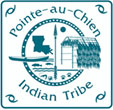Second Annual New Orleans Center for the Gulf South Indigenous Symposium
Qatar Ballroom, Tulane University, Uptown Campus April 2, 2019 8:30am – 5:30pm
-
Sovereignty and the State: Indigenous Challenges to Imperial Claims Qatar Ballroom on Tulane’s Uptown Campus April 2, 2019, 8:30am – 5:30pm
Sovereignty is the full right and power of a governing body over itself, without any interference from outside sources or bodies. The colonial history of the gulf south region is fraught with infractions to the sovereignty of Indigenous governance, land rights and physical bodies. Disputed territories, extraction of wealth and minerals from the earth and water, sugar and cotton antebellum plantation monopolies and rebellions throughout the circum-Caribbean and in the gulf south all characterize a region where the personal sovereignty of human bodies and the natural world were and are consistently at risk. Despite concerted harm to Indigenous bodies and minds, and decimation of the natural landscape and further isolation and dispersal of Native populations, gulf south Indigenous communities continue to persist, nurture, and fight for sovereignty.
The New Orleans Center for the Gulf South invites you to the 2nd Annual Indigenous Symposium on Tuesday, April 2 from 8:30am – 5:30pm in the Qatar Ballroom on Tulane’s Uptown Campus.
Like last year, featured speakers and panels will discuss methods of resistance that include a territorial acknowledgement, archaeology, foodways, a social activist roundtable, a cultural demonstration, and a presentation of new research from various scholars. Featured keynote speaker Dr. N. Bruce Duthu will present Tribal Sovereignty and Juridical Spaces: Tribal Lands as Domains of Self-Determination, Subsistence and the Sacred. Tribal representation will include: Atakapa-Ishak, Coushatta Tribe of Louisiana, Rosebud Sioux Tribe, United Houma Nation, Isle de Jean Charles Band, Biloxi-Chitimacha-Choctaw, Diné Nation and Pointe-au-Chien Indian Tribe. According to Executive Director of New Orleans Center for the Gulf South Rebecca Snedeker, “In our region, with global issues that soon all coastal peoples will face, we must establish models that help us see and accept where we are and support us in being creative and respectful in our solutions.” The symposium will address the following questions: How did Indigenous communities respond to, and resist, new methods of oppression during times of transition? How did they maintain cultural identity and survival amidst challenges to food sovereignty and access to land? How can we situate the struggles of the colonial period to the current context of a diminished coast, oil dependency, the rights to occupy ancestral lands? What are creative innovations for survival in the 21st century for gulf south communities and how do we all resist oppression and demand sovereignty in our land, our communities, and our bodies? Join us! This event is free and open to the public.
Program Committee:
- Rebecca Snedeker, Executive Director New Orleans Center for the Gulf South
- Laura D. Kelley, Ph.D., Adj. Professor & Director Dublin Study Abroad, Tulane University
- Denise Frazier, Ph.D., Assistant Director New Orleans Center for the Gulf South
- Jeffery Darensbourg, Ph.D., Atakapa-Ishak
- Patricia Ferguson-Bohnee, Director of the Indian Legal Clinic, Arizona State University
- Shane Lief, Ph.D. Candidate, Linguistics, Tulane University
- Chris Rodning, Ph.D., Anthropology Tulane University
- Monique Verdin, Independent Artist, United Houma Nation
-
Schedule Please note we are considering filming these sessions.
8:30 Registration:
Coffee and Tribal Display
8:45 Territorial Acknowledgement:
Rosina Philippe, Plaquemines Parish Grand Bayou Village Band-Atakapa Ishak
9:00 Opening Remarks:
Rebecca Snedeker, Co-Chair, New Orleans Center for the Gulf South, Tulane University
9:15 – 10:00 Archaeology:
Archaeological and Historical Perspectives on the Colonial Period Caddos of Northwest LouisianaJeffrey Girard, Northwestern State University
10:00 – 10:45 History:
Indigenous Challenges to Iberian Claims: 1st Nations in Spanish Colonial LouisianaLaura D. Kelley, Co-Chair, Tulane
10:45 – 11:00 Break
11:00 – 12:00 Plants and their Uses:
Sustenance and Succor: Feeding the People and Nourishing the SoulModerator: Laura D. Kelley, representing Margaret Maurer, Tulane
Panel:
Sunshine Best, Tulane
Gardner Rose, Coushatta Tribe of Louisiana
Anne White Hat, Rosebud Sioux12:00 – 12:45 Cultural Demonstration and Discussion:
Indigenous Basket Weavers of LouisianaModerator: Teresa Parker Farris, Tulane University
Panel:
Marjorie Battise, Coushatta Tribe of Louisiana
Sehoya Roussell, Coushatta Tribe of Louisiana
Myrna Wilson, Coushatta Tribe of Louisiana
Rebecca Knight, Coushatta Tribe of Louisiana
Ann Luster, United Houma Nation
Janie Luster, United Houma Nation12:45 – 1:45 Lunch: LBC, Tulane
Lunch provided for panelists
1:45 Afternoon Opening Remarks:
Laura D. Kelley, Co-Chair, Tulane University
2:00 – 2:45 Contemporary Issues:
Tribal Sovereignty and Juridical Spaces: Tribal Lands as Domains of Self-Determination, Subsistence and the Sacred.N. Bruce Duthu, Dartmouth College, United Houma Nation
2:45 – 3:00 Break
3:00 – 4:00 Roundtable:
Indigenous Voices: Sovereignty and the StateModerator: Joel Waltzer
Panel:
Cherri Foytlin, Diné Nation
Christine Verdin, Pointe-au-Chien Indian Tribe
Rosina Philippe, Plaquemines Parish Grand Bayou Village Band- Atakapa Ishak4:00 – 5:00 Ongoing Projects: Research and Engagement Opportunities
Looking Forward to Preserve the Past and to Nourish the PresentModerator: Maura Sullivan
Project and Presenter:
Indigenous Curriculum Project, Ann Kapustiak (Tulane) & Christine Verdin (Pointe-au-Chien Indian Tribe) Indigenous Community Engagement with Land Loss, Coastal Protection & Restoration Projects in Lower Terrebonne Parish, Dustin Reuther (Tulane/United Houma Nation)
The Songs of Forgotten Women, musical, Grace Patterson (Tulane)
Coastal Erosion and Cultural Resources,Dave J. Watt (Tulane/multiple communities)
Ecological Impacts on Coastal Communities, Dorothy Cheruiyot presenting for Margaret Maurer (Tulane/Pointe-au-Chien Indian Tribe/ Sea Grant)5:00 Closing Remarks:
Denise Frazier, New Orleans Center for the Gulf South, Tulane University Reception Immediately to Follow
-
Parking
Options for Visitors
- Visitors may purchase one-day and multi-day parking passes in the Customer Engagement office in the Lavin-Bernick Center from 8to 5Monday through Friday or online at parking.tulane.edu This option allows you to print your parking pass from anywhere.
- Visitors have the option to pay to park on the ground level or in one of the numbered spaces on the second floor of the Diboll Complex.
- Parking meters are located throughout campus in the marked spots on the campus map. Parking permits are not required when guests park in timed or metered spaces, provided the time limit is obeyed and the parking meter is not expired. Maximum time limits for parking meters are posted on each meter.
- Utilizing the ParkMobile app is also an option at metered spaces along with specially marked spaces in the Claiborne Avenue lot. Consult our parking map for more information.
- Reserved all hour spaces are clearly marked and should not be used by visitors without prior approval.
Failure to comply with parking rules may result in a citation. For additional parking information call 504-865-5441. Disabled Visitors Visitors are welcome to park in a Tulane handicap space when displaying their state issued disabled permit. A visitor may wish to us prior to their arrival on campus or as their first stop on campus to request assistance. Our customer engagement staff can assist you in finding the most accessible parking near your campus destination. Please note: Your state issued permit is not valid at a campus metered space as it would be in a municipal metered space. For more information, please visit the Campus Services website. Download the Campus Map PDF
-
Presenters & Symposium Organizers:
Organizers
-
Laura D. Kelley
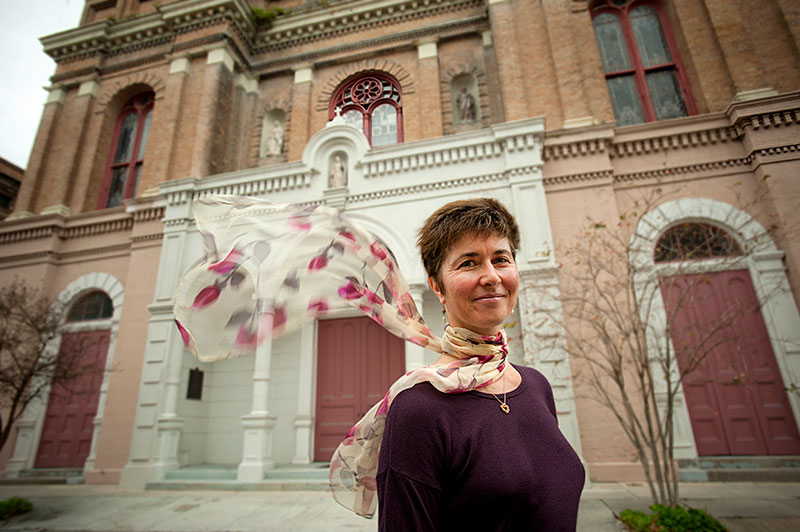 Laura D. Kelley, is an immigrant and ethnic historian at Tulane University and the Program Director of Tulane’s Summer in Dublin Program. She is also the section editor for the Louisiana Endowment for the Humanities KNOWLA Project and has published articles in Louisiana History as well as online collections. Her book, The Irish in New Orleans, released in October 2014, was the winner of the bronze medal in the Regional Non-Fiction category of the Independent Publisher Awards- IPPY- as well as a finalist for the INDIEFAB award. She is the recipient of numerous grants which have supported her research examining immigrant and ethnic communities in New Orleans as well as Indigenous communities in Southern Louisiana. Dr. Kelley has been researching the history of Native American Tribes of Southern Louisiana as well as working directly with them on a variety of projects for over a decade. Her thirteen-year collaboration with the Pointe-au-Chien Indian Tribe, a community partner of Tulane University, has resulted in numerous projects with topics ranging from coastal erosion to foodways. She is currently completing her second manuscript on the Irish, “The Greening of New Orleans” as well as “We the People: Native Americans, Europeans, Anglo-Americans, and the Complex History of Southern Louisiana from Colonial Times to the Present.” For more information please visit www.lauradkelley.com.
Laura D. Kelley, is an immigrant and ethnic historian at Tulane University and the Program Director of Tulane’s Summer in Dublin Program. She is also the section editor for the Louisiana Endowment for the Humanities KNOWLA Project and has published articles in Louisiana History as well as online collections. Her book, The Irish in New Orleans, released in October 2014, was the winner of the bronze medal in the Regional Non-Fiction category of the Independent Publisher Awards- IPPY- as well as a finalist for the INDIEFAB award. She is the recipient of numerous grants which have supported her research examining immigrant and ethnic communities in New Orleans as well as Indigenous communities in Southern Louisiana. Dr. Kelley has been researching the history of Native American Tribes of Southern Louisiana as well as working directly with them on a variety of projects for over a decade. Her thirteen-year collaboration with the Pointe-au-Chien Indian Tribe, a community partner of Tulane University, has resulted in numerous projects with topics ranging from coastal erosion to foodways. She is currently completing her second manuscript on the Irish, “The Greening of New Orleans” as well as “We the People: Native Americans, Europeans, Anglo-Americans, and the Complex History of Southern Louisiana from Colonial Times to the Present.” For more information please visit www.lauradkelley.com. -
Rebecca Snedeker
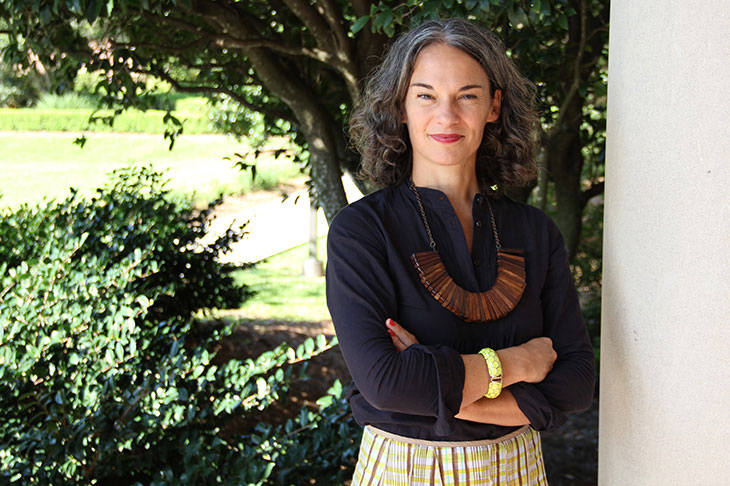 Rebecca Snedeker is the James H. Clark Executive Director of the New Orleans Center for the Gulf South at Tulane University. Prior to this position, she cultivated a body of narrative work that supports human rights, creative expression, and care for place in her native city, New Orleans. Works include Unfathomable City: A New Orleans Atlas (co-authored with Rebecca Solnit, University of California Press, 2013) and several feature documentary films, including Land of Opportunity (producer, ARTE, 2010), Witness: Katrina (producer, National Geographic Channel, 2010), and By Invitation Only (producer/director, PBS, 2007). Snedeker has served on the Steering Committee of New Day Films and the boards of the New Orleans Film Society and Patois: The New Orleans International Human Rights Film Festival. She graduated from Wesleyan University and is the recipient of an Emmy Award for “Historical Programming – Long Form” and grants from the National Endowment for the Arts and the National Endowment for the Humanities.
Rebecca Snedeker is the James H. Clark Executive Director of the New Orleans Center for the Gulf South at Tulane University. Prior to this position, she cultivated a body of narrative work that supports human rights, creative expression, and care for place in her native city, New Orleans. Works include Unfathomable City: A New Orleans Atlas (co-authored with Rebecca Solnit, University of California Press, 2013) and several feature documentary films, including Land of Opportunity (producer, ARTE, 2010), Witness: Katrina (producer, National Geographic Channel, 2010), and By Invitation Only (producer/director, PBS, 2007). Snedeker has served on the Steering Committee of New Day Films and the boards of the New Orleans Film Society and Patois: The New Orleans International Human Rights Film Festival. She graduated from Wesleyan University and is the recipient of an Emmy Award for “Historical Programming – Long Form” and grants from the National Endowment for the Arts and the National Endowment for the Humanities. -
Denise Frazier
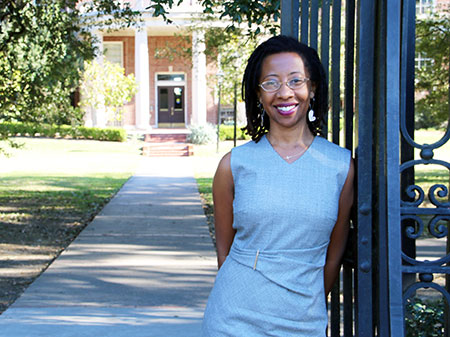 Denise Frazier: An interest in Cuban politics and African Diaspora culture within Latin America led her to New Orleans where she received an MA and PhD in Latin American Studies at Tulane University. Frazier’s graduate studies in Cuba and Brazil aligned with her interest in contemporary music, specifically hip hop, and public performance. Frazier frequently plays violin with performance organizations and musicians around the city. She has performed with several local New Orleans musicians and performances artists. Frazier has taught several university-level courses, including: Spanish, Latin American Studies, and African Diaspora-related courses on the university level at Tulane University, Xavier University, Wofford College, and Southern University of New Orleans. She has lectured and presented seminars and workshops on diversity, African Diaspora culture, contemporary music and performance all around the country. She has also worked with various advocacy groups and non-profit organizations in New Orleans, for instance a college access and completion program organization called: College Track and Make Music NOLA, a music and performance program for local New Orleans students. Frazier is currently the Assistant Director for the New Orleans Center for the Gulf South at Tulane University.
Denise Frazier: An interest in Cuban politics and African Diaspora culture within Latin America led her to New Orleans where she received an MA and PhD in Latin American Studies at Tulane University. Frazier’s graduate studies in Cuba and Brazil aligned with her interest in contemporary music, specifically hip hop, and public performance. Frazier frequently plays violin with performance organizations and musicians around the city. She has performed with several local New Orleans musicians and performances artists. Frazier has taught several university-level courses, including: Spanish, Latin American Studies, and African Diaspora-related courses on the university level at Tulane University, Xavier University, Wofford College, and Southern University of New Orleans. She has lectured and presented seminars and workshops on diversity, African Diaspora culture, contemporary music and performance all around the country. She has also worked with various advocacy groups and non-profit organizations in New Orleans, for instance a college access and completion program organization called: College Track and Make Music NOLA, a music and performance program for local New Orleans students. Frazier is currently the Assistant Director for the New Orleans Center for the Gulf South at Tulane University.
Presenters
-
Marjorie Battise
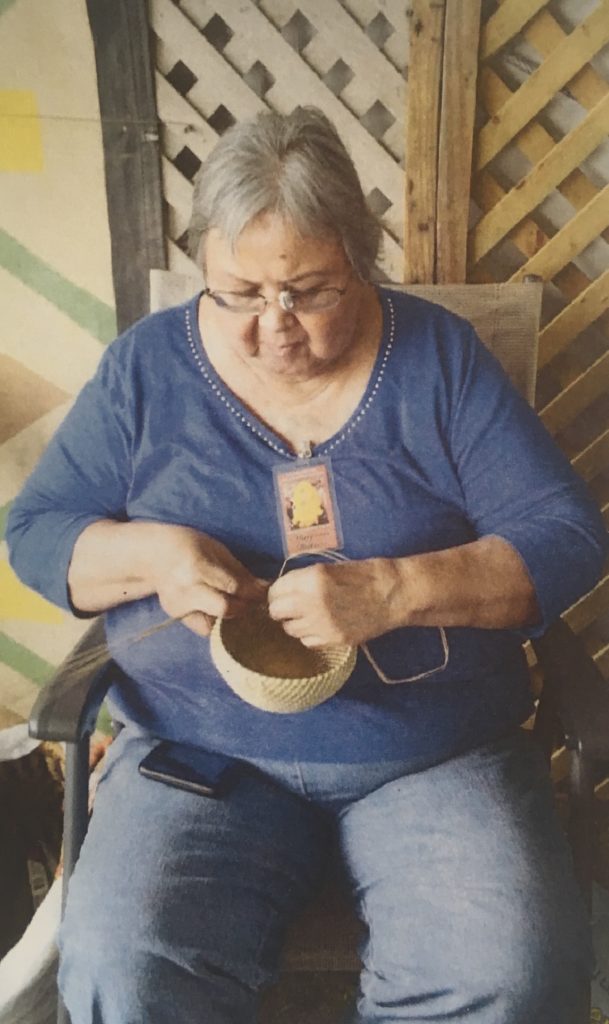 Marjorie Battise was born and raised in Elton, Louisiana among the Coushatta families. We spoke our Native tongue daily and still speak it today. Battise now resides in Kinder, Louisiana.Battise started making pine-needle baskets from the age of 8 or 9 years old. There were three girls in the household and her Mother taught each of them. Her Mother learned from her Mother and now, Battise has passed it on to her daughters and granddaughters. This is a hobby that she loves very much.
Marjorie Battise was born and raised in Elton, Louisiana among the Coushatta families. We spoke our Native tongue daily and still speak it today. Battise now resides in Kinder, Louisiana.Battise started making pine-needle baskets from the age of 8 or 9 years old. There were three girls in the household and her Mother taught each of them. Her Mother learned from her Mother and now, Battise has passed it on to her daughters and granddaughters. This is a hobby that she loves very much. -
Sunshine Best
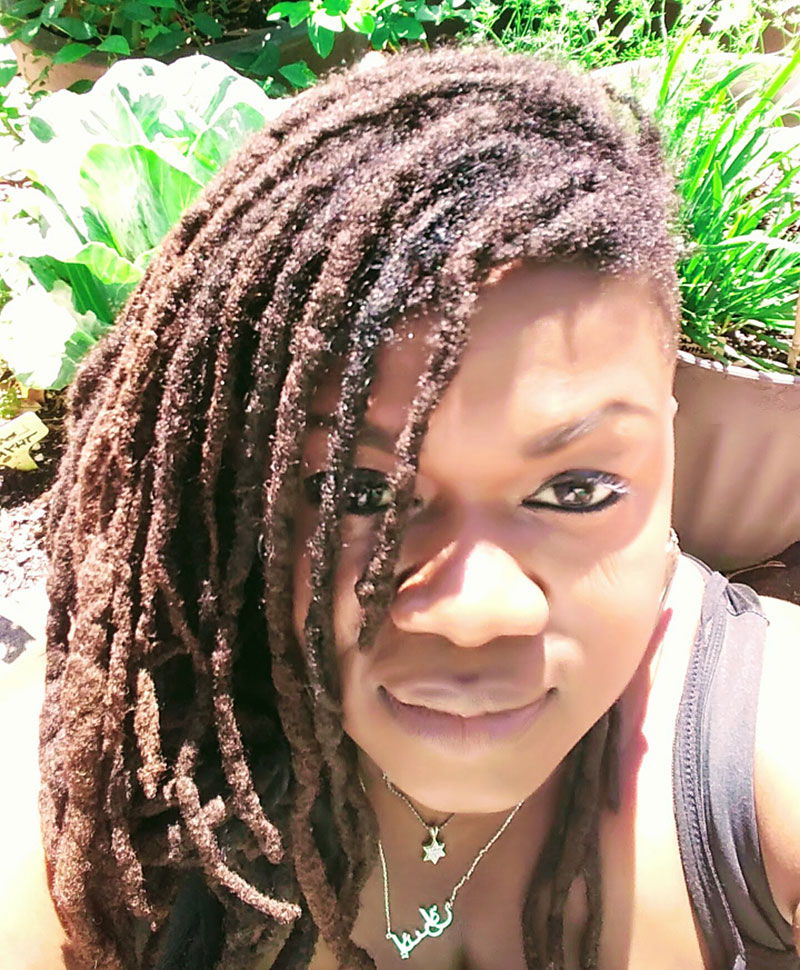 Sunshine Best, a Health & Wellness graduate student at Tulane University, who specializes in Medical Anthropology & Ethnobotany. As a Caribbean-Canadian, who has traveled globally to study ethnobotany throughout the African diaspora and colonized indigenous communities of, and around the Tropics, she can relate to the value of traditional plant knowledge and has witnessed its loss as generations pass. Sunshine is working to develop a contemporary mobile solution (an app she calls ‘AmnAya’) that preserves traditional plant knowledge through recording sustainable growing techniques, recipes, folk usages as well as to pair each with existing western scientific studies while existing to defeat biopiracy. This massive undertaking to create an online version of an ‘Ethnobotany-focused Wikipedia’ meets ‘Google for Gardeners’ is still in development. Sunshine seeks feedback from tradition-bearers and members of Indigenous communities, peoples of African-Diaspora and other tropical communities whose cultures have experienced traditional plant knowledge loss, and/or intersected with European colonization. The aim is to create a resource that protects, honors and serves the public health goal of preserving cultural plant usage and their stories for future generations.
Sunshine Best, a Health & Wellness graduate student at Tulane University, who specializes in Medical Anthropology & Ethnobotany. As a Caribbean-Canadian, who has traveled globally to study ethnobotany throughout the African diaspora and colonized indigenous communities of, and around the Tropics, she can relate to the value of traditional plant knowledge and has witnessed its loss as generations pass. Sunshine is working to develop a contemporary mobile solution (an app she calls ‘AmnAya’) that preserves traditional plant knowledge through recording sustainable growing techniques, recipes, folk usages as well as to pair each with existing western scientific studies while existing to defeat biopiracy. This massive undertaking to create an online version of an ‘Ethnobotany-focused Wikipedia’ meets ‘Google for Gardeners’ is still in development. Sunshine seeks feedback from tradition-bearers and members of Indigenous communities, peoples of African-Diaspora and other tropical communities whose cultures have experienced traditional plant knowledge loss, and/or intersected with European colonization. The aim is to create a resource that protects, honors and serves the public health goal of preserving cultural plant usage and their stories for future generations. -
N. Bruce Duthu
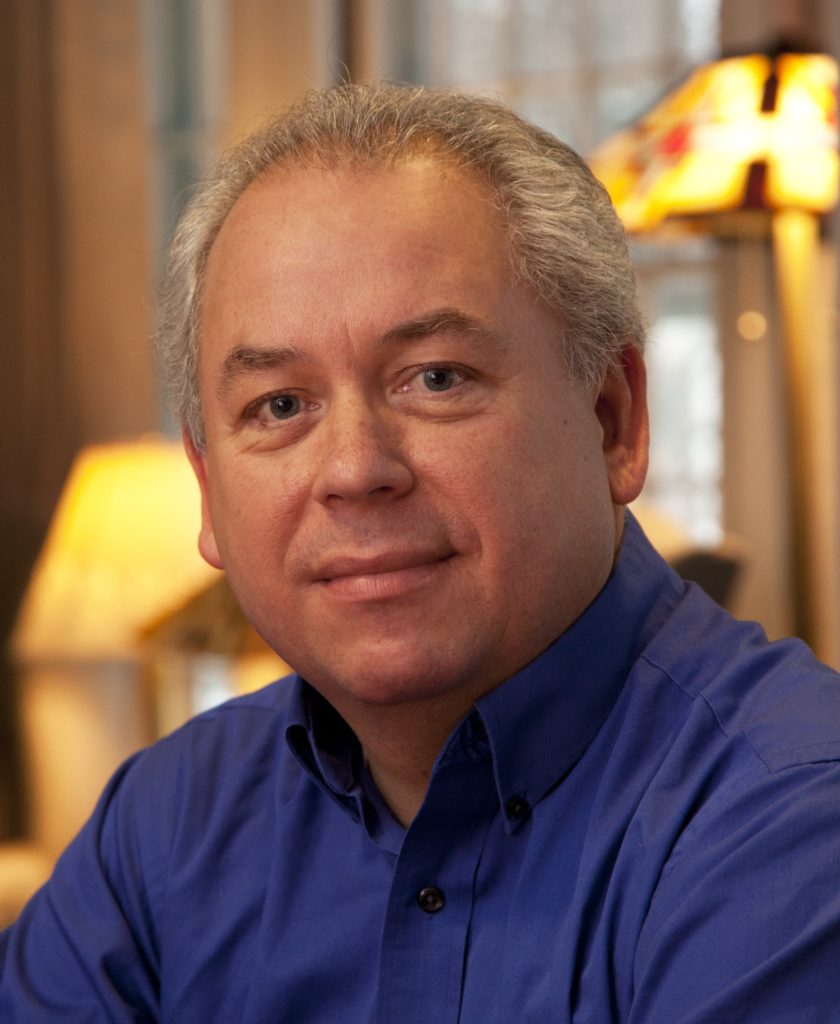 Professor N. Bruce Duthu is the Samson Occom Professor (and former Chair) of Native American Studies at Dartmouth College. An internationally recognized scholar of Native American law and policy, Professor Duthu joined the faculty of Arts & Sciences at Dartmouth in 2008. He earned his BA degree in religion and Native American Studies from Dartmouth College and his JD degree from Loyola University School of Law in New Orleans. Prior to joining the Dartmouth faculty, Duthu was Professor of Law at Vermont Law School where he also served as the law school’s Vice Dean for Academic Affairs and as inaugural director of the VLS-Sun Yat-sen University (Guangzhou, China) Partnership in Environmental Law. He served as visiting professor of law at Harvard Law School, the universities of Wollongong and Sydney in New South Wales, Australia, and the University of Trento in northern Italy. Professor Duthu is the author of SHADOW NATIONS: TRIBAL SOVEREIGNTY AND THE LIMITS OF LEGAL PLURALISM (Oxford University Press 2013) and AMERICAN INDIANS AND THE LAW (Viking/Penguin Press 2008) and was a contributing author of Felix S. Cohen’s HANDBOOK OF FEDERAL INDIAN LAW (2005), the leading treatise in the field of federal Indian law. He co-edited a special volume of South Atlantic Quarterly, “Sovereignty, Indigeneity and the Law,” that won the 2011 CELJ (Council of Editors of Learned Journals) award for Best Special Issue. He co-produced the documentary feature film, Dawnland (2018) that focuses on state removal of Indian children from their families. He has lectured on indigenous rights in various parts of the world, including Russia, China, Bolivia, Italy, France, Australia, New Zealand and Canada. Professor Duthu is an enrolled tribal member of the United Houma Nation of Louisiana. He and his wife, Hilde Ojibway, have 3 children and 3 grandchildren.
Professor N. Bruce Duthu is the Samson Occom Professor (and former Chair) of Native American Studies at Dartmouth College. An internationally recognized scholar of Native American law and policy, Professor Duthu joined the faculty of Arts & Sciences at Dartmouth in 2008. He earned his BA degree in religion and Native American Studies from Dartmouth College and his JD degree from Loyola University School of Law in New Orleans. Prior to joining the Dartmouth faculty, Duthu was Professor of Law at Vermont Law School where he also served as the law school’s Vice Dean for Academic Affairs and as inaugural director of the VLS-Sun Yat-sen University (Guangzhou, China) Partnership in Environmental Law. He served as visiting professor of law at Harvard Law School, the universities of Wollongong and Sydney in New South Wales, Australia, and the University of Trento in northern Italy. Professor Duthu is the author of SHADOW NATIONS: TRIBAL SOVEREIGNTY AND THE LIMITS OF LEGAL PLURALISM (Oxford University Press 2013) and AMERICAN INDIANS AND THE LAW (Viking/Penguin Press 2008) and was a contributing author of Felix S. Cohen’s HANDBOOK OF FEDERAL INDIAN LAW (2005), the leading treatise in the field of federal Indian law. He co-edited a special volume of South Atlantic Quarterly, “Sovereignty, Indigeneity and the Law,” that won the 2011 CELJ (Council of Editors of Learned Journals) award for Best Special Issue. He co-produced the documentary feature film, Dawnland (2018) that focuses on state removal of Indian children from their families. He has lectured on indigenous rights in various parts of the world, including Russia, China, Bolivia, Italy, France, Australia, New Zealand and Canada. Professor Duthu is an enrolled tribal member of the United Houma Nation of Louisiana. He and his wife, Hilde Ojibway, have 3 children and 3 grandchildren. -
Cherri Foytlin
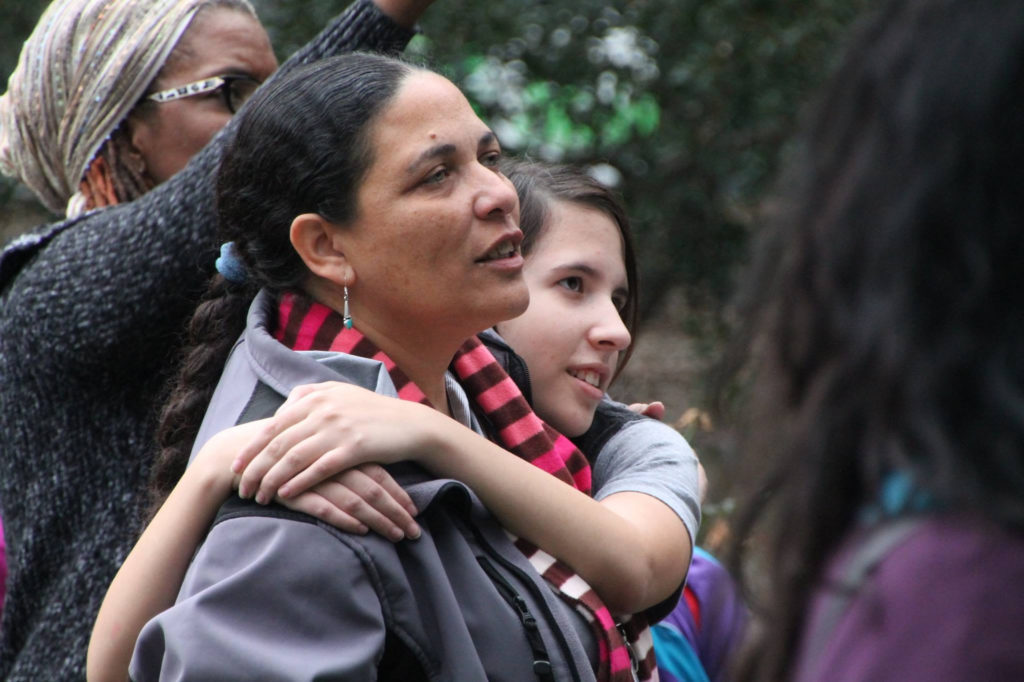 Cherri Foytlin is an indigenous organizer, writer, speaker, and mother of six who lives in southwest Louisiana. She is the author of “Spill It! The Truth About the Deep Water Horizon Oil Rig Explosion,” as well as a regular contributor to Bridgethegulfproject.org and other digital platforms. In the Spring of 2011 she walked to Washington D.C. from New Orleans (1, 243 miles), to educate and call for action regarding the BP Deepwater Drilling Disaster. More recently, as a founder of L’eau Est La Vie (Water is Life) Camp she has helped to lead an inspiring direct action campaign to stop the Bayou Bridge Pipeline. She is also the executive director of Louisiana Rise, an organization dedicated to a just transition for local Louisiana communities, and an active advisory member for Another Gulf is Possible and The National Poor People’s Campaign.
Cherri Foytlin is an indigenous organizer, writer, speaker, and mother of six who lives in southwest Louisiana. She is the author of “Spill It! The Truth About the Deep Water Horizon Oil Rig Explosion,” as well as a regular contributor to Bridgethegulfproject.org and other digital platforms. In the Spring of 2011 she walked to Washington D.C. from New Orleans (1, 243 miles), to educate and call for action regarding the BP Deepwater Drilling Disaster. More recently, as a founder of L’eau Est La Vie (Water is Life) Camp she has helped to lead an inspiring direct action campaign to stop the Bayou Bridge Pipeline. She is also the executive director of Louisiana Rise, an organization dedicated to a just transition for local Louisiana communities, and an active advisory member for Another Gulf is Possible and The National Poor People’s Campaign. -
Jeffrey Girard
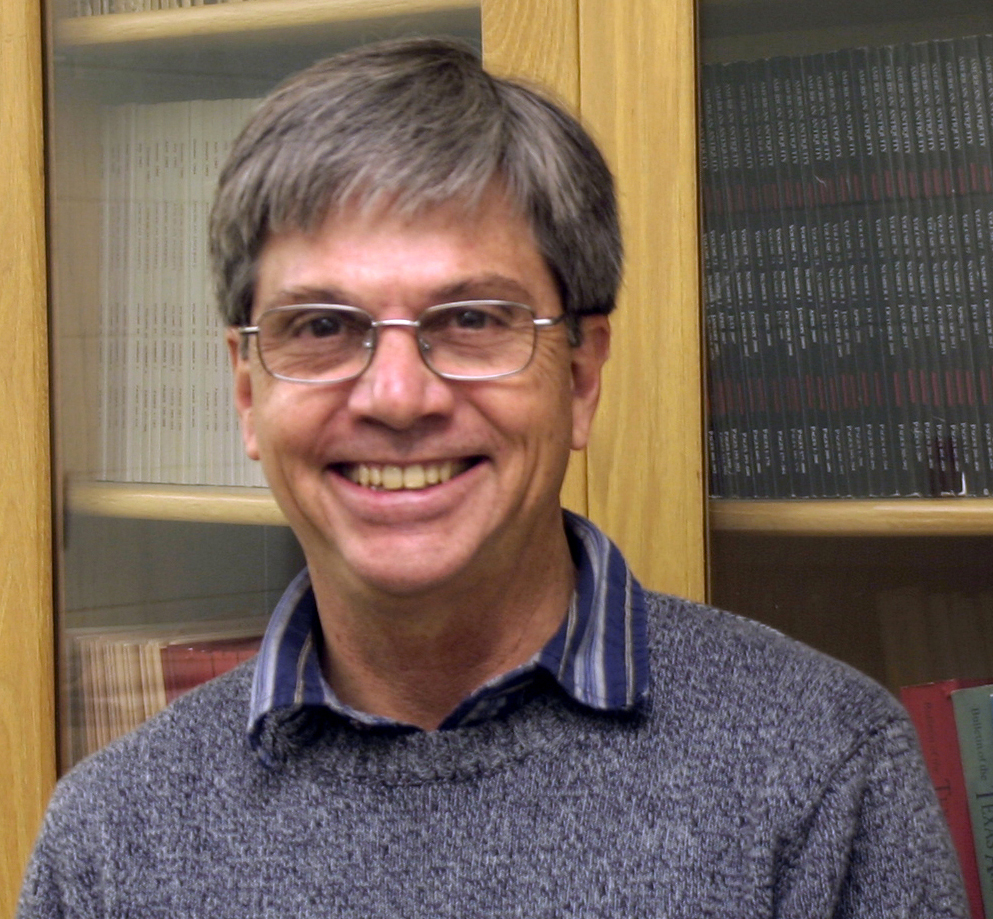 Jeffrey Girard (M.A. The University of Texas at Austin) was on the faculty at Northwestern State University of Louisiana and served as regional archaeologist for the Louisiana Division of Archaeology for more than 25 years. He worked with landowners in the identification and preservation of cultural resources on private and state land, carried out research projects, and promoted awareness of cultural resources through public presentations. He has published papers in several edited books and journals, and co-authored the book Caddo Connections, Cultural Interactions within and beyond the Caddo World, 2014, Rowman & Littlefield. His book, The Caddos and Their Ancestors, Archaeology and the Native People of Northwest Louisiana, was published by LSU Press in the spring of 2018. He currently is working on a grant from the Cane River National Heritage Area to organize collections and records at the Williamson Museum, Northwestern State University.
Jeffrey Girard (M.A. The University of Texas at Austin) was on the faculty at Northwestern State University of Louisiana and served as regional archaeologist for the Louisiana Division of Archaeology for more than 25 years. He worked with landowners in the identification and preservation of cultural resources on private and state land, carried out research projects, and promoted awareness of cultural resources through public presentations. He has published papers in several edited books and journals, and co-authored the book Caddo Connections, Cultural Interactions within and beyond the Caddo World, 2014, Rowman & Littlefield. His book, The Caddos and Their Ancestors, Archaeology and the Native People of Northwest Louisiana, was published by LSU Press in the spring of 2018. He currently is working on a grant from the Cane River National Heritage Area to organize collections and records at the Williamson Museum, Northwestern State University. -
Ann Kapustiak
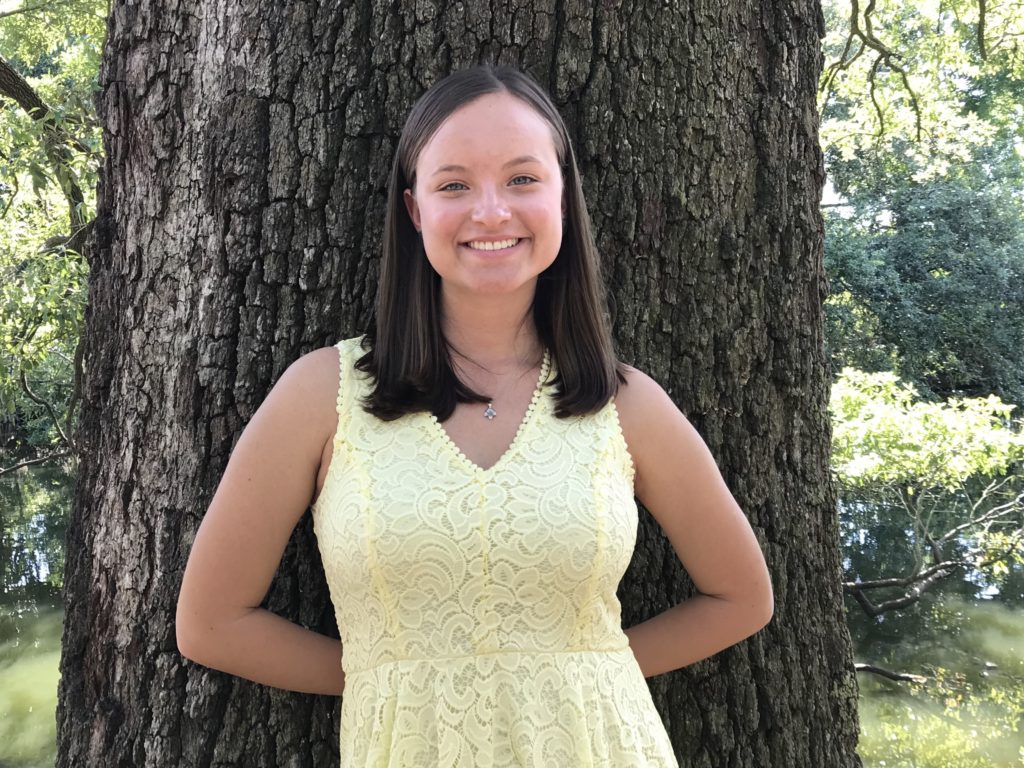 Ann Kapustiak is a member of Tulane’s Class of 2021. She is from Park Ridge, Illinois–just northwest of Chicago. She is on the Pre-Law track and earning dual degrees in Political Science and Psychology. As a freshman student, she took Dr. Kelley’s course TIDES: Indian Tribes on the Bayou. As a sophomore, she was nominated and then chosen to be a Peer Mentor for Dr. Kelley. In this capacity, she served as a guide and mentor to students in this class as well as an assistant to Dr. Kelley. Through her experiences with TIDES and Dr. Kelley, Ann has worked with the Pointe-au-Chien Indian Tribe and contributed to the service learning curriculum projects that are distributed annually at Native American Heritage Day in Vermilionville, Louisiana. She hopes to continue to bring awareness of the Pointe-au-Chien’s cause and narrative in the Tulane community and communities abroad.
Ann Kapustiak is a member of Tulane’s Class of 2021. She is from Park Ridge, Illinois–just northwest of Chicago. She is on the Pre-Law track and earning dual degrees in Political Science and Psychology. As a freshman student, she took Dr. Kelley’s course TIDES: Indian Tribes on the Bayou. As a sophomore, she was nominated and then chosen to be a Peer Mentor for Dr. Kelley. In this capacity, she served as a guide and mentor to students in this class as well as an assistant to Dr. Kelley. Through her experiences with TIDES and Dr. Kelley, Ann has worked with the Pointe-au-Chien Indian Tribe and contributed to the service learning curriculum projects that are distributed annually at Native American Heritage Day in Vermilionville, Louisiana. She hopes to continue to bring awareness of the Pointe-au-Chien’s cause and narrative in the Tulane community and communities abroad. -
Rebecca Knight
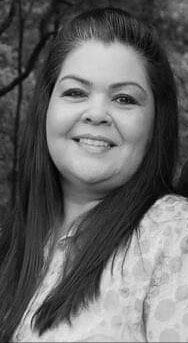 Rebecca is the daughter of Coushatta tribal member Myrna Abbey Wilson and the late Wilfred Wilson. Rebecca learned the craft of the traditional Koasati long leaf pine straw basket weaving as young as 5 years old. This art of basketry has been passed down from generation to generation from the women of the family from her mother, Myrna, grandmother, and so on. It is taught at a young age to develop these skills. This art form will also be passed on to future generations to come.
Rebecca is the daughter of Coushatta tribal member Myrna Abbey Wilson and the late Wilfred Wilson. Rebecca learned the craft of the traditional Koasati long leaf pine straw basket weaving as young as 5 years old. This art of basketry has been passed down from generation to generation from the women of the family from her mother, Myrna, grandmother, and so on. It is taught at a young age to develop these skills. This art form will also be passed on to future generations to come. -
Ann Luster
bio coming -
Janie Luster
bio coming -
Margaret Maurer
 Margaret Maurer is a graduating senior at Tulane University, where her studies in Ecology and Evolutionary Biology have been transformed by collaboration since 2015 with the Pointe-au-Chien Indian Tribe of Louisiana. Informed by community engagement and research experience as an assistant to the Tribe’s application for federal recognition, Maurer explores the Tribe’s ethnobotany and its links to the Tribe’s critically threatened land areas in the eroding marshes of the Gulf Coast. She is driven by interdisciplinary and socially responsible approaches to science that mobilize information and support accessible communication to benefit both community and environment.
Margaret Maurer is a graduating senior at Tulane University, where her studies in Ecology and Evolutionary Biology have been transformed by collaboration since 2015 with the Pointe-au-Chien Indian Tribe of Louisiana. Informed by community engagement and research experience as an assistant to the Tribe’s application for federal recognition, Maurer explores the Tribe’s ethnobotany and its links to the Tribe’s critically threatened land areas in the eroding marshes of the Gulf Coast. She is driven by interdisciplinary and socially responsible approaches to science that mobilize information and support accessible communication to benefit both community and environment. -
Teresa Parker Farris
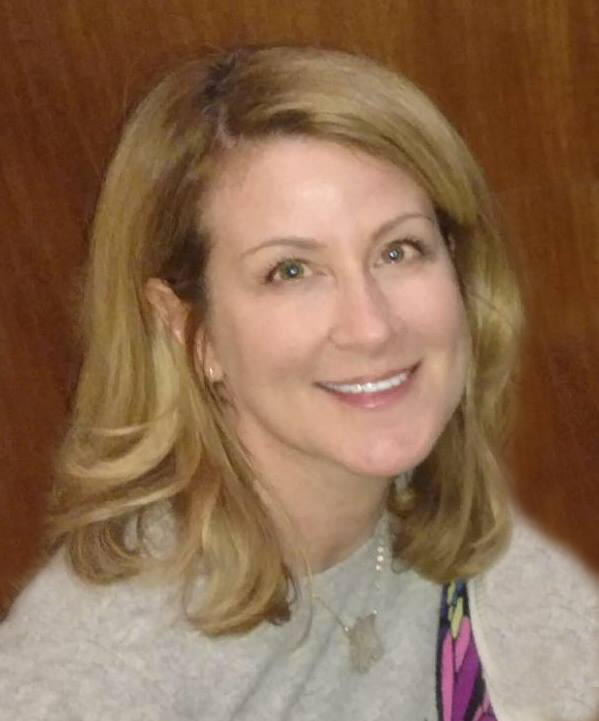 Teresa Parker Farris is an interdisciplinary scholar at Tulane University where her research focuses on the history and art history of the American South. The former Deputy Director of the Newcomb Art Museum, she writes regularly about the South’s visual arts, both folk and fine, as well as its vernacular culture. She has twenty years of experience presenting Louisiana’s living traditions at events such as the New Orleans Jazz & Heritage Festival and Louisiana Folklife Festival. Since 2010, Teresa has chaired the Louisiana Folklife Commission, a governor-appointed advisory body.
Teresa Parker Farris is an interdisciplinary scholar at Tulane University where her research focuses on the history and art history of the American South. The former Deputy Director of the Newcomb Art Museum, she writes regularly about the South’s visual arts, both folk and fine, as well as its vernacular culture. She has twenty years of experience presenting Louisiana’s living traditions at events such as the New Orleans Jazz & Heritage Festival and Louisiana Folklife Festival. Since 2010, Teresa has chaired the Louisiana Folklife Commission, a governor-appointed advisory body. -
Grace Patterson
 Grace Patterson is a first year student at Tulane University. She is from Nashville, Tennessee and is currently working on a double major in Theatre Performance and Communications as well as a double minor in Spanish and Liberal Arts Business Management. Last fall, she took Dr. Laura Kelley’s course Indian Tribes on the Bayou. Over the semester, she and her project partner, Laura Moreno, transcribed and translated many letters dating from Louisiana’s Spanish Colonial period, 1762-1800. Due to her musical theatre background coupled with the letter project, Patterson was inspired to write a musical for her final service learning project. The two researched the history of Colonial Louisiana with an emphasis on women from the Pointe-au-Chien Indian Tribe. With this information, Patterson wrote a musical based on the stories relayed in the colonial letters entitled, “The Songs of Forgotten Women”. She hopes that this musical will inspire others to explore further those histories and stories that are often ignored or under threat of being forgotten.
Grace Patterson is a first year student at Tulane University. She is from Nashville, Tennessee and is currently working on a double major in Theatre Performance and Communications as well as a double minor in Spanish and Liberal Arts Business Management. Last fall, she took Dr. Laura Kelley’s course Indian Tribes on the Bayou. Over the semester, she and her project partner, Laura Moreno, transcribed and translated many letters dating from Louisiana’s Spanish Colonial period, 1762-1800. Due to her musical theatre background coupled with the letter project, Patterson was inspired to write a musical for her final service learning project. The two researched the history of Colonial Louisiana with an emphasis on women from the Pointe-au-Chien Indian Tribe. With this information, Patterson wrote a musical based on the stories relayed in the colonial letters entitled, “The Songs of Forgotten Women”. She hopes that this musical will inspire others to explore further those histories and stories that are often ignored or under threat of being forgotten. -
Rosina Philippe
bio coming soon -
Dustin Reuther
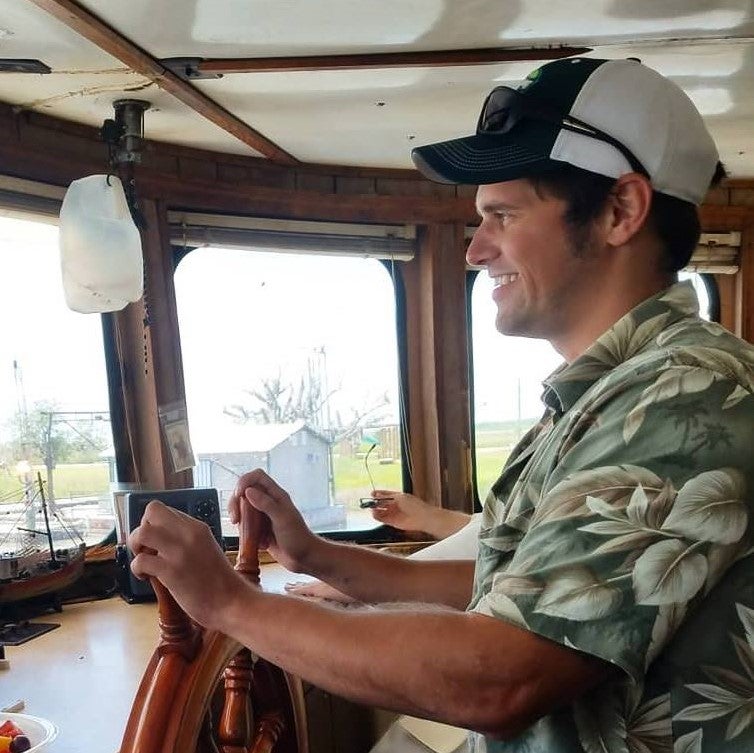 Dustin Reuther is a doctoral student at Tulane University in the Anthropology department. Currently he studies indigenous community engagement with land loss and coastal protection as well as restoration projects in lower Terrebonne Parish, Louisiana. He is particularly interested in the state of intangible cultural heritage of the communities of Louisiana’s coast, how this heritage has been affected by unparalleled land loss, how systems of governmentality engage with cultural resources during monumental state and federal projects, and how this engagement intersects with environmental equity for coastal populations. In the past in the Brazilian Amazon he has conducted investigations relating to the ethnobotany of archaeological sites (“geoglyphs”), indigenous revitalization movements, and the syncretic Santo Daime religion. He has taught several Anthropology courses at Tulane and is employed in the Cultural Resource Management field as an archaeologist on varied projects across the United States.
Dustin Reuther is a doctoral student at Tulane University in the Anthropology department. Currently he studies indigenous community engagement with land loss and coastal protection as well as restoration projects in lower Terrebonne Parish, Louisiana. He is particularly interested in the state of intangible cultural heritage of the communities of Louisiana’s coast, how this heritage has been affected by unparalleled land loss, how systems of governmentality engage with cultural resources during monumental state and federal projects, and how this engagement intersects with environmental equity for coastal populations. In the past in the Brazilian Amazon he has conducted investigations relating to the ethnobotany of archaeological sites (“geoglyphs”), indigenous revitalization movements, and the syncretic Santo Daime religion. He has taught several Anthropology courses at Tulane and is employed in the Cultural Resource Management field as an archaeologist on varied projects across the United States. -
Gardner Rose
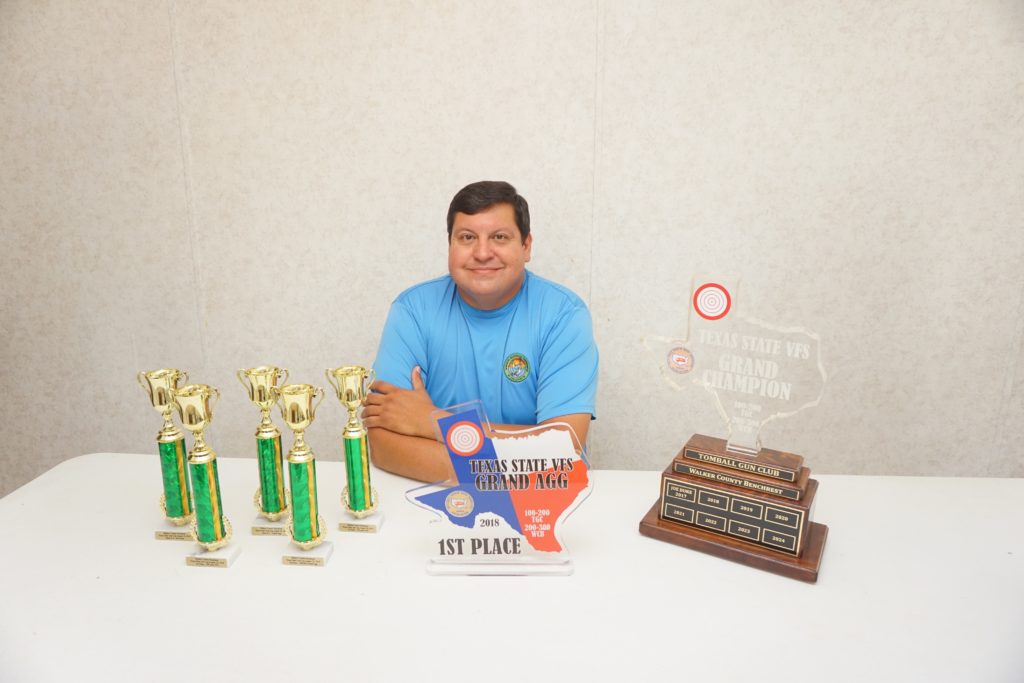 A member of the Coushatta Tribe of Louisiana, Gardner Rose is the Director of Natural Resources for his Tribe. He has been working for the Tribe since 1995 and has so thoroughly enjoyed his time doing so that he plans to retire there. He received a 2-year Associates Degree in Business Management at Louisiana State University in Eunice and a Bachelor’s Degree in Science at McNeese State University. When not working for the Tribe Gardner spends his time outdoors hunting, primarily White-Tailed deer, and while he will also fish, hunting is his favorite activity. He has participated in shooting rifle competitions around the state as well as national events around the country. However, the true joy and blessing in his life is being a single parent of his 2-year-old daughter, Taylor Grace Rose.
A member of the Coushatta Tribe of Louisiana, Gardner Rose is the Director of Natural Resources for his Tribe. He has been working for the Tribe since 1995 and has so thoroughly enjoyed his time doing so that he plans to retire there. He received a 2-year Associates Degree in Business Management at Louisiana State University in Eunice and a Bachelor’s Degree in Science at McNeese State University. When not working for the Tribe Gardner spends his time outdoors hunting, primarily White-Tailed deer, and while he will also fish, hunting is his favorite activity. He has participated in shooting rifle competitions around the state as well as national events around the country. However, the true joy and blessing in his life is being a single parent of his 2-year-old daughter, Taylor Grace Rose. -
Sehoya Roussell
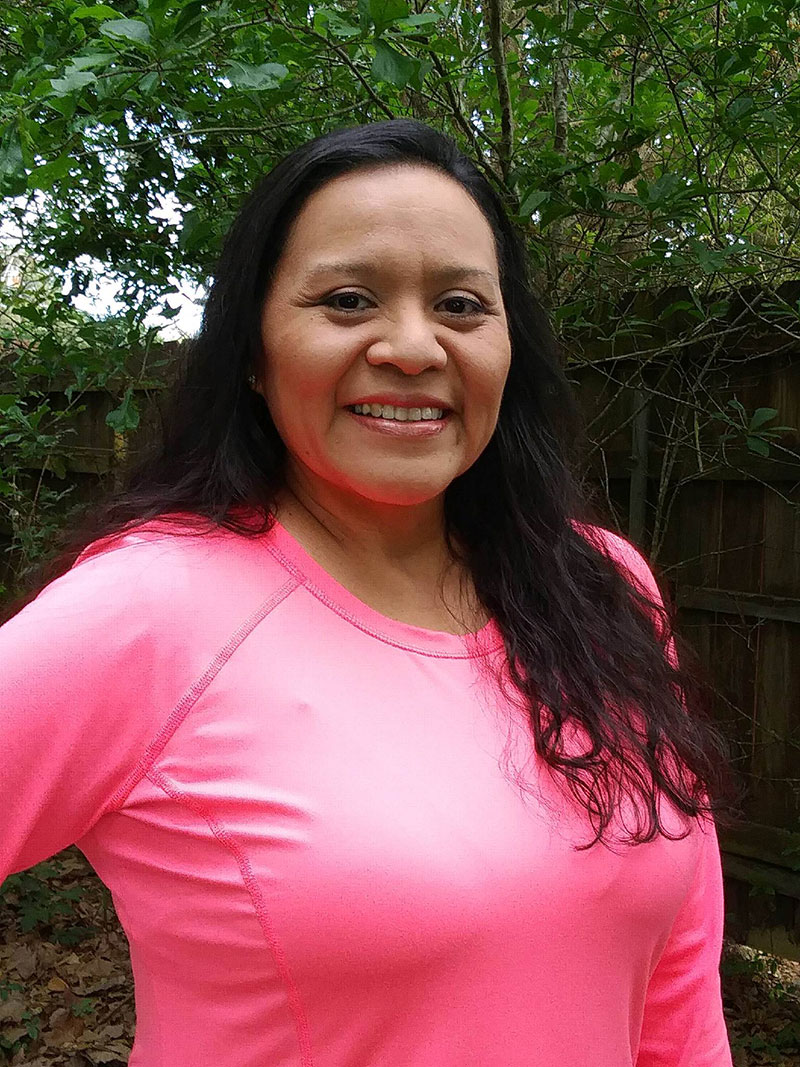 Sehoya Roussell was raised in Elton, Louisiana and now resides in Iowa, Louisiana. I am a Tribal member of The Coushatta Tribe of Louisiana. I speak my native language, called Koasati. The Koasati language is handed down. I was taught to speak Koasati since birth by my mother, grandmother and grandfather. I now have two children. I am teaching and speaking the Koasati language to them, so they may also keep the language alive.My mother, Marjorie Battise and grandmother Nora Abbey taught me how to sew pineneedle baskets at the age of seven. Now I am also passing the handcrafted tradition to my children, with the guidance of their grandmother, Marjorie Battise.
Sehoya Roussell was raised in Elton, Louisiana and now resides in Iowa, Louisiana. I am a Tribal member of The Coushatta Tribe of Louisiana. I speak my native language, called Koasati. The Koasati language is handed down. I was taught to speak Koasati since birth by my mother, grandmother and grandfather. I now have two children. I am teaching and speaking the Koasati language to them, so they may also keep the language alive.My mother, Marjorie Battise and grandmother Nora Abbey taught me how to sew pineneedle baskets at the age of seven. Now I am also passing the handcrafted tradition to my children, with the guidance of their grandmother, Marjorie Battise.I enjoy learning the craft of sewing pineneedle baskets.
-
Maura Sullivan
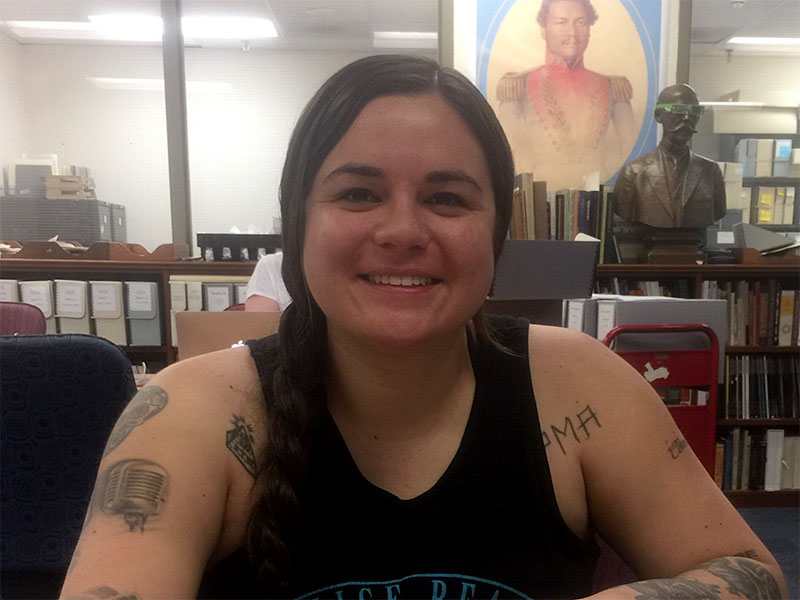 Maura Sullivan is from the Coastal Band of the Chumash Nation. She is currently a PhD student in Linguistics at Tulane University. She is a 2018 Mellon Fellow in Community Engaged Scholarship focusing especially on her own community and the creation of books and capturing oral history narratives of tribal members. She has experience working with tribal archives at the Smithsonian.
Maura Sullivan is from the Coastal Band of the Chumash Nation. She is currently a PhD student in Linguistics at Tulane University. She is a 2018 Mellon Fellow in Community Engaged Scholarship focusing especially on her own community and the creation of books and capturing oral history narratives of tribal members. She has experience working with tribal archives at the Smithsonian. -
Christine Verdin
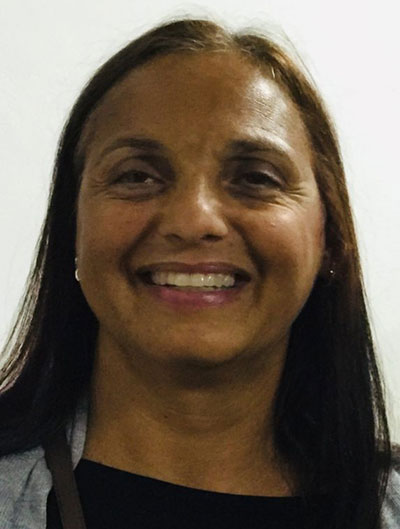 Christine Verdin is a member of the Pointe-au-Chien Indian Tribe (PACIT) located in south of Terrebonne and Lafourche Parishes. She is also the proud mother of two; one daughter lives in Germany and is preparing to start graduate school while the other daughter lives in Houston with her husband and daughter. Her Tribe consist of approximately 700 members most of whom live in Pointe-au-Chien. They are a state recognized Tribe and are currently working on their petition for federal recognition. She is a member of their Council and also participates on various committees for the Tribe. In addition to her tribal activities Verdin is also an Instructional Coach at Montegut Elementary School which is a neighboring community of Pointe-au-Chien.
Christine Verdin is a member of the Pointe-au-Chien Indian Tribe (PACIT) located in south of Terrebonne and Lafourche Parishes. She is also the proud mother of two; one daughter lives in Germany and is preparing to start graduate school while the other daughter lives in Houston with her husband and daughter. Her Tribe consist of approximately 700 members most of whom live in Pointe-au-Chien. They are a state recognized Tribe and are currently working on their petition for federal recognition. She is a member of their Council and also participates on various committees for the Tribe. In addition to her tribal activities Verdin is also an Instructional Coach at Montegut Elementary School which is a neighboring community of Pointe-au-Chien. -
Joel Waltzer
 Joel Waltzer is a partner in the firm Waltzer Wiygul & Garsid and has focused his practice for the past twenty years on litigating cases for those who have sought justice, but in many instances, could not represent themselves or find a lawyer that would take their case to heart.Joel’s goal as an attorney has always been to identify outside-of-the-box solutions for coastal loss and pollution problems to seek out ways to protect the environment from further harm made by entities that use the land, but do not keep it the way they found it. He hopes that through his efforts, Louisiana will learn and adopt policies that others have put in place in other states, but have not yet adopted here.As the partner of a firm founded to represent cases of social significance, as well as litigate for threatened communities and cultures, Joel is a large proponent of the value of framing issues presented in a case to sometimes change public opinion. He knows that his clients have gotten a great deal of value out of hiring the firm and takes pride in the awards received for his clients. He takes pride in smart lawyering and ensures that he puts his Ivy League law degree to work for each case.
Joel Waltzer is a partner in the firm Waltzer Wiygul & Garsid and has focused his practice for the past twenty years on litigating cases for those who have sought justice, but in many instances, could not represent themselves or find a lawyer that would take their case to heart.Joel’s goal as an attorney has always been to identify outside-of-the-box solutions for coastal loss and pollution problems to seek out ways to protect the environment from further harm made by entities that use the land, but do not keep it the way they found it. He hopes that through his efforts, Louisiana will learn and adopt policies that others have put in place in other states, but have not yet adopted here.As the partner of a firm founded to represent cases of social significance, as well as litigate for threatened communities and cultures, Joel is a large proponent of the value of framing issues presented in a case to sometimes change public opinion. He knows that his clients have gotten a great deal of value out of hiring the firm and takes pride in the awards received for his clients. He takes pride in smart lawyering and ensures that he puts his Ivy League law degree to work for each case. -
Dave J. Watt
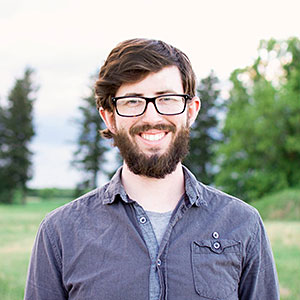 David J. Watt received his M.A. in 2016 from Tulane University in New Orleans, LA, where he is currently a Ph.D. student. His research interests include social and environmental histories of cultural landscapes. His dissertation focuses on crisis, social memory, and community responses to colonialism among Native American communities in the southeastern U.S. He currently is working for the National Center for Preservation Technology and Training (NCPTT) developing a GIS database coastal response plan for at-risk deltaic historic sites for the Mississippi River Delta Archaeological Mitigation project (MRDAM).
David J. Watt received his M.A. in 2016 from Tulane University in New Orleans, LA, where he is currently a Ph.D. student. His research interests include social and environmental histories of cultural landscapes. His dissertation focuses on crisis, social memory, and community responses to colonialism among Native American communities in the southeastern U.S. He currently is working for the National Center for Preservation Technology and Training (NCPTT) developing a GIS database coastal response plan for at-risk deltaic historic sites for the Mississippi River Delta Archaeological Mitigation project (MRDAM). -
Anne White Hat
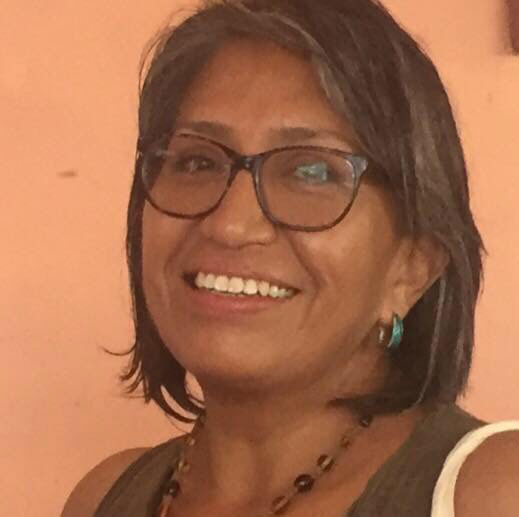 Anne White Hat an herbalist and proud member of the Aske Gluwipi Tiospaye (clan) of the Sicangu Lakota. The Sicangu Lakota are one of the Oceti Sakowin, the Seven Council Fires of the Lakota Oyate (the Lakota Nation). Miss Anne is a direct descendant of Chief Iron Shell. Her grandfather was Chief Hollow Horn Bear. Her traditional homelands encompass the Black Hills, Badlands and prairies of the upper mid-west known as South Dakota.Miss Anne is the proud mother of three amazing children who are but a handful who had the blessing to live at the base of the sacred mountain, Mato Paha, Bear Butte.
Anne White Hat an herbalist and proud member of the Aske Gluwipi Tiospaye (clan) of the Sicangu Lakota. The Sicangu Lakota are one of the Oceti Sakowin, the Seven Council Fires of the Lakota Oyate (the Lakota Nation). Miss Anne is a direct descendant of Chief Iron Shell. Her grandfather was Chief Hollow Horn Bear. Her traditional homelands encompass the Black Hills, Badlands and prairies of the upper mid-west known as South Dakota.Miss Anne is the proud mother of three amazing children who are but a handful who had the blessing to live at the base of the sacred mountain, Mato Paha, Bear Butte.She is community organizer and member of the Indigenous Women’s Advisory Council of the L’eau Est La Vie Camp, and Board member of the Native American Community Board of the Native American Women’s Health Education and Resource Center. Miss Anne is an entrepreneur who’s venture, White Hat Botanicals, features what she loving calls her “community-determined” botanicals and CBD remedies.
She is a grant-writer by trade, community organizer out of love for her people, jack-of-all trades by hustle and blessed to work with plants for you.
-
Myrna Wilson
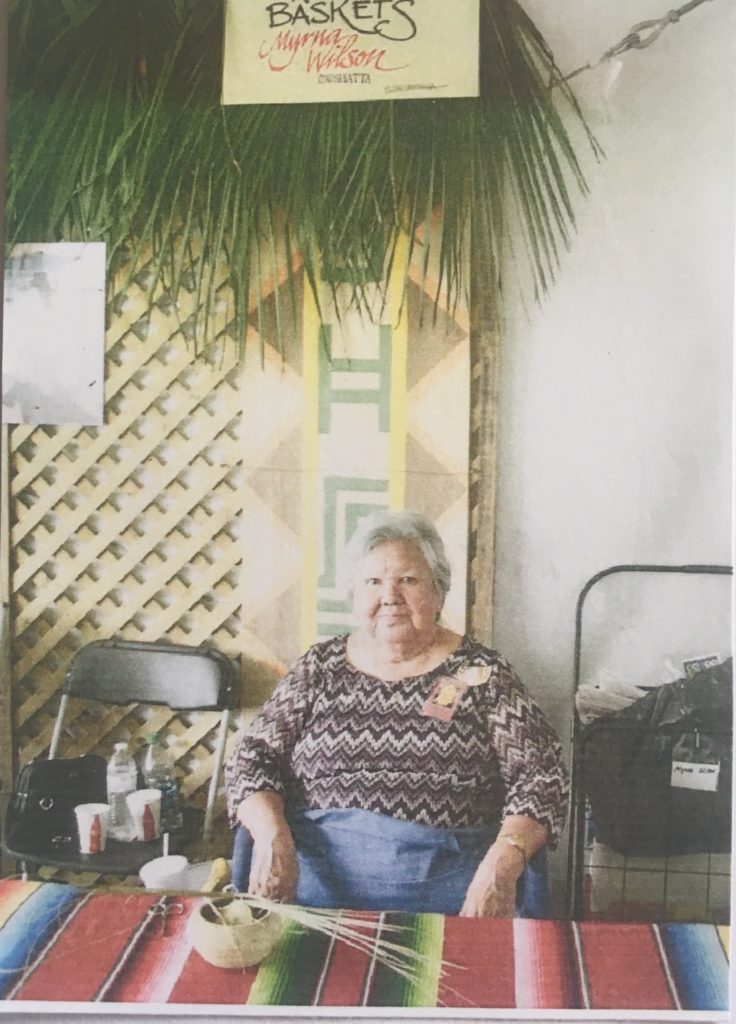 Mryna Wilson, a Tribal member of the Coushatta Tribe has mastered the traditional art of pine straw basket weaving using only long-leaf pine straw, raffia, and a sewing needle. Wilson learned and was taught the art of basket weaving at the young age of three from two generations of women in her family where she has passed down this knowledge to her own daughter.
Mryna Wilson, a Tribal member of the Coushatta Tribe has mastered the traditional art of pine straw basket weaving using only long-leaf pine straw, raffia, and a sewing needle. Wilson learned and was taught the art of basket weaving at the young age of three from two generations of women in her family where she has passed down this knowledge to her own daughter.
Program Committee
-
Jeffery U. Darensbourg
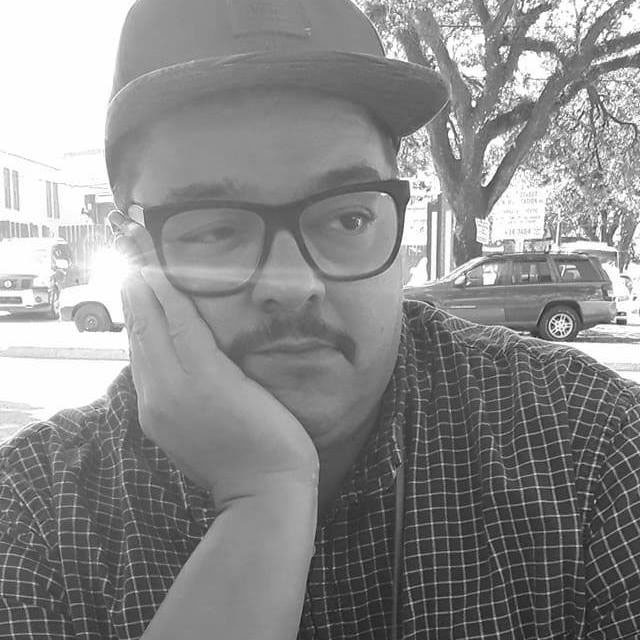
Jeffery Darensbourg is a tribal councilperson of the Atakapa-Ishak Nation and a Monroe Research Fellow of the New Orleans Center for the Gulf South. He is editor-who-is-not-a-chief of the zine Bulbancha Is Still a Place: Indigenous Culture from New Orleans. Darensbourg lives in Bulbancha (New Orleans), grew up in Baton Rouge, and earned his Ph.D. from the University of Louisiana at Lafayette. -
Patrica Ferguson-Bohnee
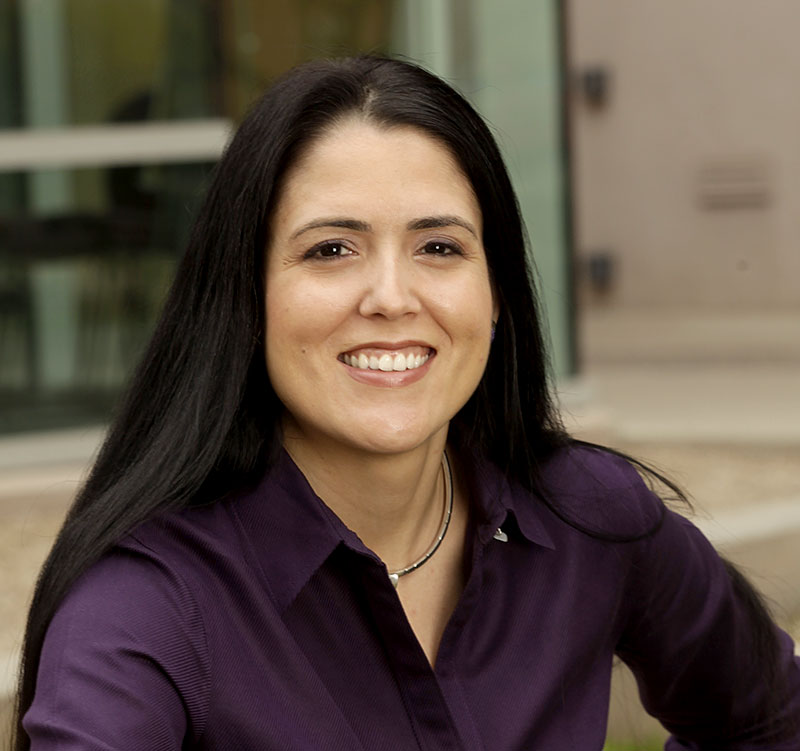 Professor Ferguson-Bohnee is the Director of the Indian Legal Clinic, Faculty Director of the Indian Legal Program, and Clinical Professor of Law, at the Sandra Day O’Connor College of Law at Arizona State University. She is a co-founder of the Native American Bar Association of Arizona and is the Past President of the National Native American Bar Association. Professor Ferguson-Bohnee has substantial experience in Indian law, election law, voting rights, and status clarification for tribes. She has been highly involved in the federal recognition process and religious freedom for non-recognized tribal members. She also advocates for the rights of unrecognized tribes in response to environmental disasters. Professor Ferguson-Bohnee received her Bachelors degree with Honors in Native American Studies with an Emphasis in Policy and Law from Stanford University and her Juris Doctorate from Columbia University School of Law with a certificate in Foreign and Comparative Law. She has spent several semesters studying in France, including at the Stanford Program in Paris located at the L’École Supérieure de Commerce de Paris, as a law student at Université de Paris II (Assas), and as a Fulbright Scholar at Université de Paris VII (Jussieu) where her research focused on French colonial relations with Louisiana Indians during the seventeenth and eighteenth centuries. She has also taught American Trial Skills and American Indian Law in the Common Law Program at the Université de Paris V (Descartes). Professor Ferguson-Bohnee is a member of the Pointe-au-Chien Indian Tribe.
Professor Ferguson-Bohnee is the Director of the Indian Legal Clinic, Faculty Director of the Indian Legal Program, and Clinical Professor of Law, at the Sandra Day O’Connor College of Law at Arizona State University. She is a co-founder of the Native American Bar Association of Arizona and is the Past President of the National Native American Bar Association. Professor Ferguson-Bohnee has substantial experience in Indian law, election law, voting rights, and status clarification for tribes. She has been highly involved in the federal recognition process and religious freedom for non-recognized tribal members. She also advocates for the rights of unrecognized tribes in response to environmental disasters. Professor Ferguson-Bohnee received her Bachelors degree with Honors in Native American Studies with an Emphasis in Policy and Law from Stanford University and her Juris Doctorate from Columbia University School of Law with a certificate in Foreign and Comparative Law. She has spent several semesters studying in France, including at the Stanford Program in Paris located at the L’École Supérieure de Commerce de Paris, as a law student at Université de Paris II (Assas), and as a Fulbright Scholar at Université de Paris VII (Jussieu) where her research focused on French colonial relations with Louisiana Indians during the seventeenth and eighteenth centuries. She has also taught American Trial Skills and American Indian Law in the Common Law Program at the Université de Paris V (Descartes). Professor Ferguson-Bohnee is a member of the Pointe-au-Chien Indian Tribe. -
Denise Frazier
 Denise Frazier: An interest in Cuban politics and African Diaspora culture within Latin America led her to New Orleans where she received an MA and PhD in Latin American Studies at Tulane University. Frazier’s graduate studies in Cuba and Brazil aligned with her interest in contemporary music, specifically hip hop, and public performance. Frazier frequently plays violin with performance organizations and musicians around the city. She has performed with several local New Orleans musicians and performances artists. Frazier has taught several university-level courses, including: Spanish, Latin American Studies, and African Diaspora-related courses on the university level at Tulane University, Xavier University, Wofford College, and Southern University of New Orleans. She has lectured and presented seminars and workshops on diversity, African Diaspora culture, contemporary music and performance all around the country. She has also worked with various advocacy groups and non-profit organizations in New Orleans, for instance a college access and completion program organization called: College Track and Make Music NOLA, a music and performance program for local New Orleans students. Frazier is currently the Assistant Director for the New Orleans Center for the Gulf South at Tulane University.
Denise Frazier: An interest in Cuban politics and African Diaspora culture within Latin America led her to New Orleans where she received an MA and PhD in Latin American Studies at Tulane University. Frazier’s graduate studies in Cuba and Brazil aligned with her interest in contemporary music, specifically hip hop, and public performance. Frazier frequently plays violin with performance organizations and musicians around the city. She has performed with several local New Orleans musicians and performances artists. Frazier has taught several university-level courses, including: Spanish, Latin American Studies, and African Diaspora-related courses on the university level at Tulane University, Xavier University, Wofford College, and Southern University of New Orleans. She has lectured and presented seminars and workshops on diversity, African Diaspora culture, contemporary music and performance all around the country. She has also worked with various advocacy groups and non-profit organizations in New Orleans, for instance a college access and completion program organization called: College Track and Make Music NOLA, a music and performance program for local New Orleans students. Frazier is currently the Assistant Director for the New Orleans Center for the Gulf South at Tulane University. -
Laura D. Kelley
 Laura D. Kelley, is an immigrant and ethnic historian at Tulane University and the Program Director of Tulane’s Summer in Dublin Program. She is also the section editor for the Louisiana Endowment for the Humanities KNOWLA Project and has published articles in Louisiana History as well as online collections. Her book, The Irish in New Orleans, released in October 2014, was the winner of the bronze medal in the Regional Non-Fiction category of the Independent Publisher Awards- IPPY- as well as a finalist for the INDIEFAB award. She is the recipient of numerous grants which have supported her research examining immigrant and ethnic communities in New Orleans as well as Indigenous communities in Southern Louisiana. Dr. Kelley has been researching the history of Native American Tribes of Southern Louisiana as well as working directly with them on a variety of projects for over a decade. Her thirteen-year collaboration with the Pointe-au-Chien Indian Tribe, a community partner of Tulane University, has resulted in numerous projects with topics ranging from coastal erosion to foodways. She is currently completing her second manuscript on the Irish, “The Greening of New Orleans” as well as “We the People: Native Americans, Europeans, Anglo-Americans, and the Complex History of Southern Louisiana from Colonial Times to the Present.” For more information please visit www.lauradkelley.com.
Laura D. Kelley, is an immigrant and ethnic historian at Tulane University and the Program Director of Tulane’s Summer in Dublin Program. She is also the section editor for the Louisiana Endowment for the Humanities KNOWLA Project and has published articles in Louisiana History as well as online collections. Her book, The Irish in New Orleans, released in October 2014, was the winner of the bronze medal in the Regional Non-Fiction category of the Independent Publisher Awards- IPPY- as well as a finalist for the INDIEFAB award. She is the recipient of numerous grants which have supported her research examining immigrant and ethnic communities in New Orleans as well as Indigenous communities in Southern Louisiana. Dr. Kelley has been researching the history of Native American Tribes of Southern Louisiana as well as working directly with them on a variety of projects for over a decade. Her thirteen-year collaboration with the Pointe-au-Chien Indian Tribe, a community partner of Tulane University, has resulted in numerous projects with topics ranging from coastal erosion to foodways. She is currently completing her second manuscript on the Irish, “The Greening of New Orleans” as well as “We the People: Native Americans, Europeans, Anglo-Americans, and the Complex History of Southern Louisiana from Colonial Times to the Present.” For more information please visit www.lauradkelley.com. -
Shane Lief
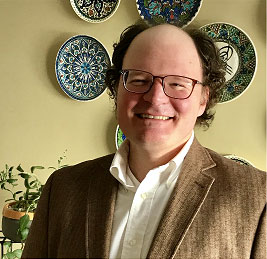 Shane Lief was born and raised in New Orleans. He has played music since childhood, leading percussion bands during Mardi Gras for the past two decades. He has MA degrees in Linguistics and Musicology (focusing on the history of Congo Square in New Orleans), and is currently completing a PhD in the Interdisciplinary Program in Linguistics at Tulane University.
Shane Lief was born and raised in New Orleans. He has played music since childhood, leading percussion bands during Mardi Gras for the past two decades. He has MA degrees in Linguistics and Musicology (focusing on the history of Congo Square in New Orleans), and is currently completing a PhD in the Interdisciplinary Program in Linguistics at Tulane University. -
Chris Rodning
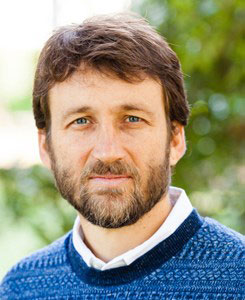 Chris Rodning is the Paul and Debra Gibbons Professor in the Department of Anthropology at Tulane University. He received an A.B. magna cum laude in anthropology from Harvard University in 1994, and a Ph.D. in anthropology from the University of North Carolina at Chapel Hill in 2004. He has published books and papers about the archaeology of the southern Appalachians and the Gulf South on topics such as the architecture and built environment of Native American towns, earthen mounds as monuments and persistent places within dynamic cultural landscapes, gender and status differentiation in Native American communities, and responses by native peoples of the Southeast to European contact and colonialism. His courses at Tulane include “Introduction to Archaeology,” “Ancient Societies,” “North American Prehistory,” “Southeast U.S. Prehistory,” “Archaeology of Cultural Landscapes,” “Disasters and Past Societies,” “Conquest and Colonialism,” and “Archaeology of Gender.”
Chris Rodning is the Paul and Debra Gibbons Professor in the Department of Anthropology at Tulane University. He received an A.B. magna cum laude in anthropology from Harvard University in 1994, and a Ph.D. in anthropology from the University of North Carolina at Chapel Hill in 2004. He has published books and papers about the archaeology of the southern Appalachians and the Gulf South on topics such as the architecture and built environment of Native American towns, earthen mounds as monuments and persistent places within dynamic cultural landscapes, gender and status differentiation in Native American communities, and responses by native peoples of the Southeast to European contact and colonialism. His courses at Tulane include “Introduction to Archaeology,” “Ancient Societies,” “North American Prehistory,” “Southeast U.S. Prehistory,” “Archaeology of Cultural Landscapes,” “Disasters and Past Societies,” “Conquest and Colonialism,” and “Archaeology of Gender.” -
Rebecca Snedeker
 Rebecca Snedeker is the James H. Clark Executive Director of the New Orleans Center for the Gulf South at Tulane University. Prior to this position, she cultivated a body of narrative work that supports human rights, creative expression, and care for place in her native city, New Orleans. Works include Unfathomable City: A New Orleans Atlas (co-authored with Rebecca Solnit, University of California Press, 2013) and several feature documentary films, including Land of Opportunity (producer, ARTE, 2010), Witness: Katrina (producer, National Geographic Channel, 2010), and By Invitation Only (producer/director, PBS, 2007). Snedeker has served on the Steering Committee of New Day Films and the boards of the New Orleans Film Society and Patois: The New Orleans International Human Rights Film Festival. She graduated from Wesleyan University and is the recipient of an Emmy Award for “Historical Programming – Long Form” and grants from the National Endowment for the Arts and the National Endowment for the Humanities.
Rebecca Snedeker is the James H. Clark Executive Director of the New Orleans Center for the Gulf South at Tulane University. Prior to this position, she cultivated a body of narrative work that supports human rights, creative expression, and care for place in her native city, New Orleans. Works include Unfathomable City: A New Orleans Atlas (co-authored with Rebecca Solnit, University of California Press, 2013) and several feature documentary films, including Land of Opportunity (producer, ARTE, 2010), Witness: Katrina (producer, National Geographic Channel, 2010), and By Invitation Only (producer/director, PBS, 2007). Snedeker has served on the Steering Committee of New Day Films and the boards of the New Orleans Film Society and Patois: The New Orleans International Human Rights Film Festival. She graduated from Wesleyan University and is the recipient of an Emmy Award for “Historical Programming – Long Form” and grants from the National Endowment for the Arts and the National Endowment for the Humanities. -
Monique Verdin
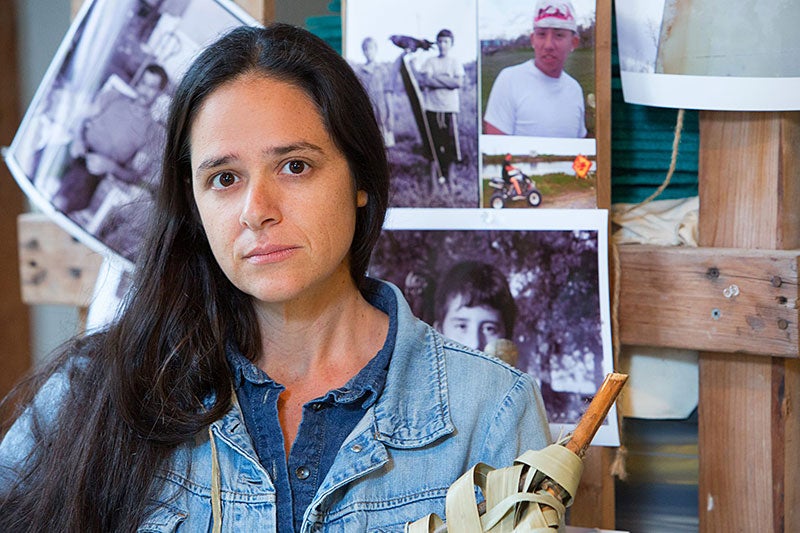 Monique Verdin is the subject/co-writer/co-producer of the award-winning documentary My Louisiana Love (2012). Her interdisciplinary work has been included in an assortment of environmentally inspired projects, including the multiplatform/performance/eco-experience Cry You One (2012-2017) as well as the publication Unfathomable City: A New Orleans Atlas (2013). Monique is a member of the United Houma Nation Tribal Council and is director of The Land Memory Bank & Seed Exchange; an experiential project engaged in building a community record through cultural happenings, strategic installations and as a digital archive to share stories, native seeds and local knowledge. Currently, Monique is a part of the Another Gulf Is Possible Collaborative core leadership circle of brown (indigenous, latinx and desi) women from Texas to Florida working to envision just and sustainable economies and vibrant communities. Her work was featured in Prospect.4 at the Historic New Orleans Collection.
Monique Verdin is the subject/co-writer/co-producer of the award-winning documentary My Louisiana Love (2012). Her interdisciplinary work has been included in an assortment of environmentally inspired projects, including the multiplatform/performance/eco-experience Cry You One (2012-2017) as well as the publication Unfathomable City: A New Orleans Atlas (2013). Monique is a member of the United Houma Nation Tribal Council and is director of The Land Memory Bank & Seed Exchange; an experiential project engaged in building a community record through cultural happenings, strategic installations and as a digital archive to share stories, native seeds and local knowledge. Currently, Monique is a part of the Another Gulf Is Possible Collaborative core leadership circle of brown (indigenous, latinx and desi) women from Texas to Florida working to envision just and sustainable economies and vibrant communities. Her work was featured in Prospect.4 at the Historic New Orleans Collection.
-
-
Contact
New Orleans Center for the Gulf South Tulane University Newcomb Hall Room 112 1229 Broadway St. New Orleans, LA 70119 504-314-2889 New Orleans Center for the Gulf South
-
Social Media:
Facebook: Nola Gulf South Facebook: Music Rising at Tulane Twitter: @NOCGS Instagram: Nola Gulf South Tumblr: New Orleans Center for the Gulf South
Image Credit: Detail of “Land Memory Bank: Sovereignty, Uncertainty & Seeding Sustainability – An Art Installation” by Monique Verdin, 2018
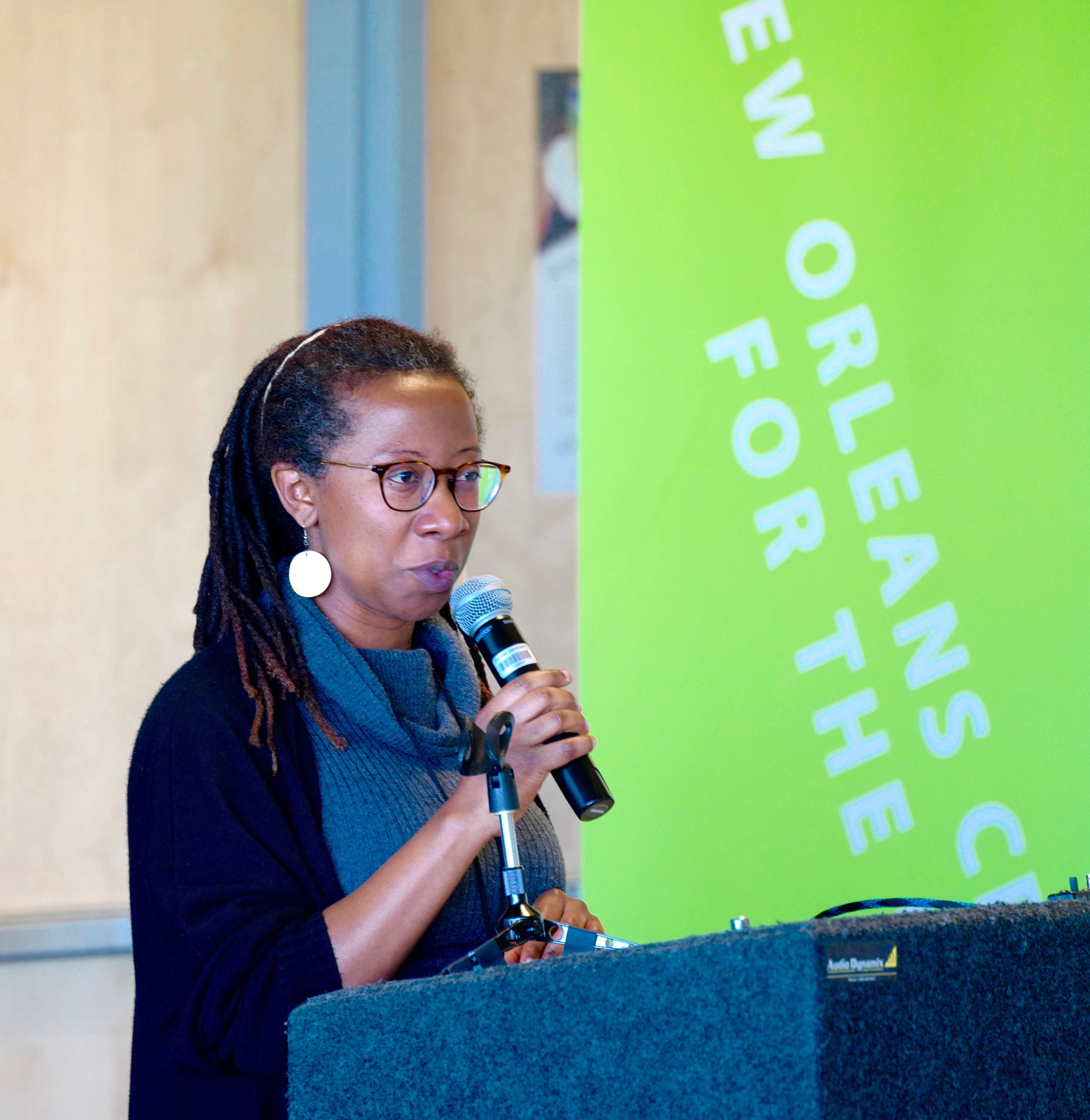
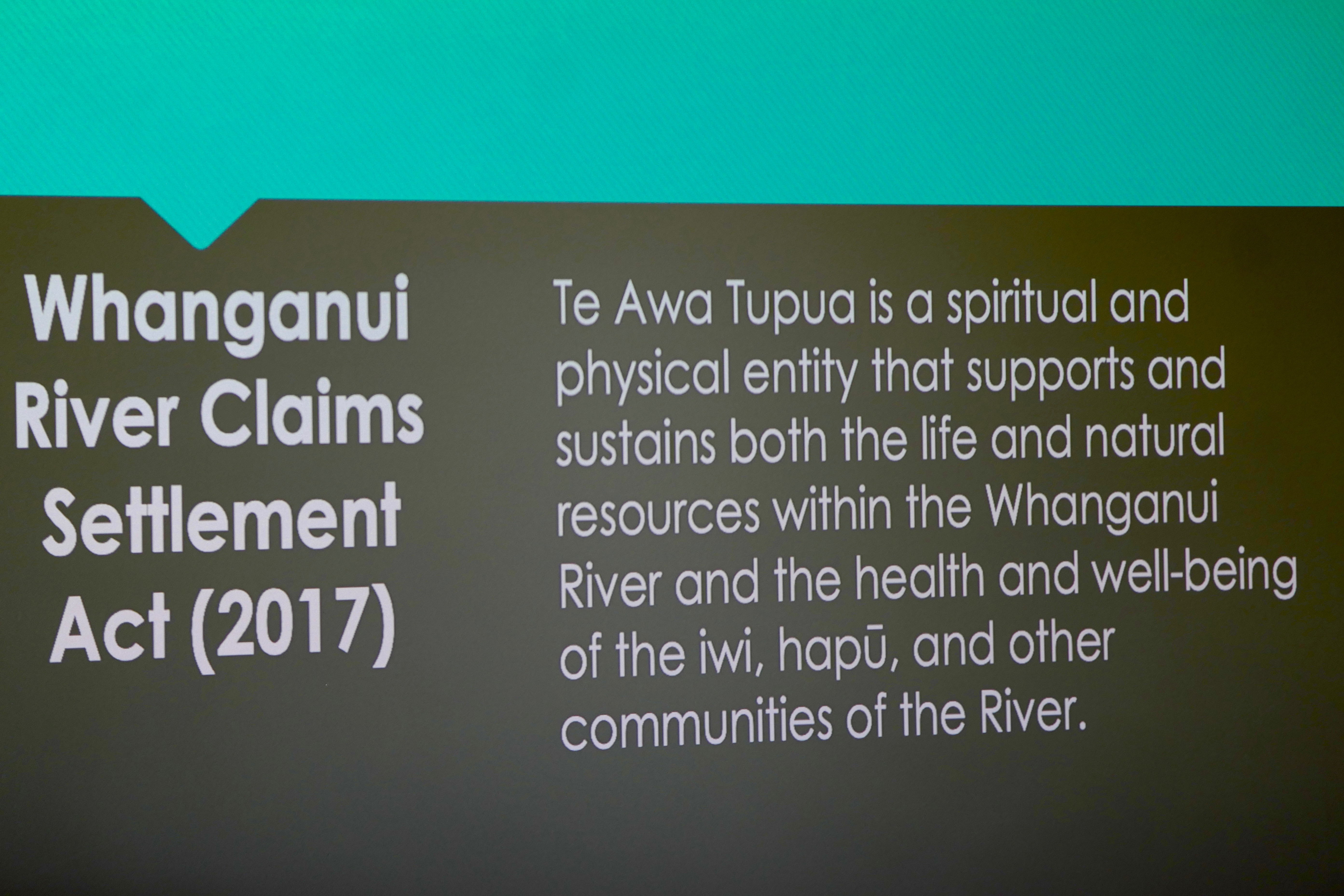
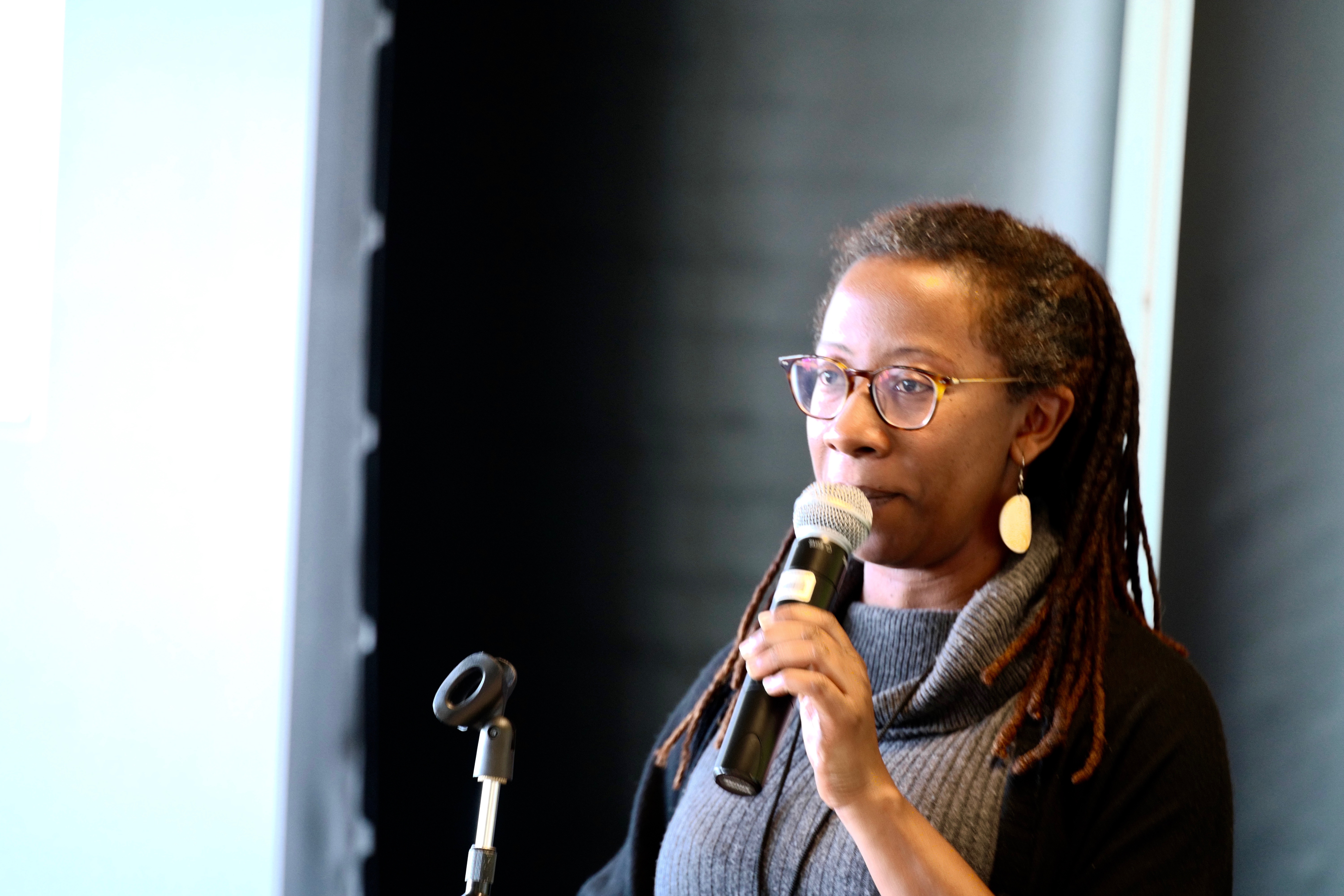
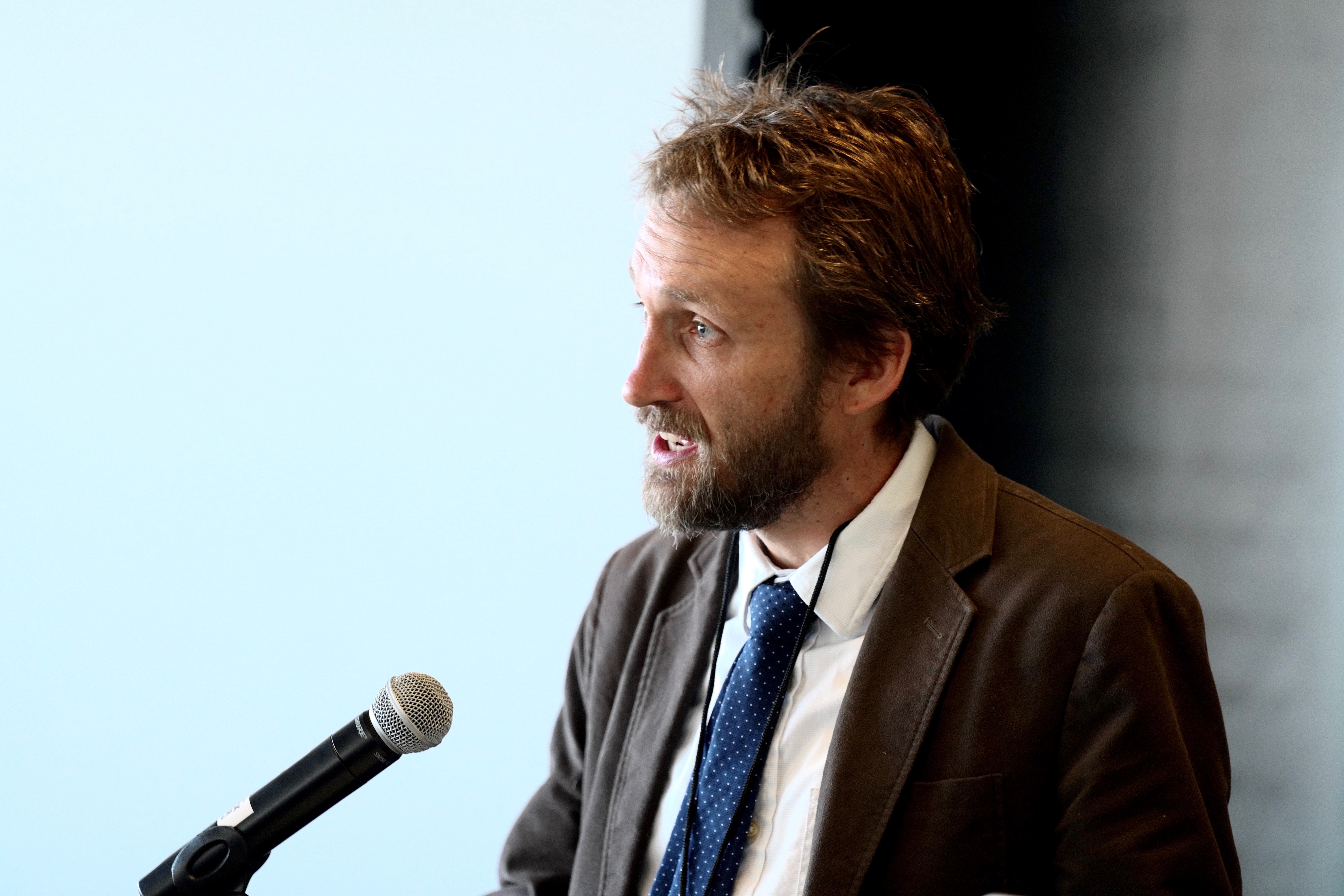
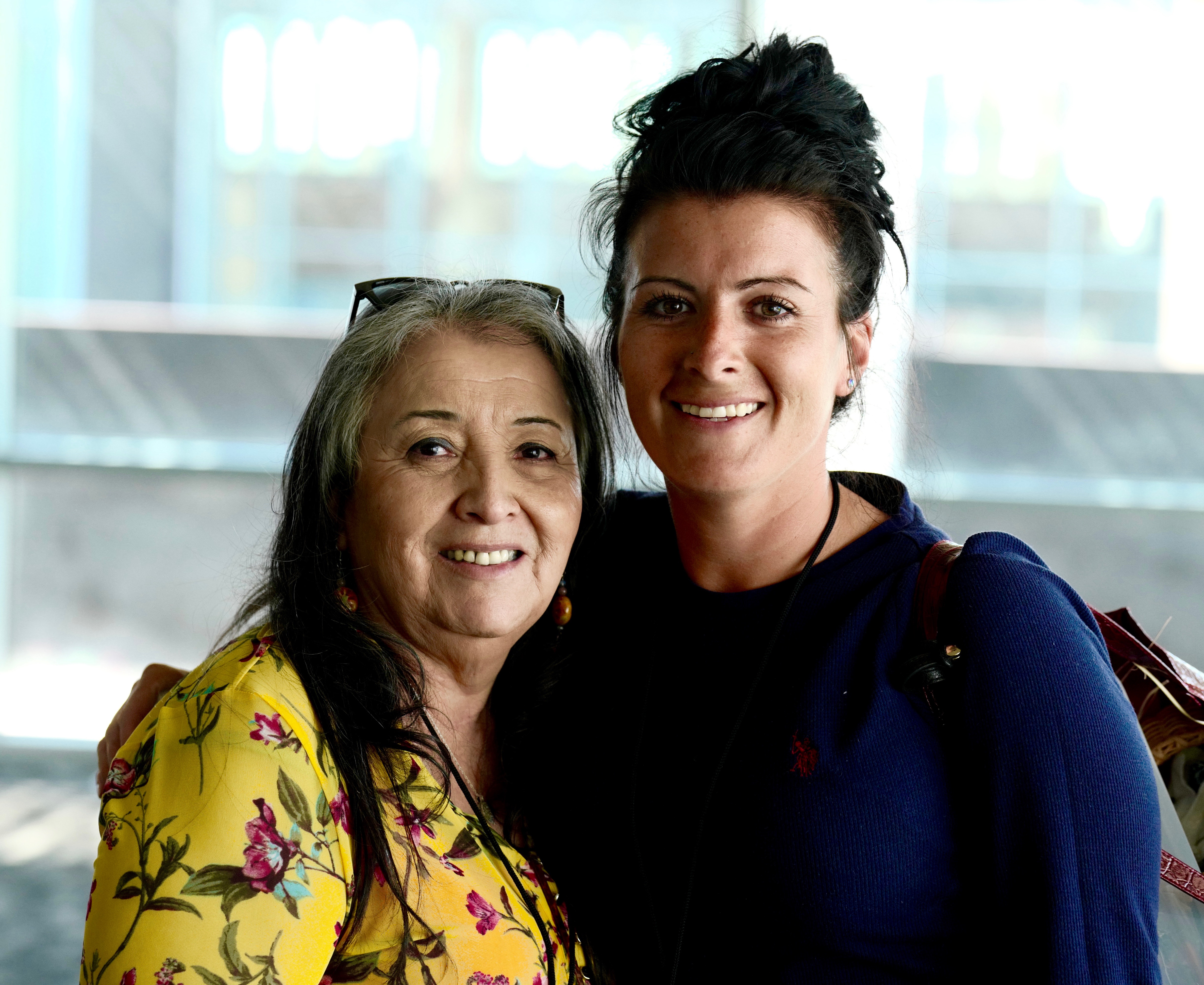
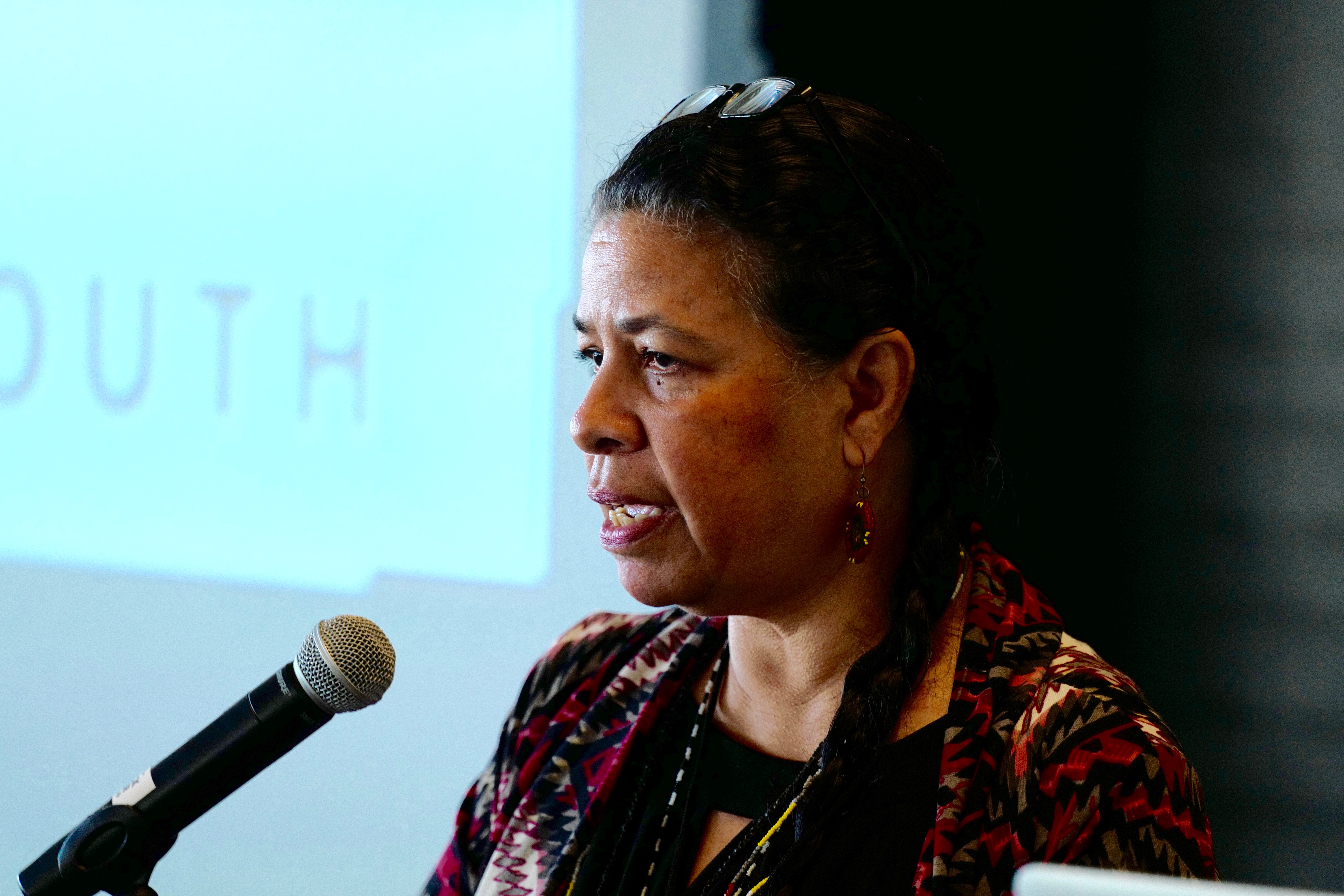
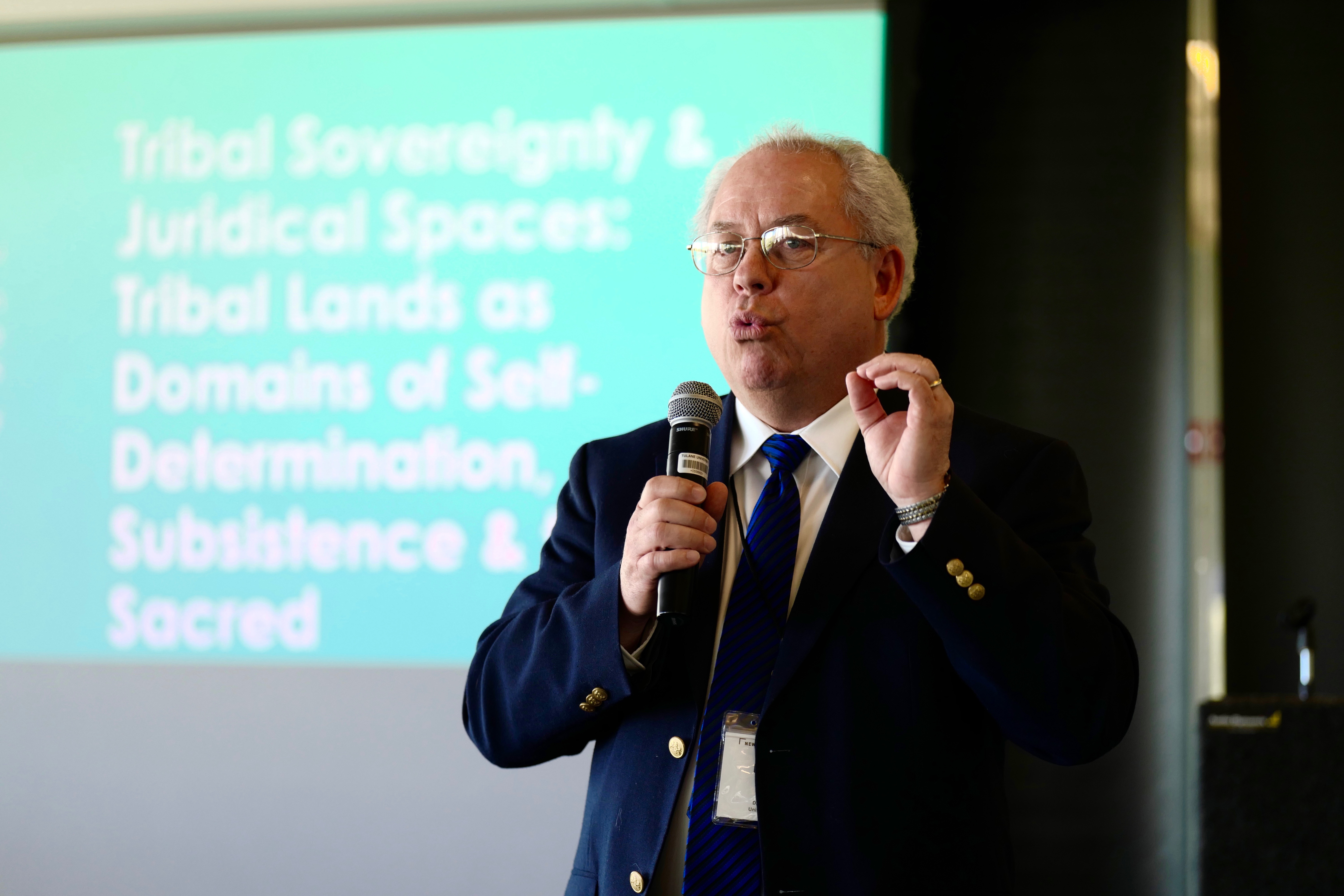
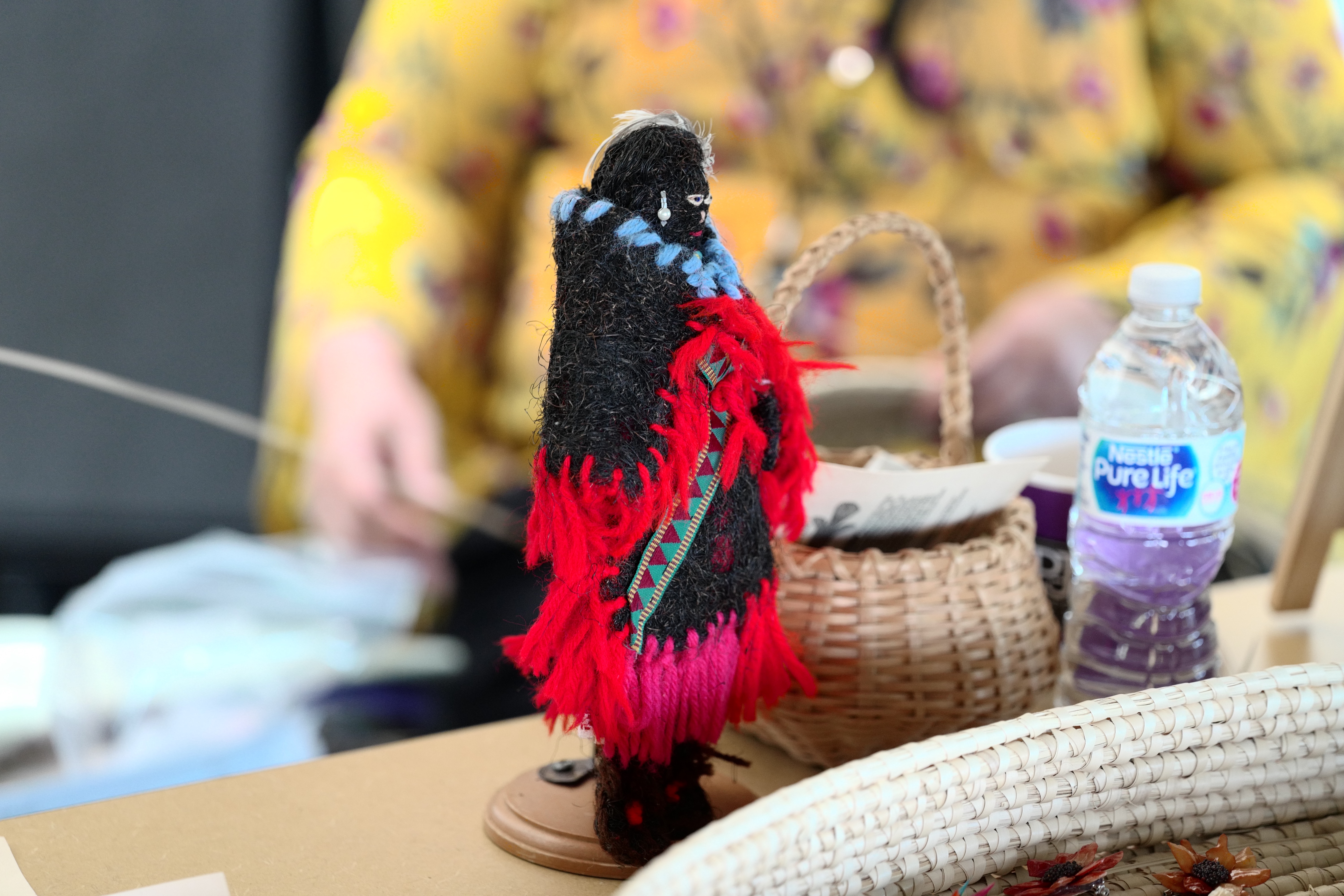
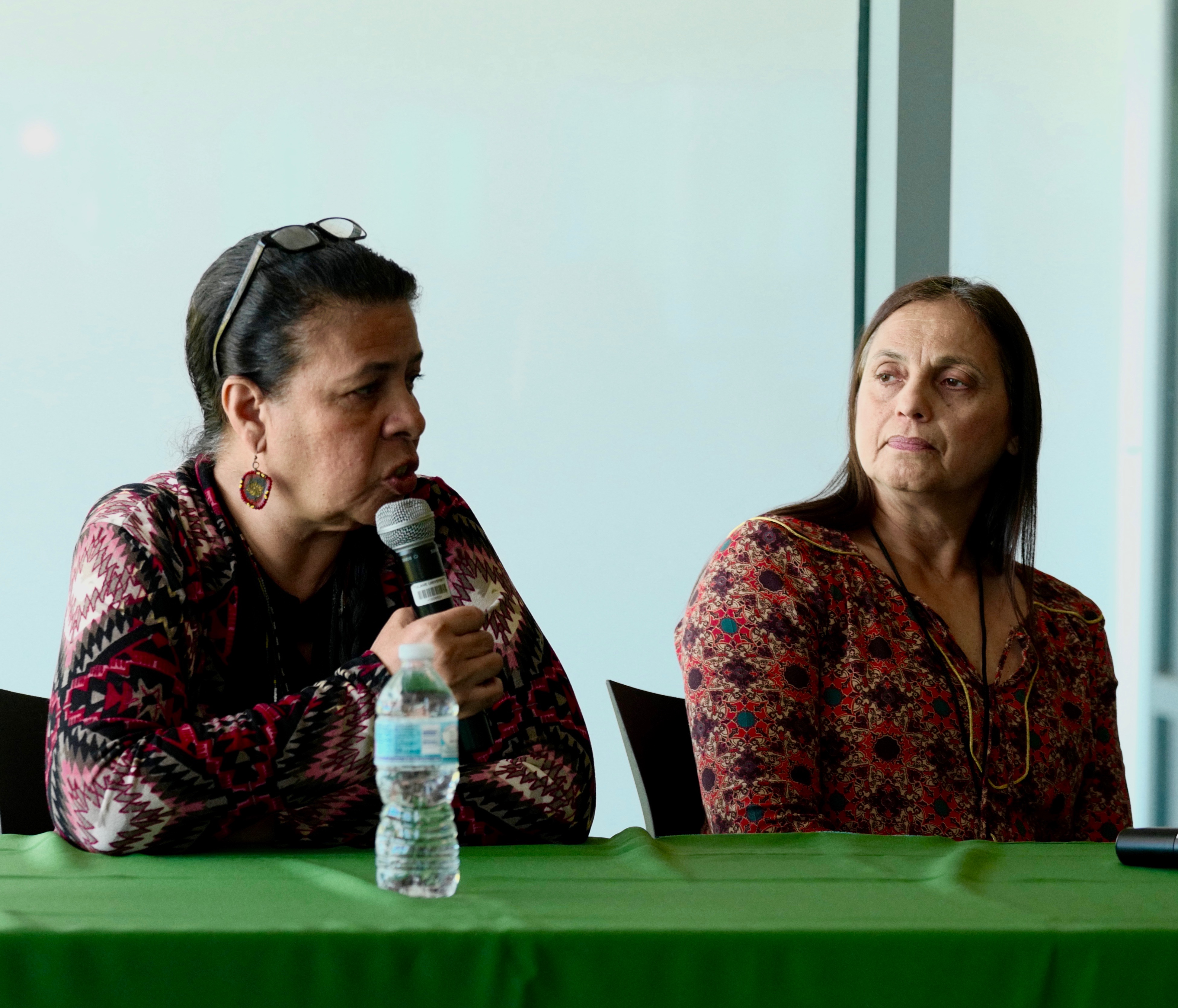
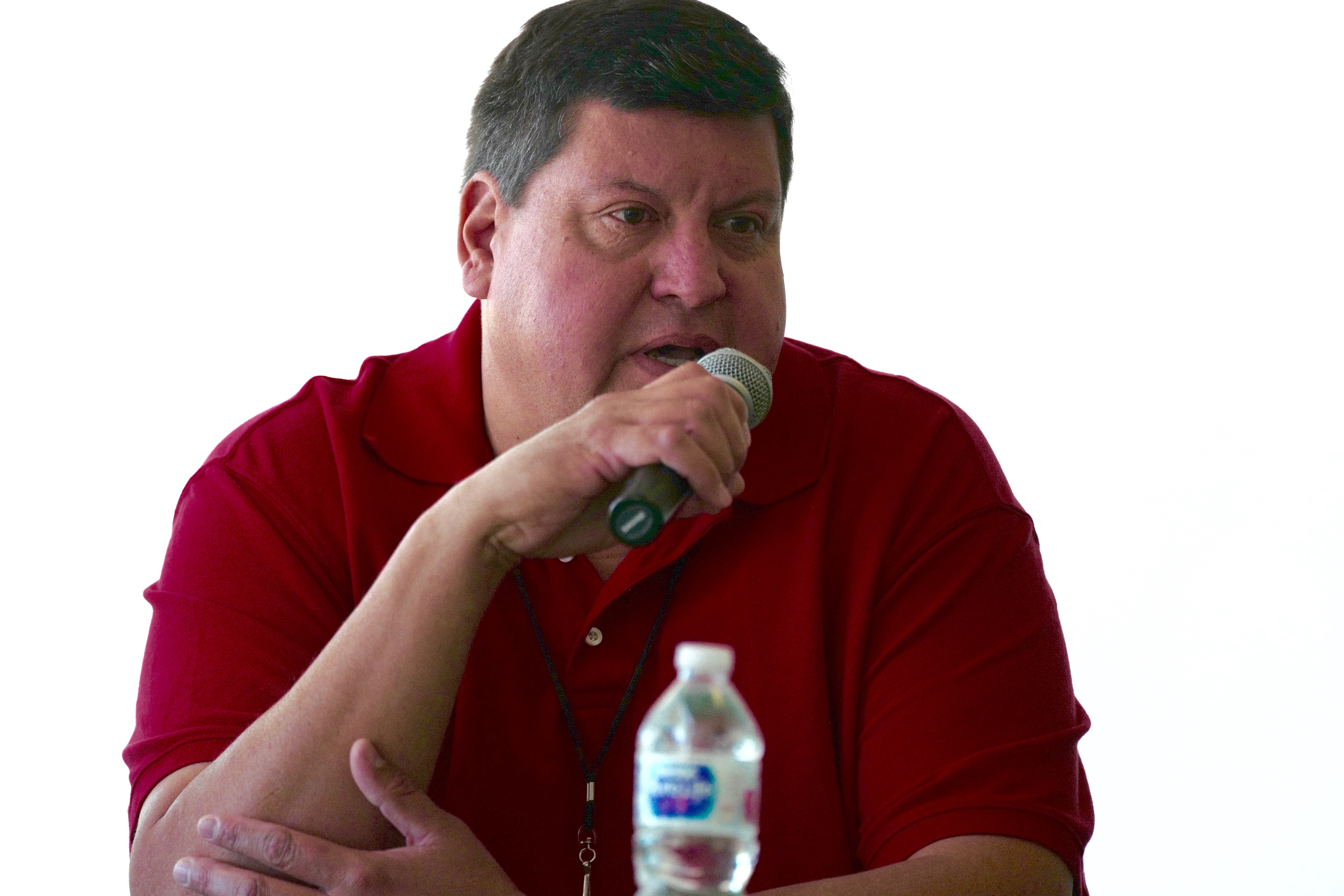
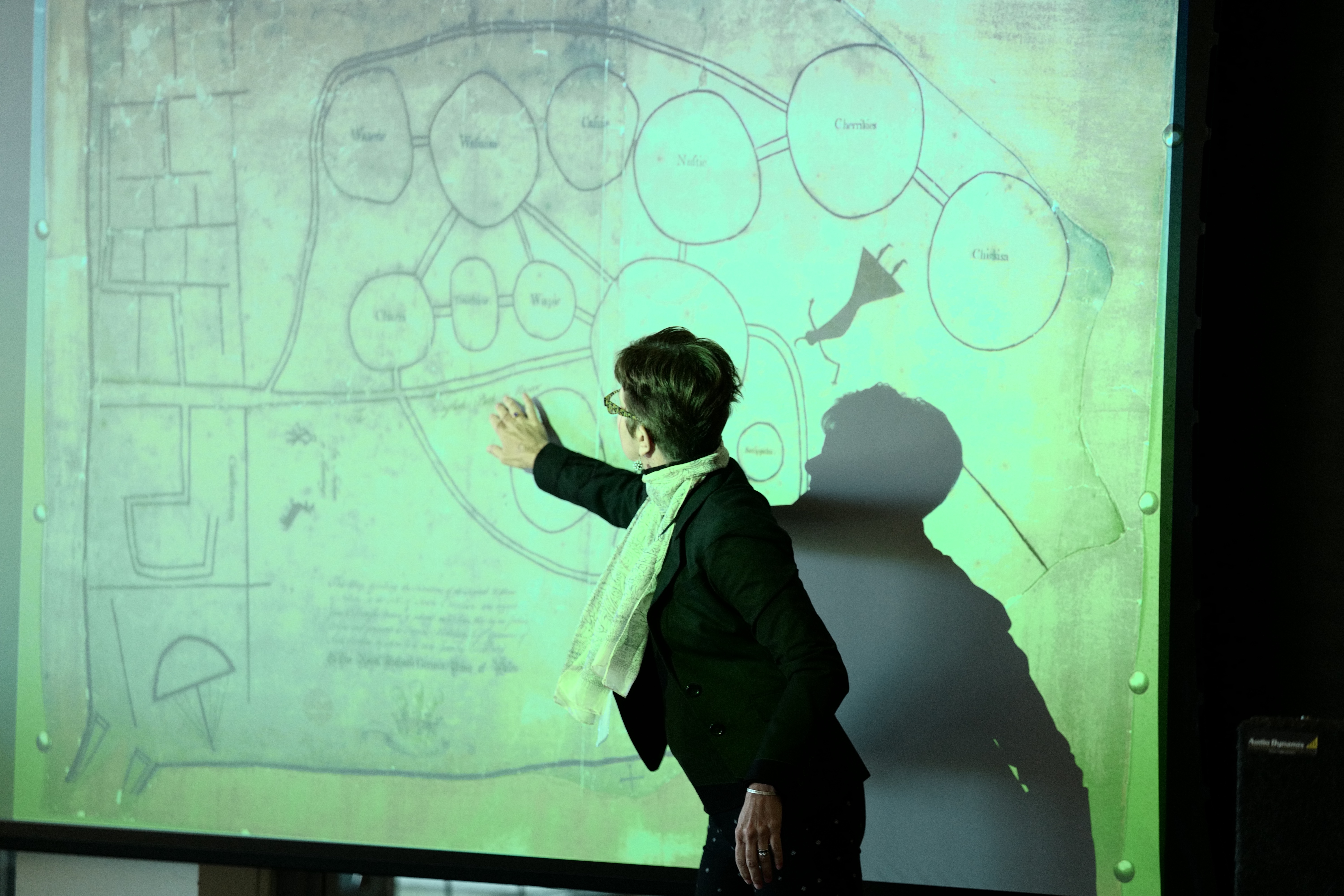
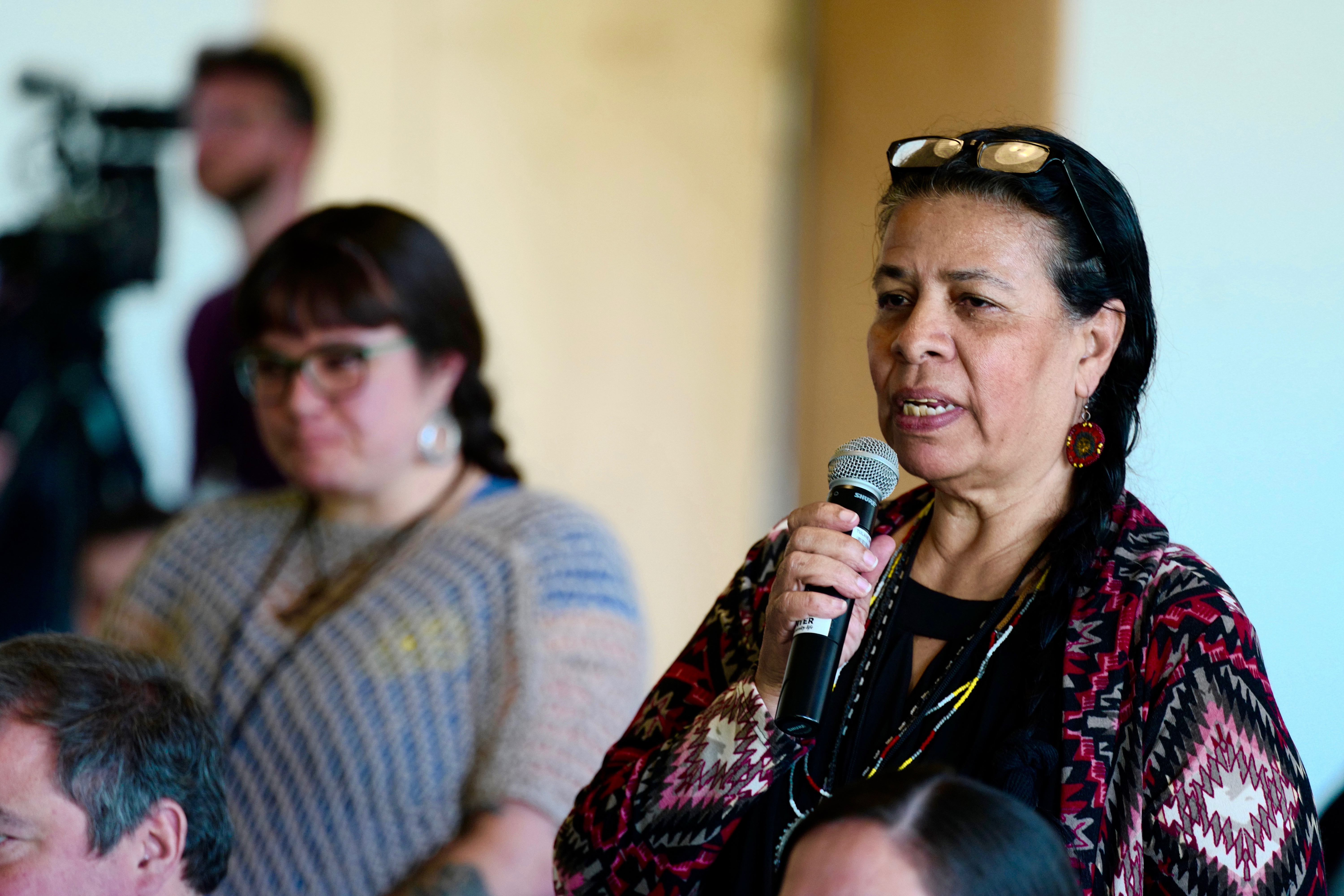
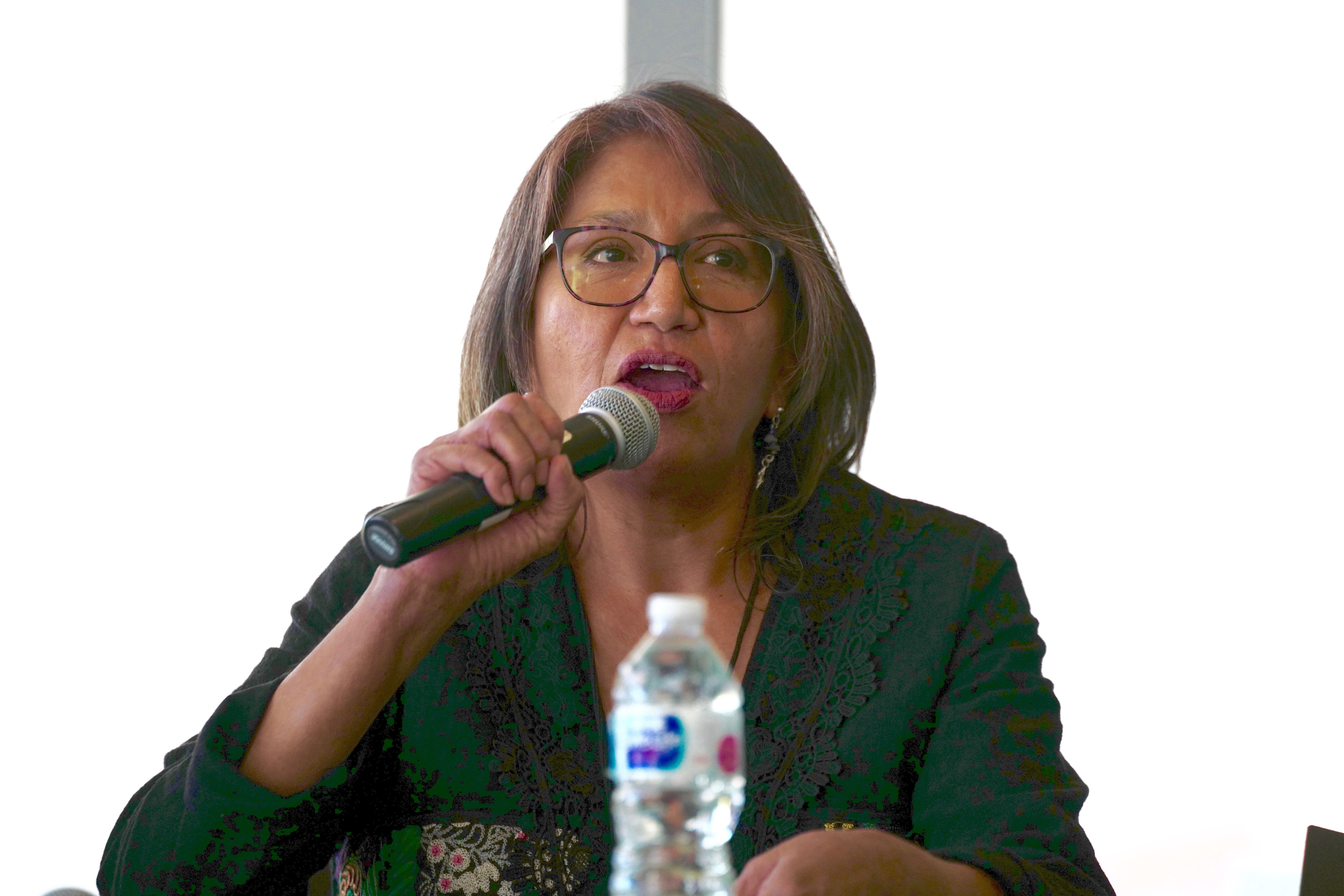
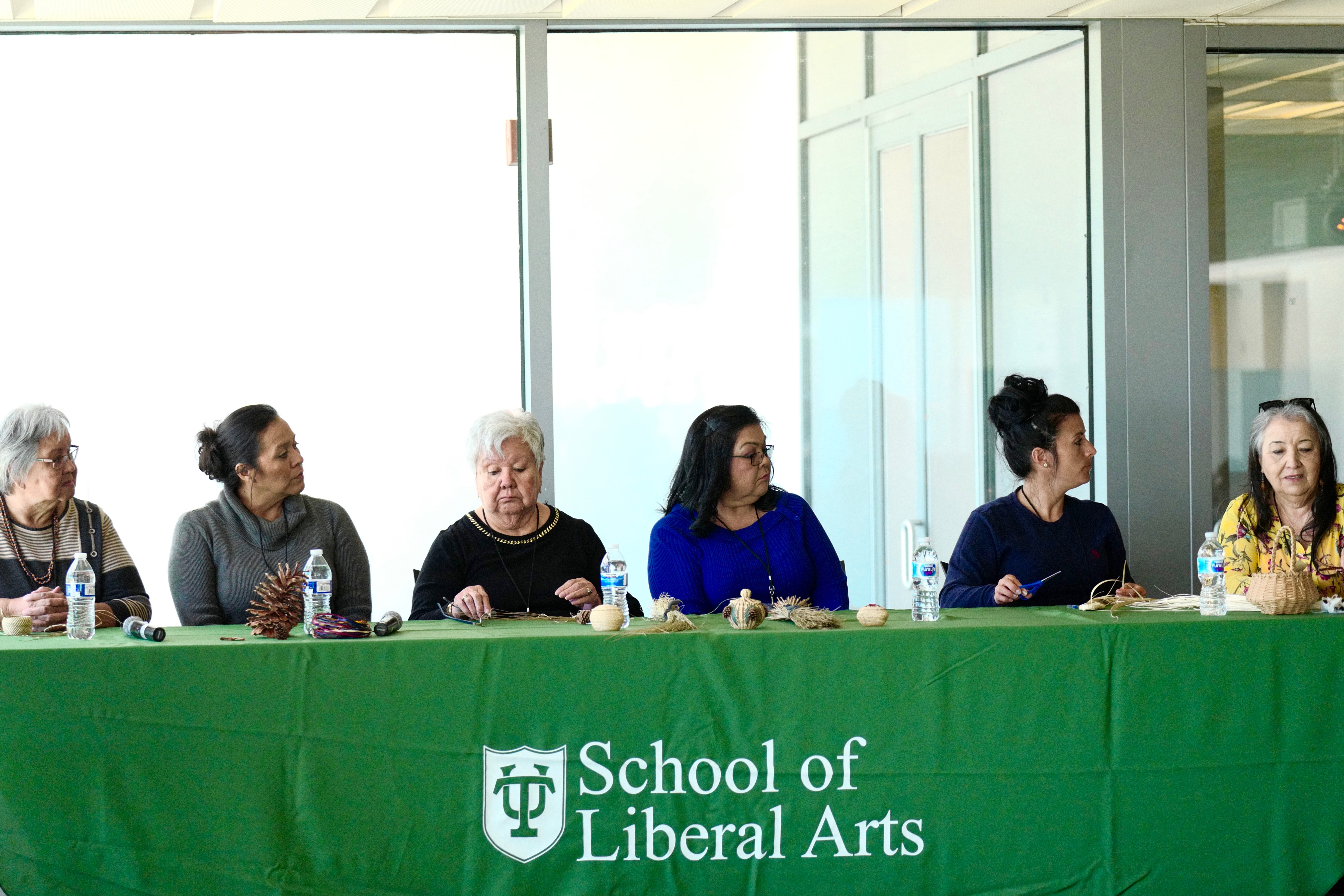
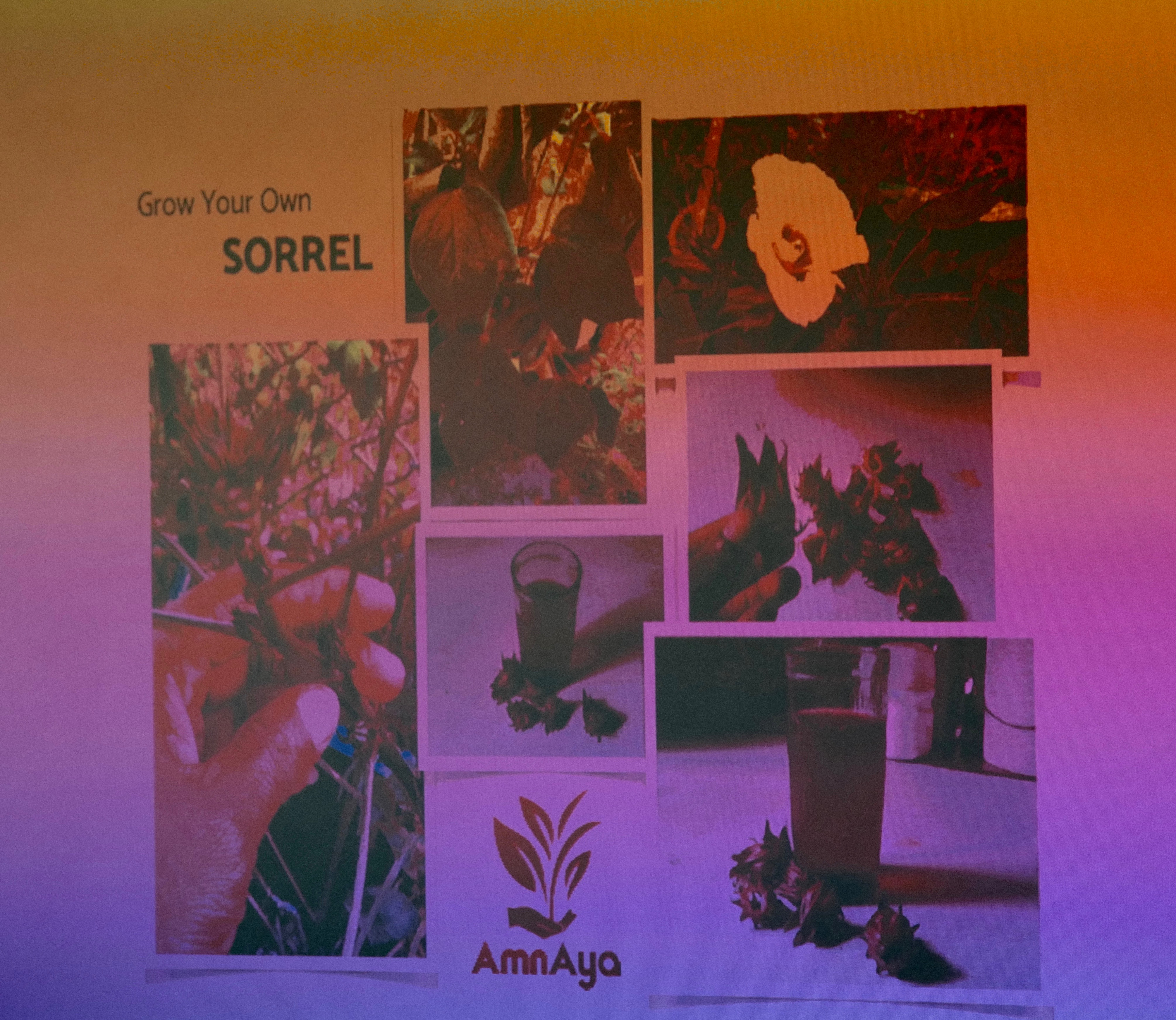
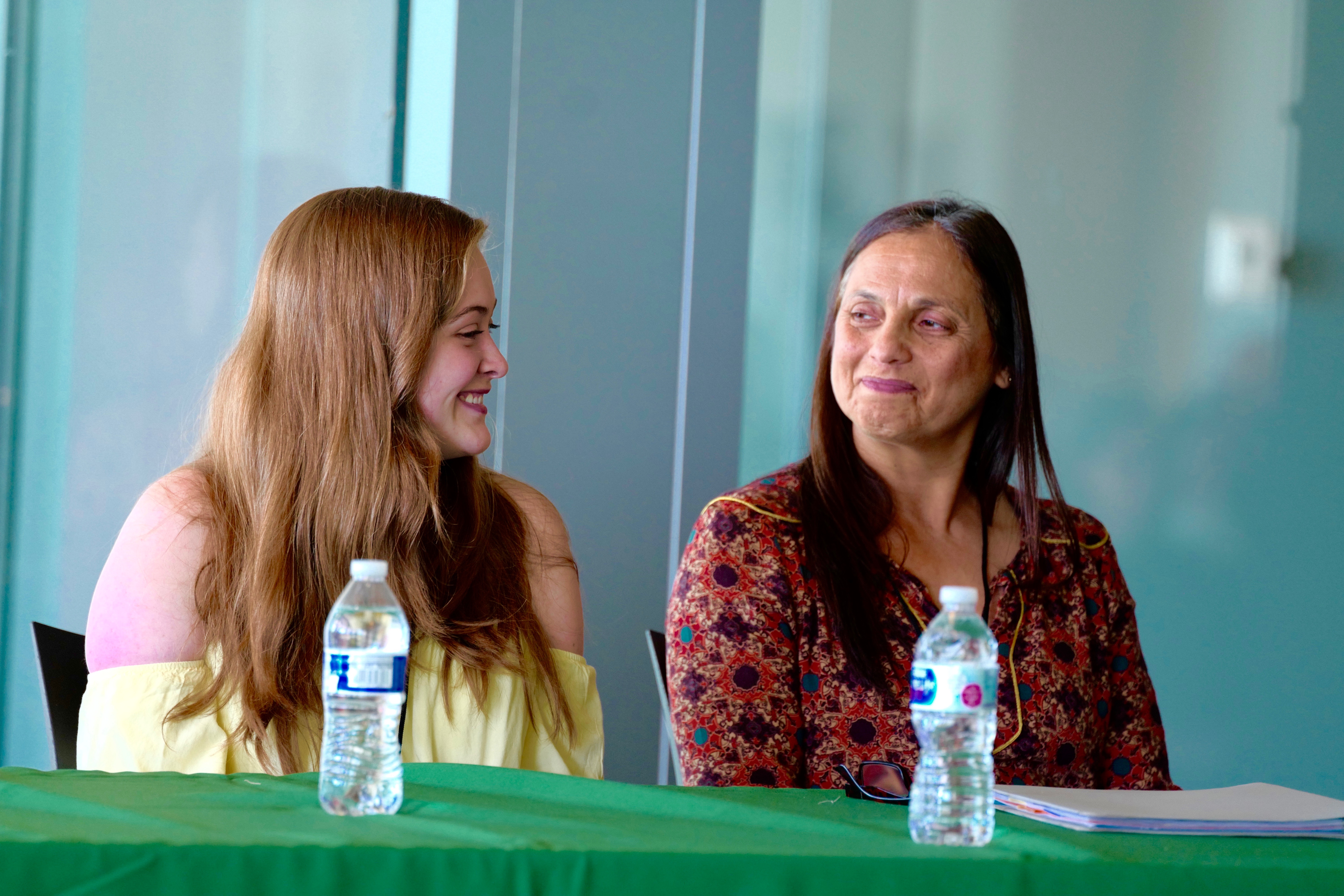
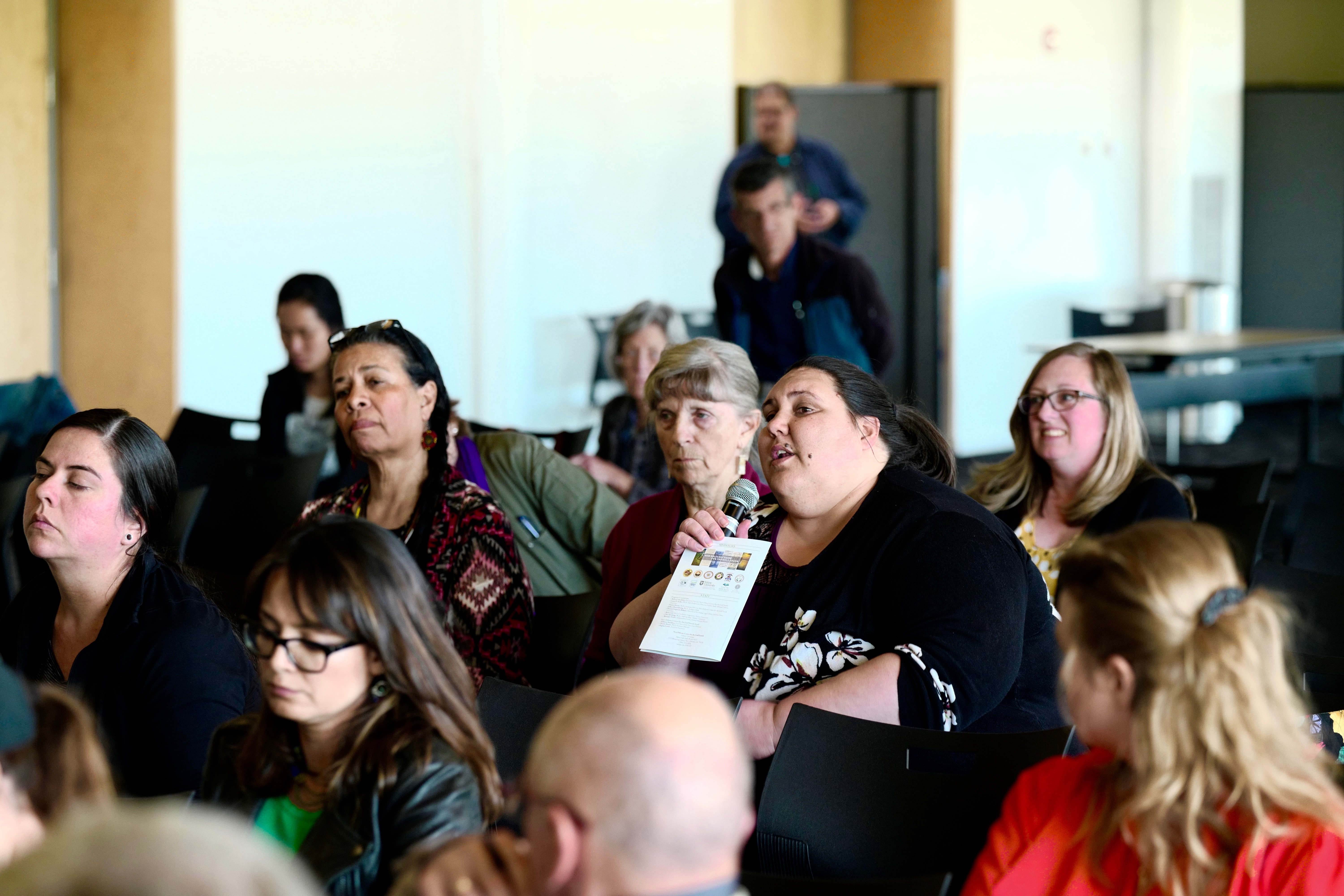
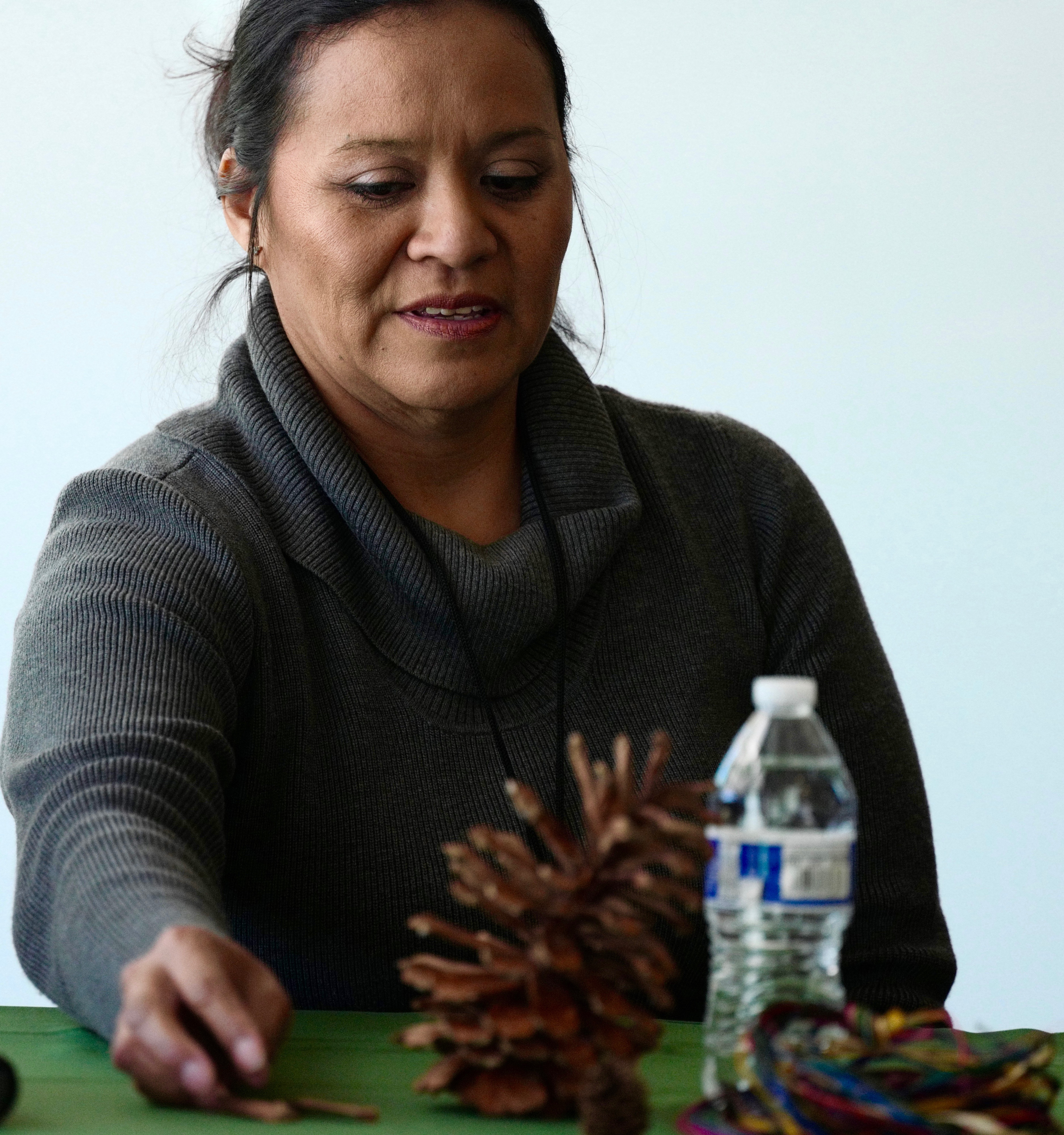
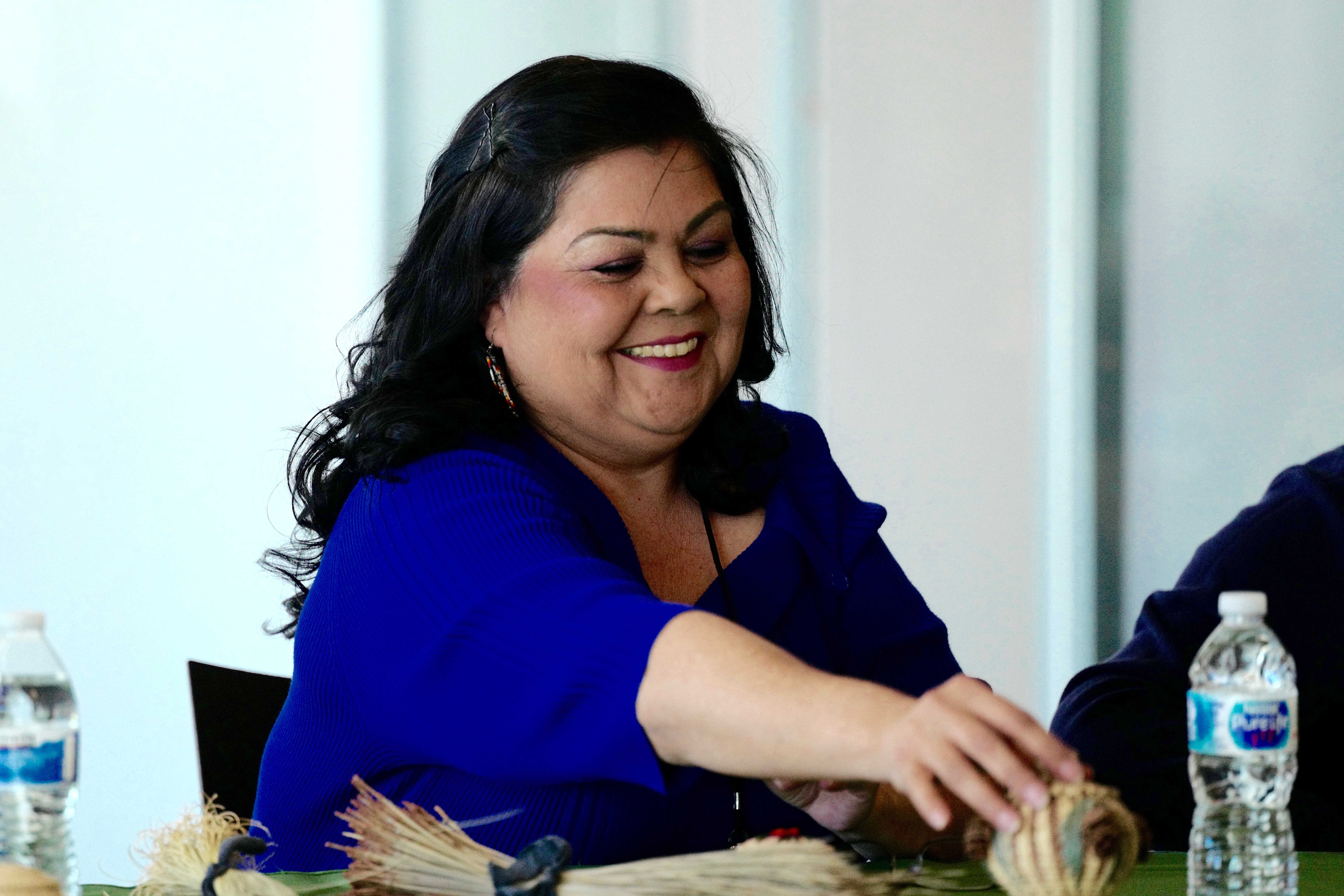
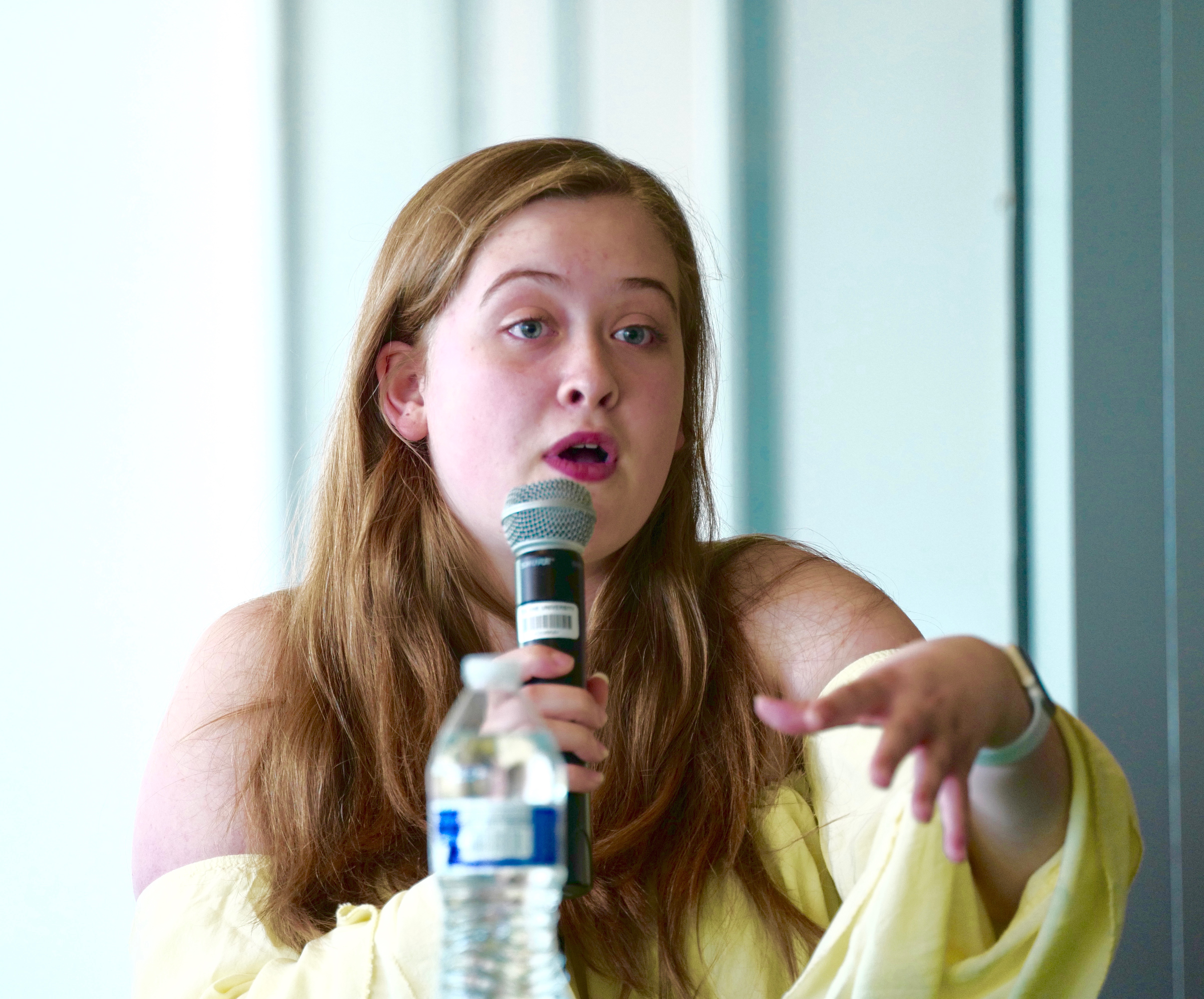
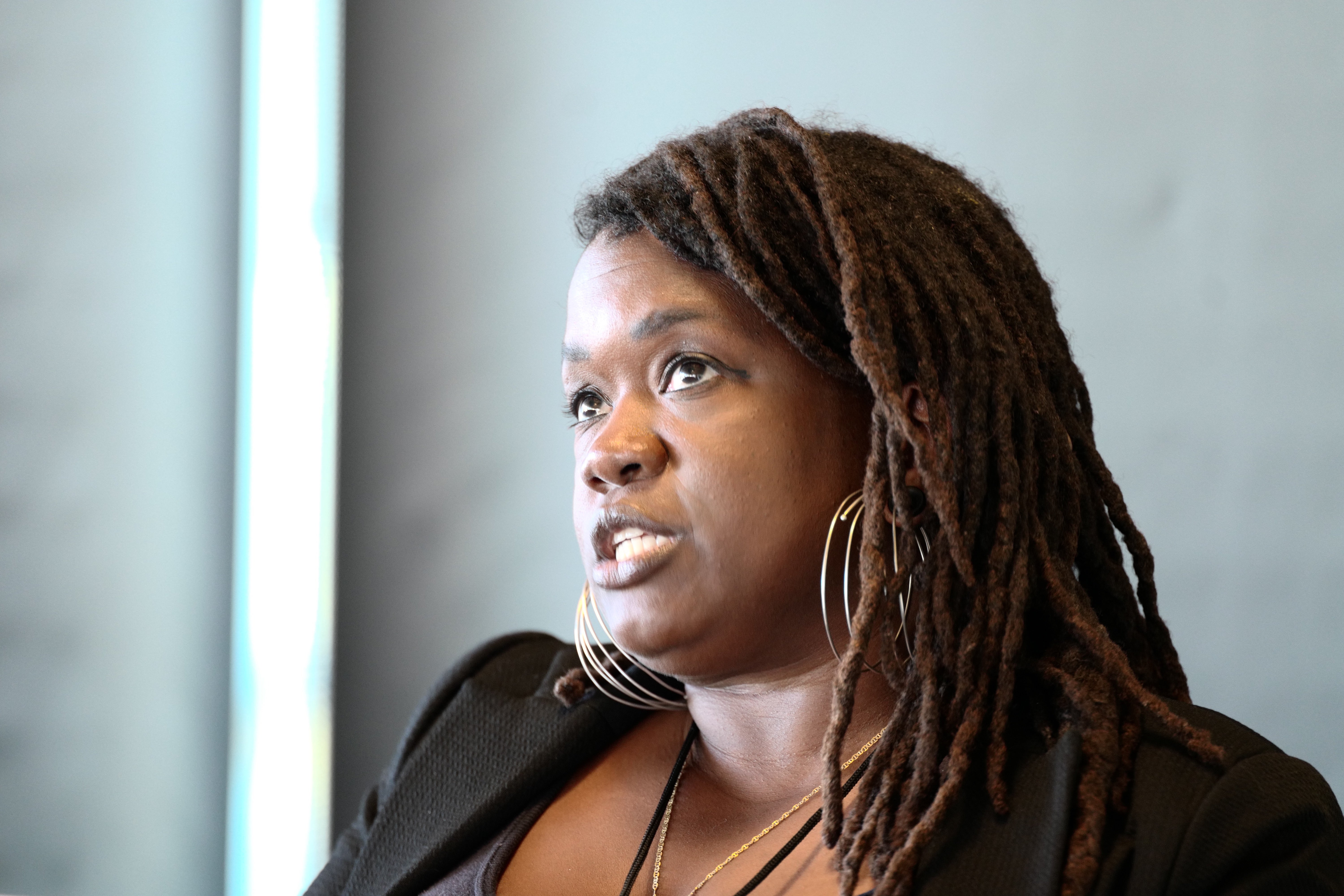
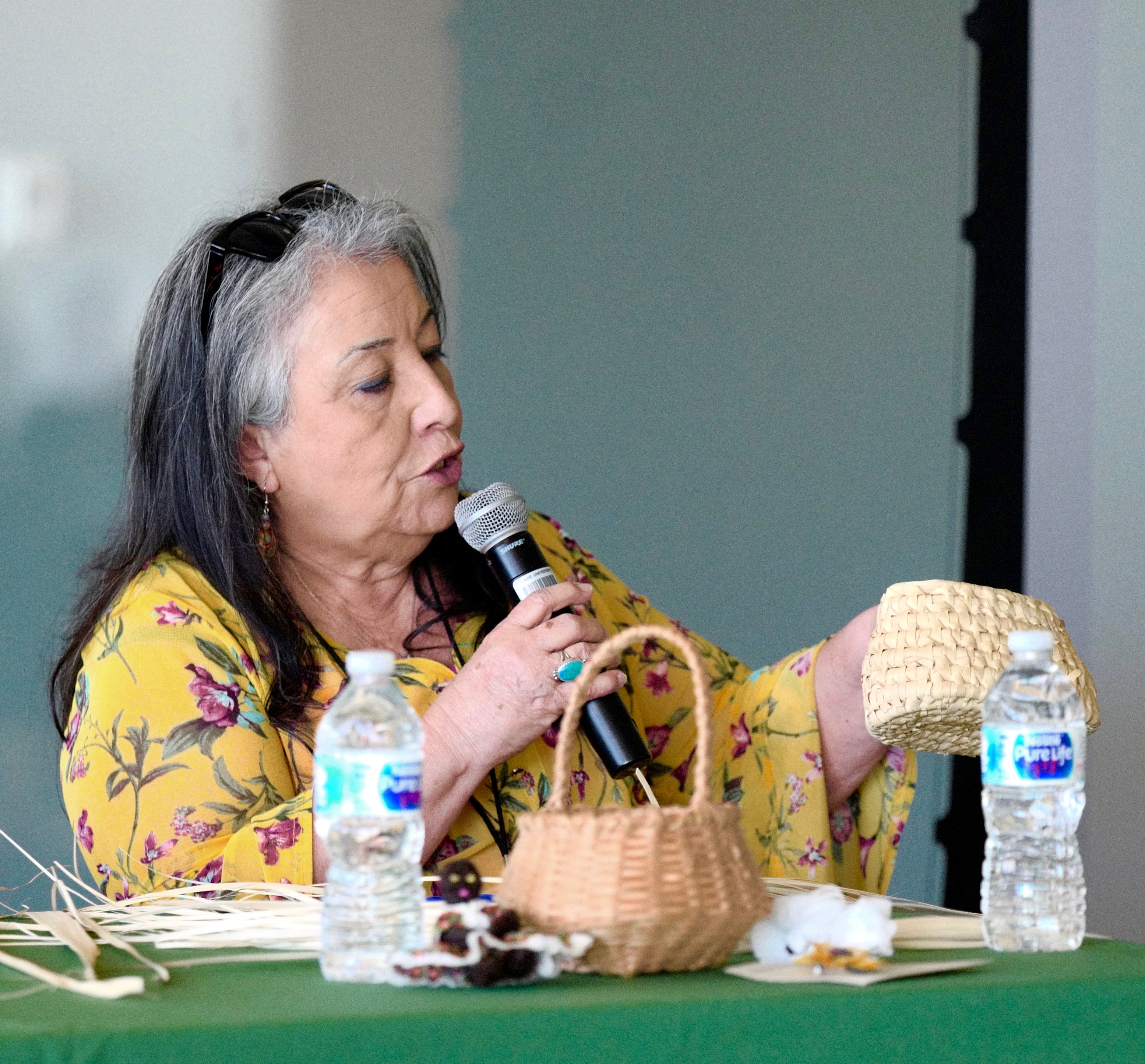
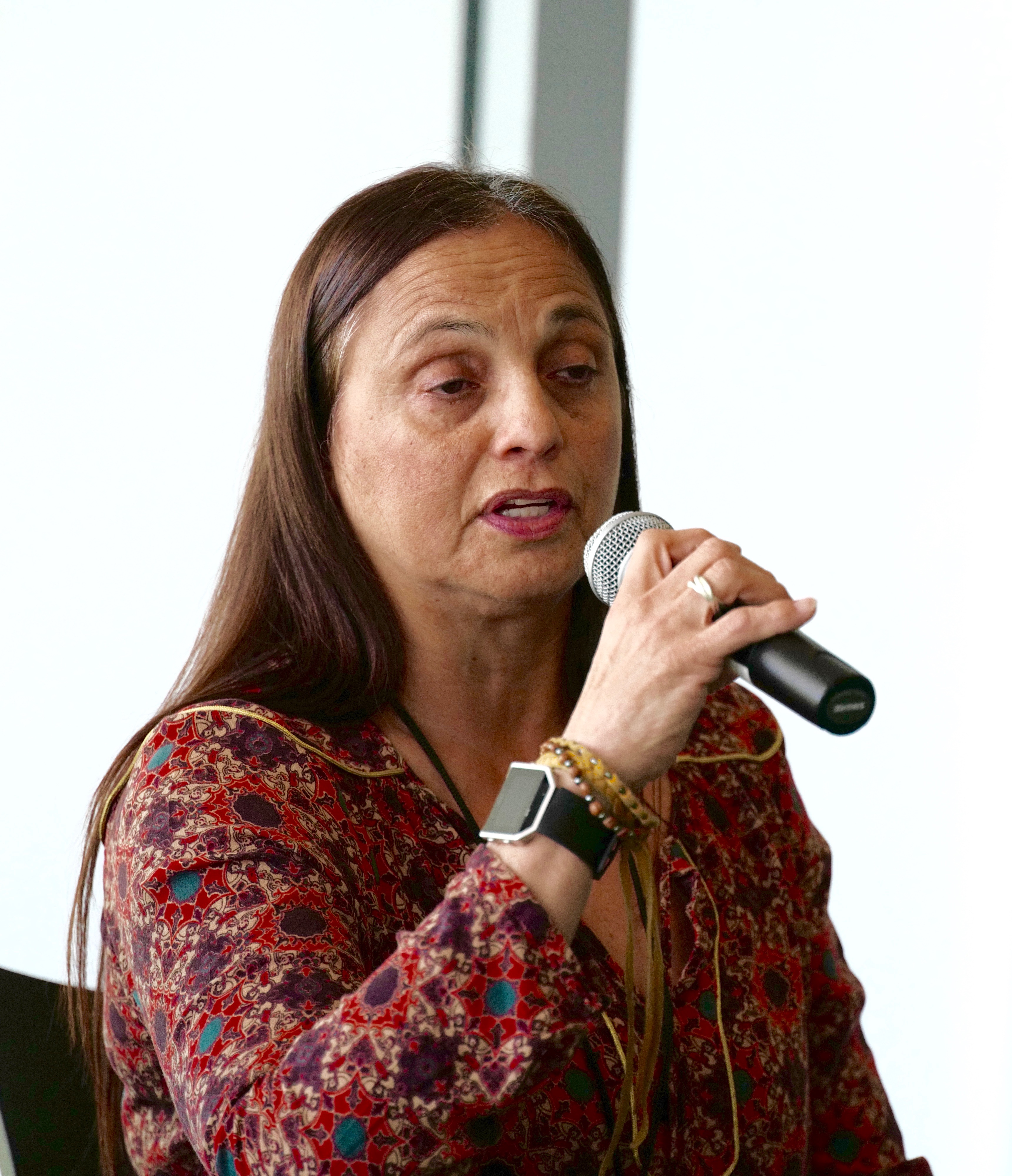
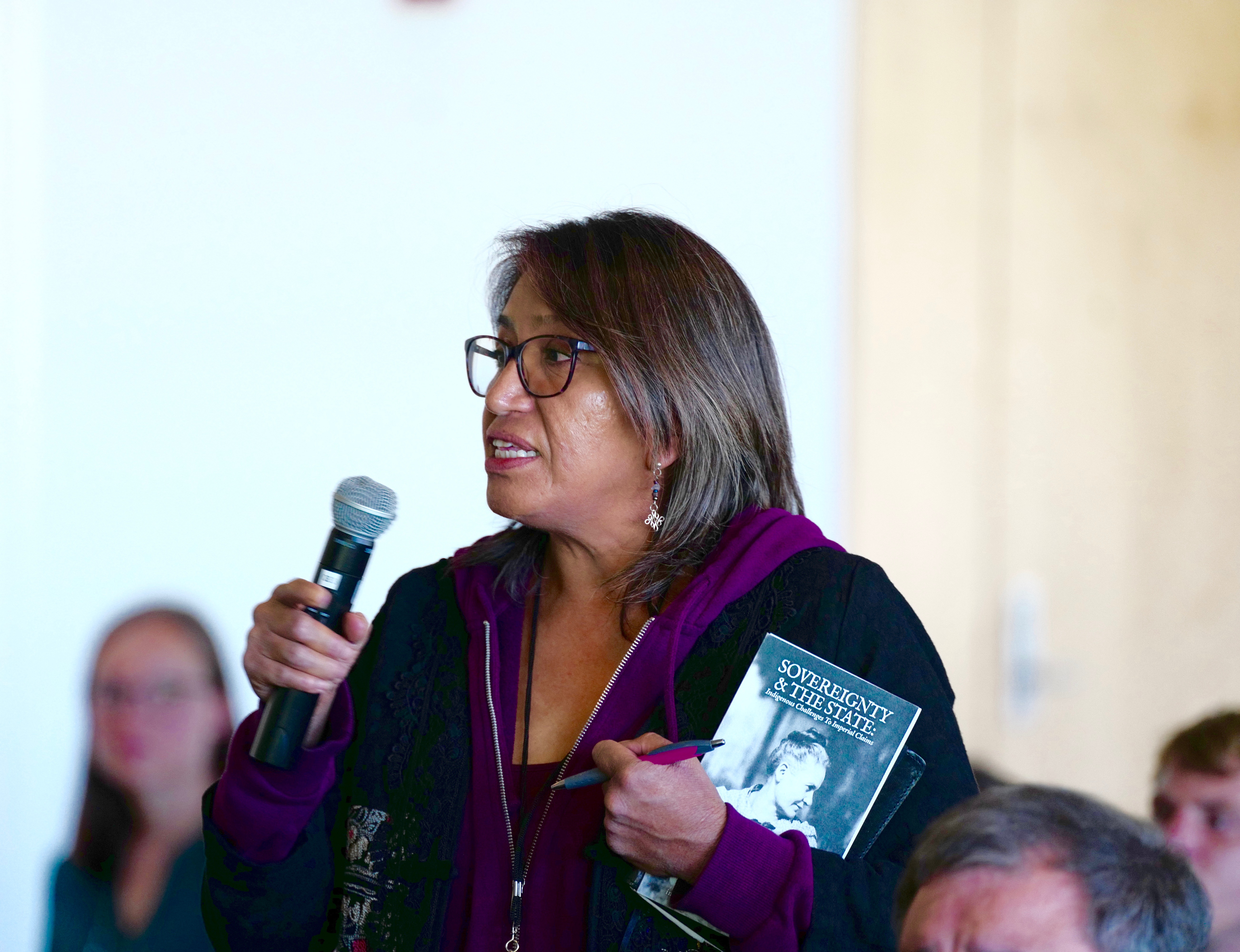
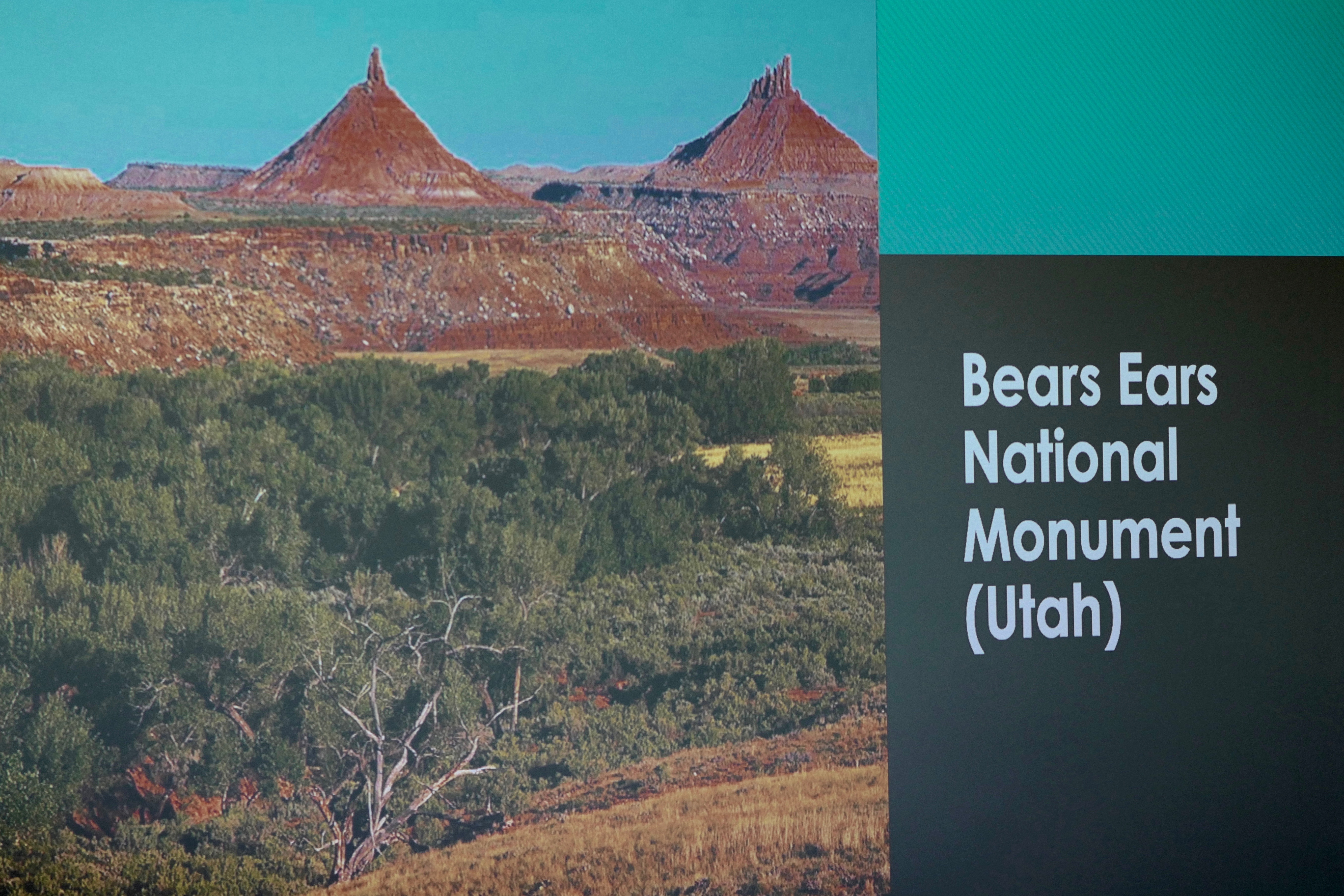
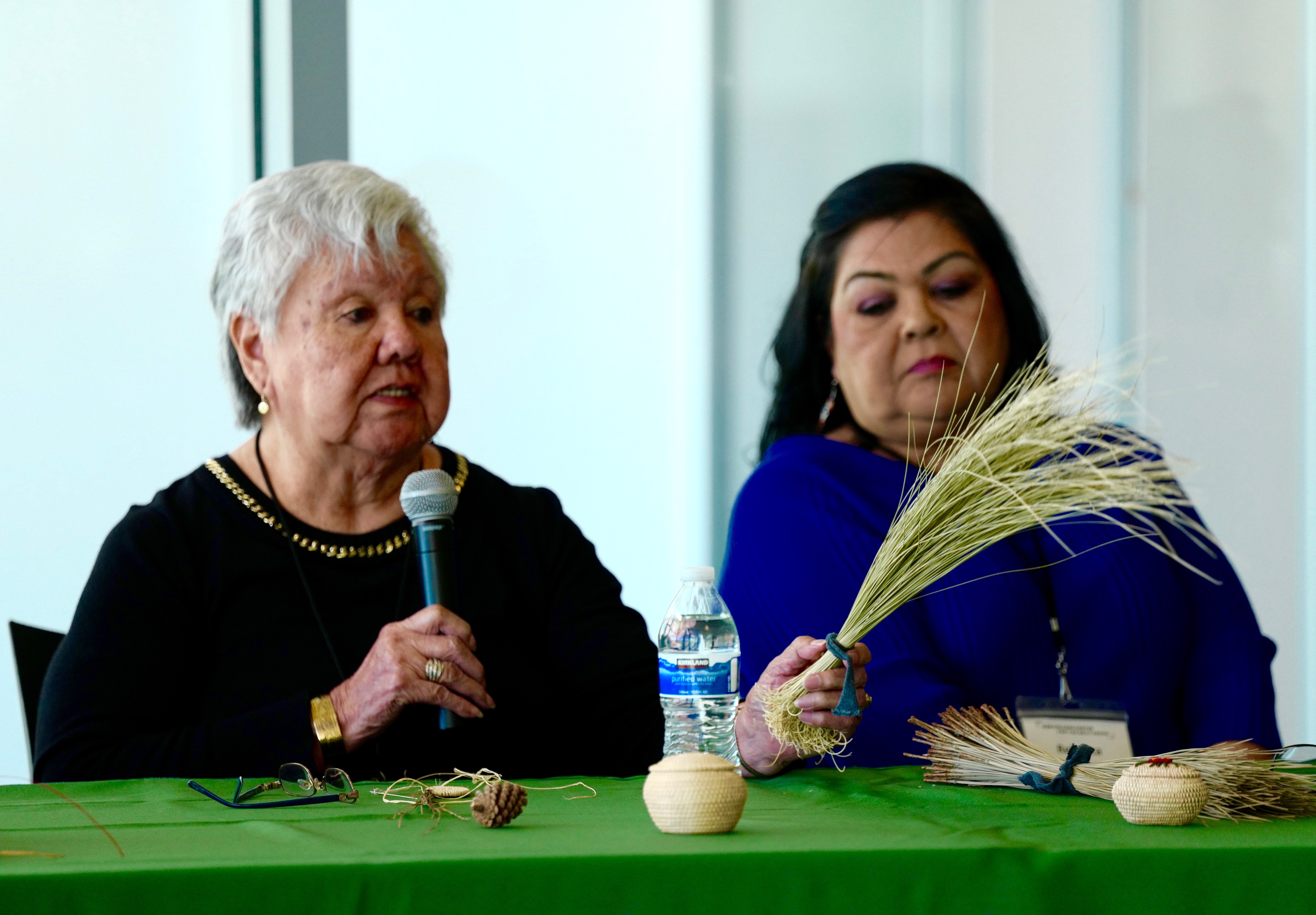
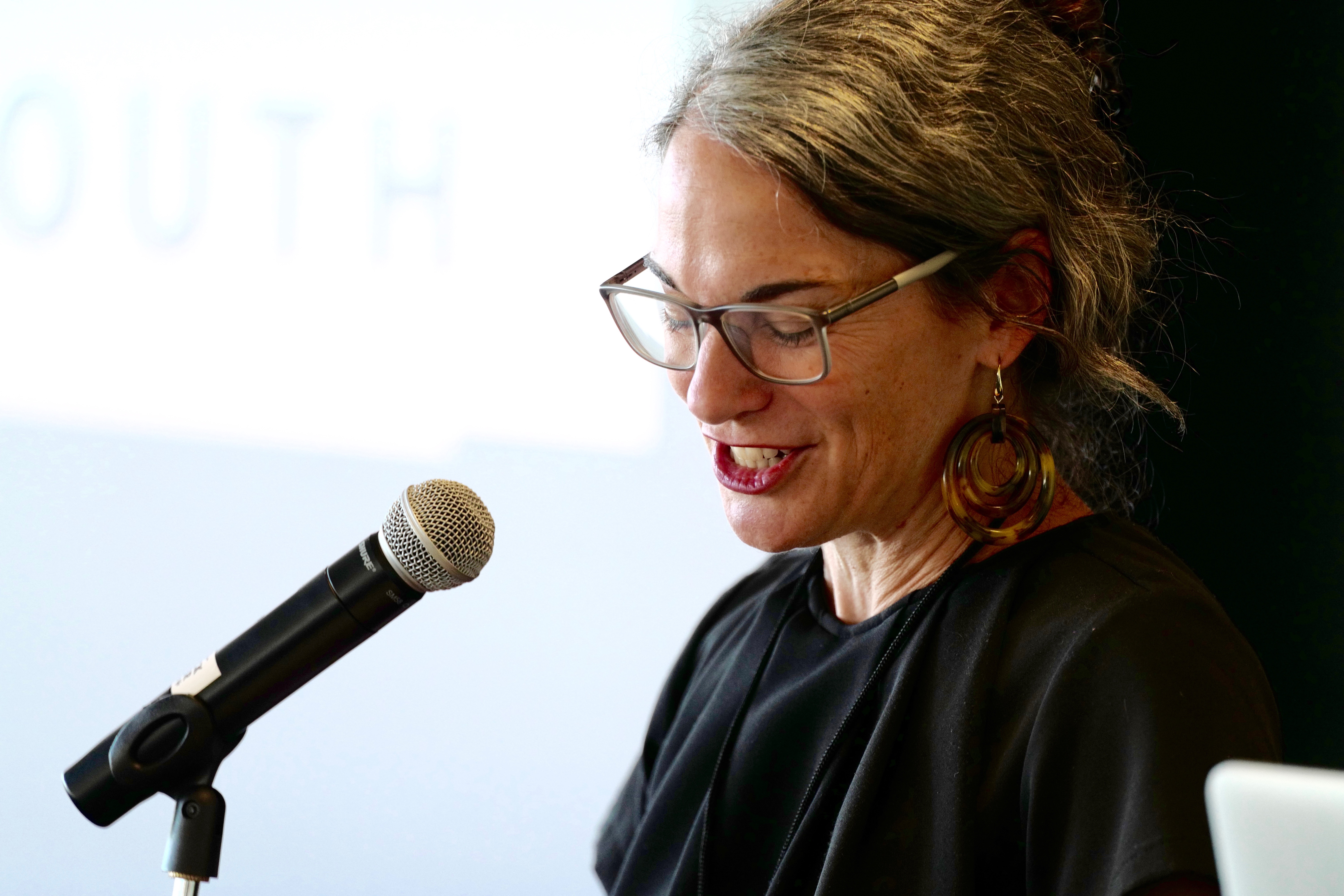
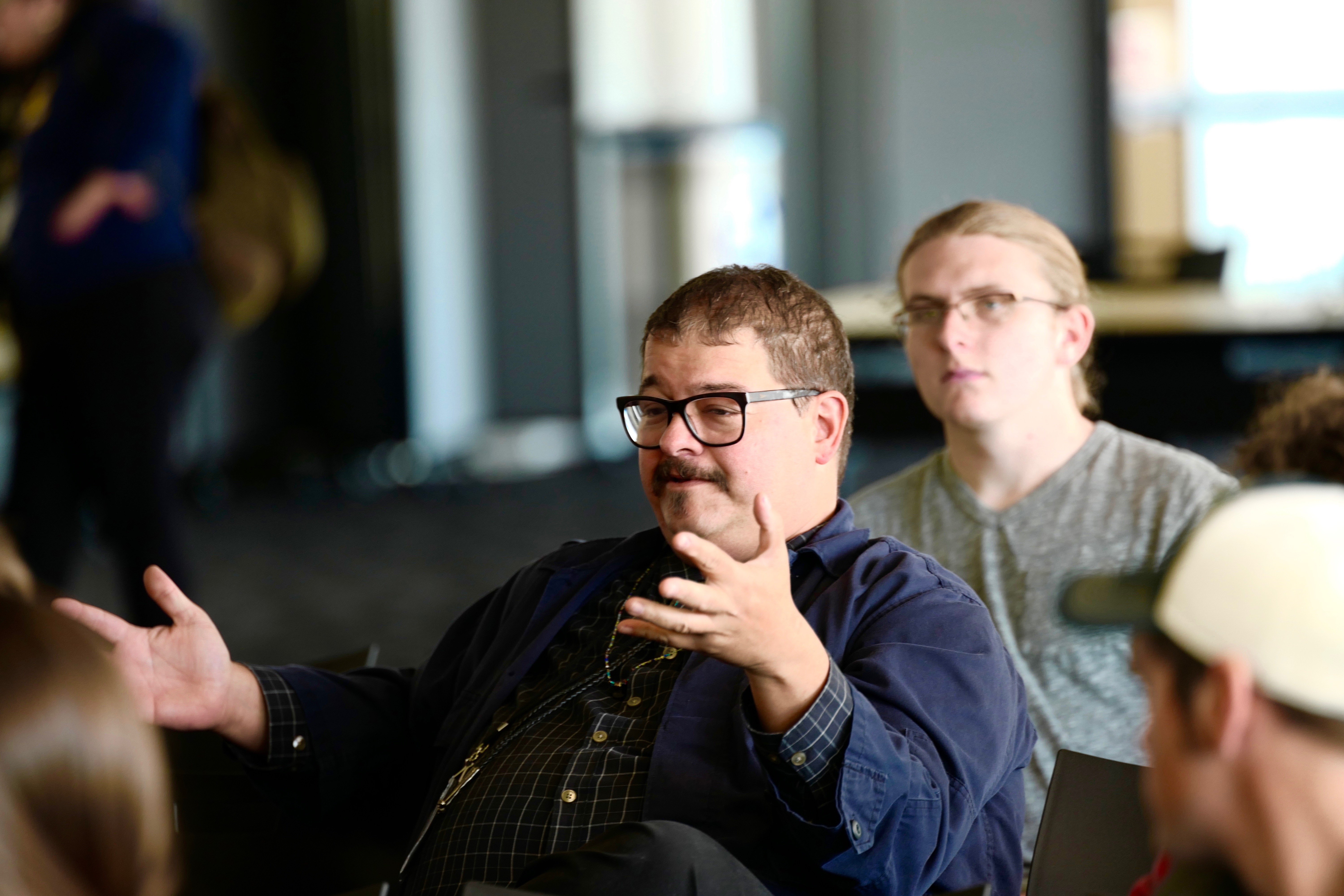
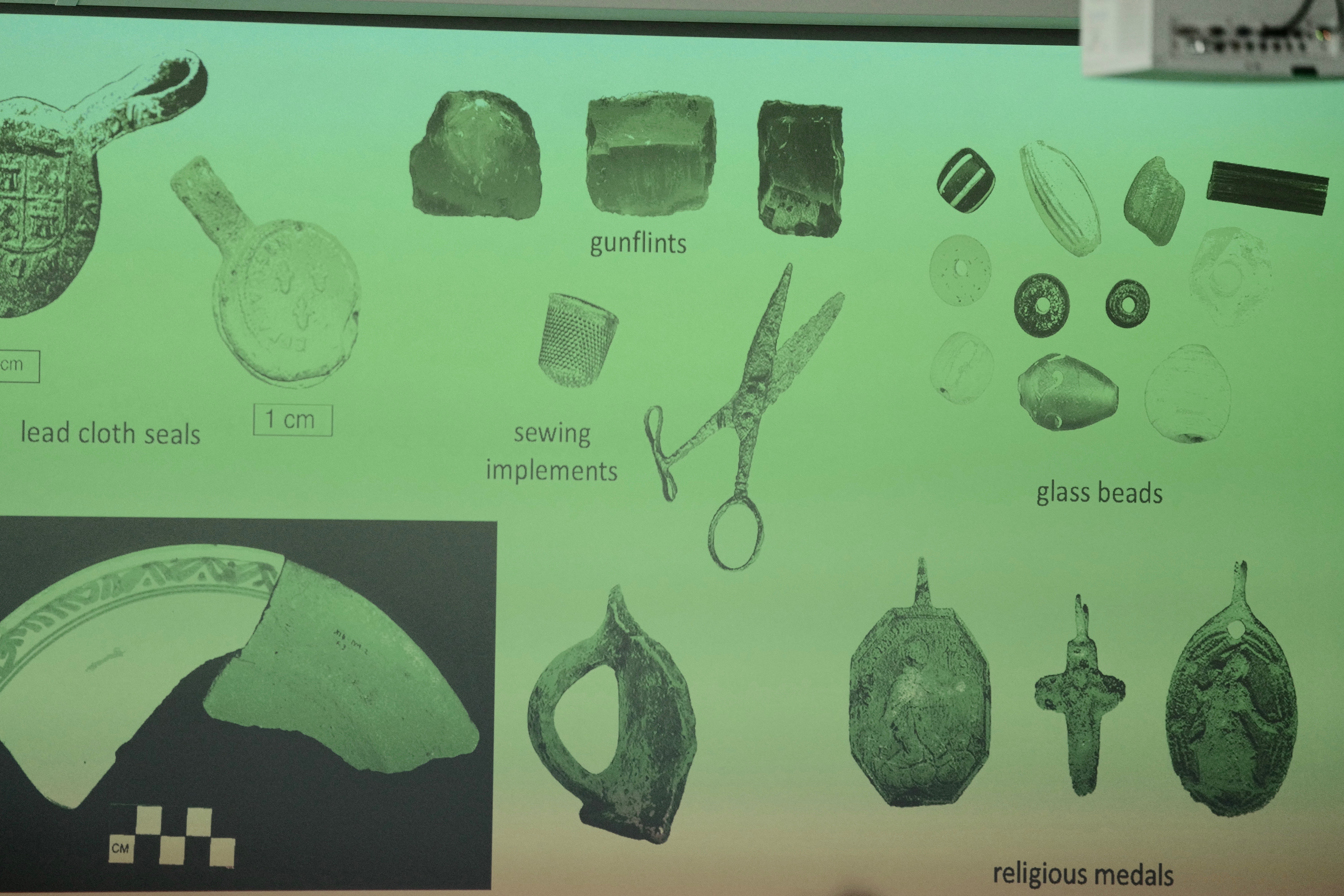
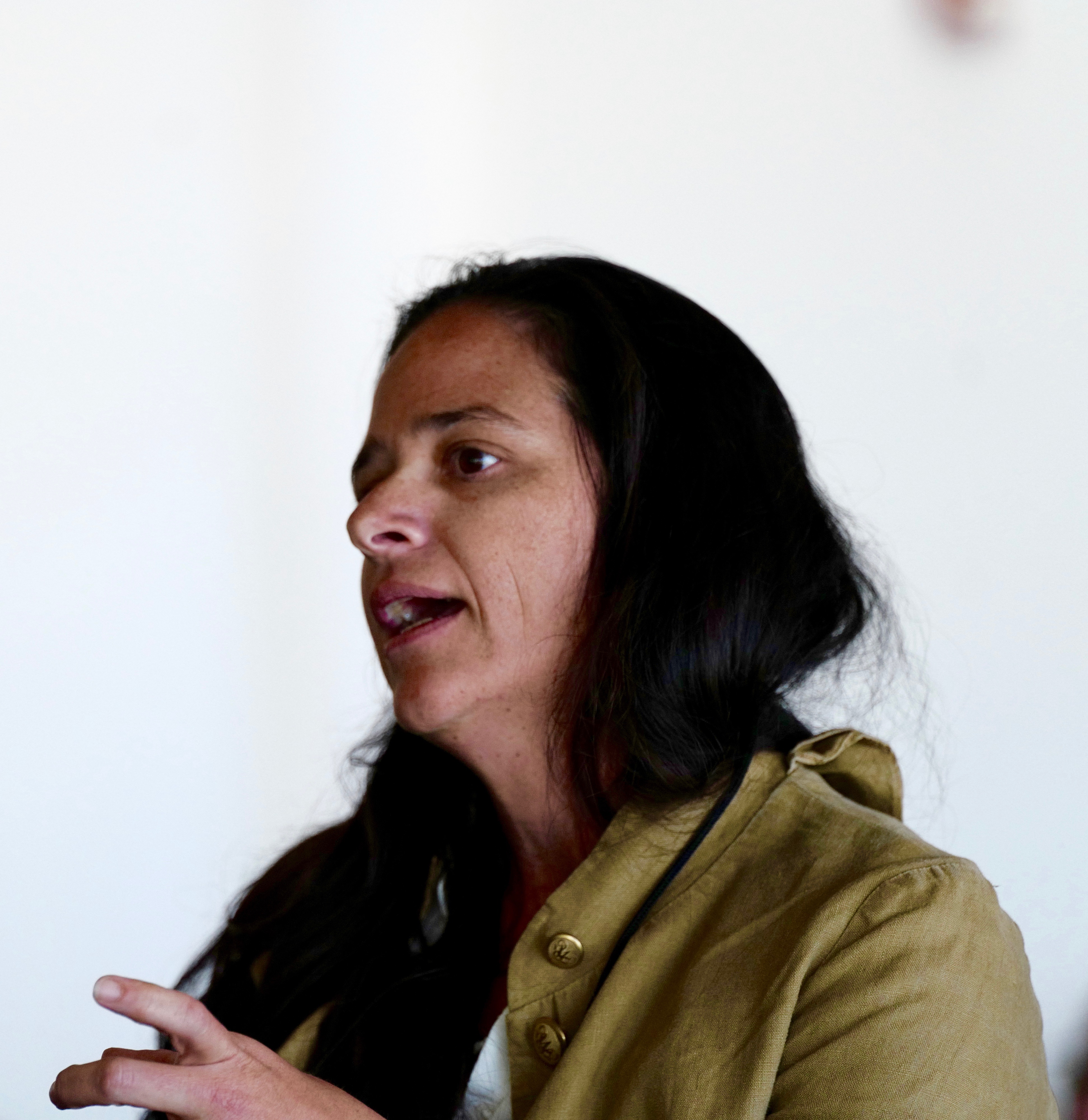
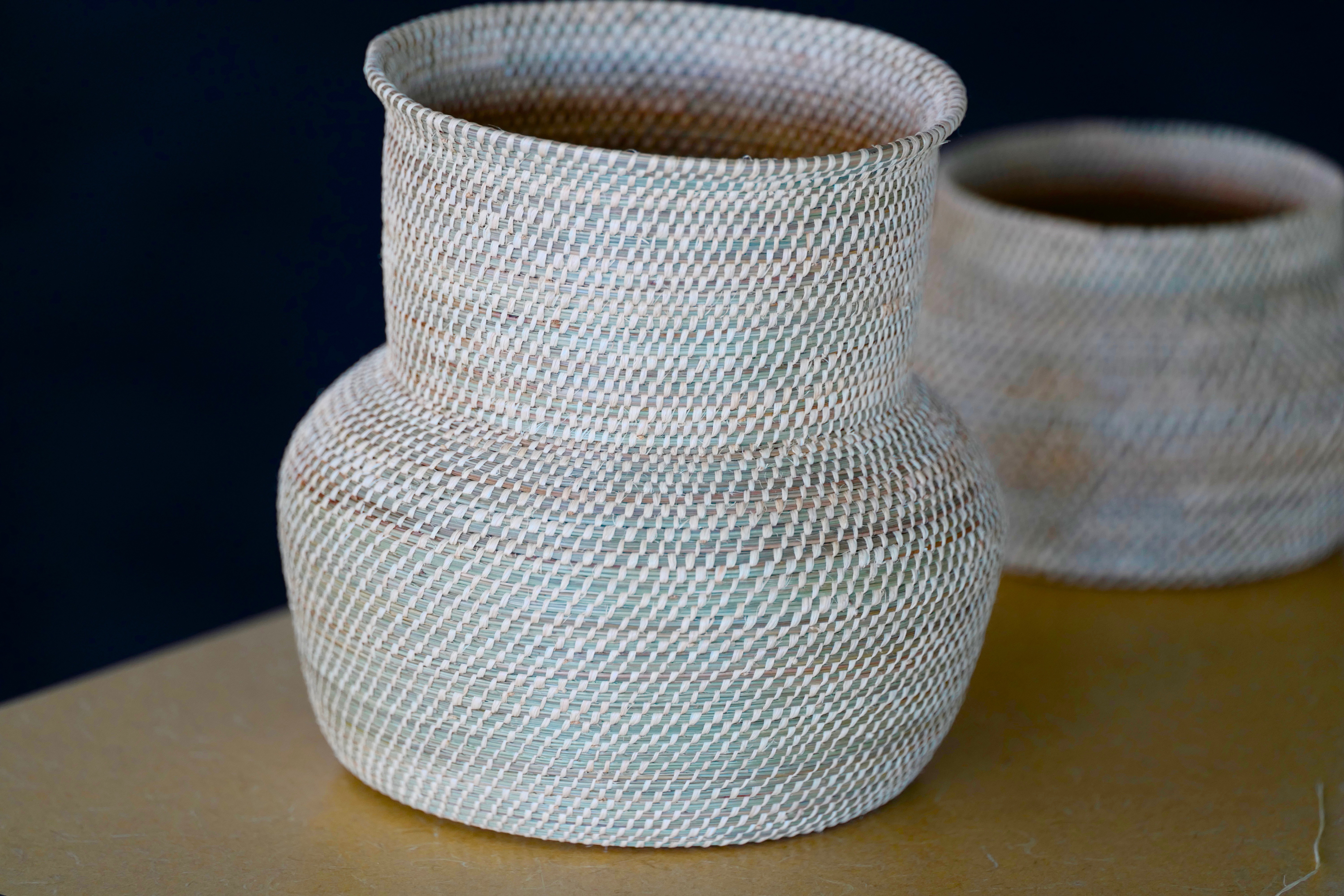
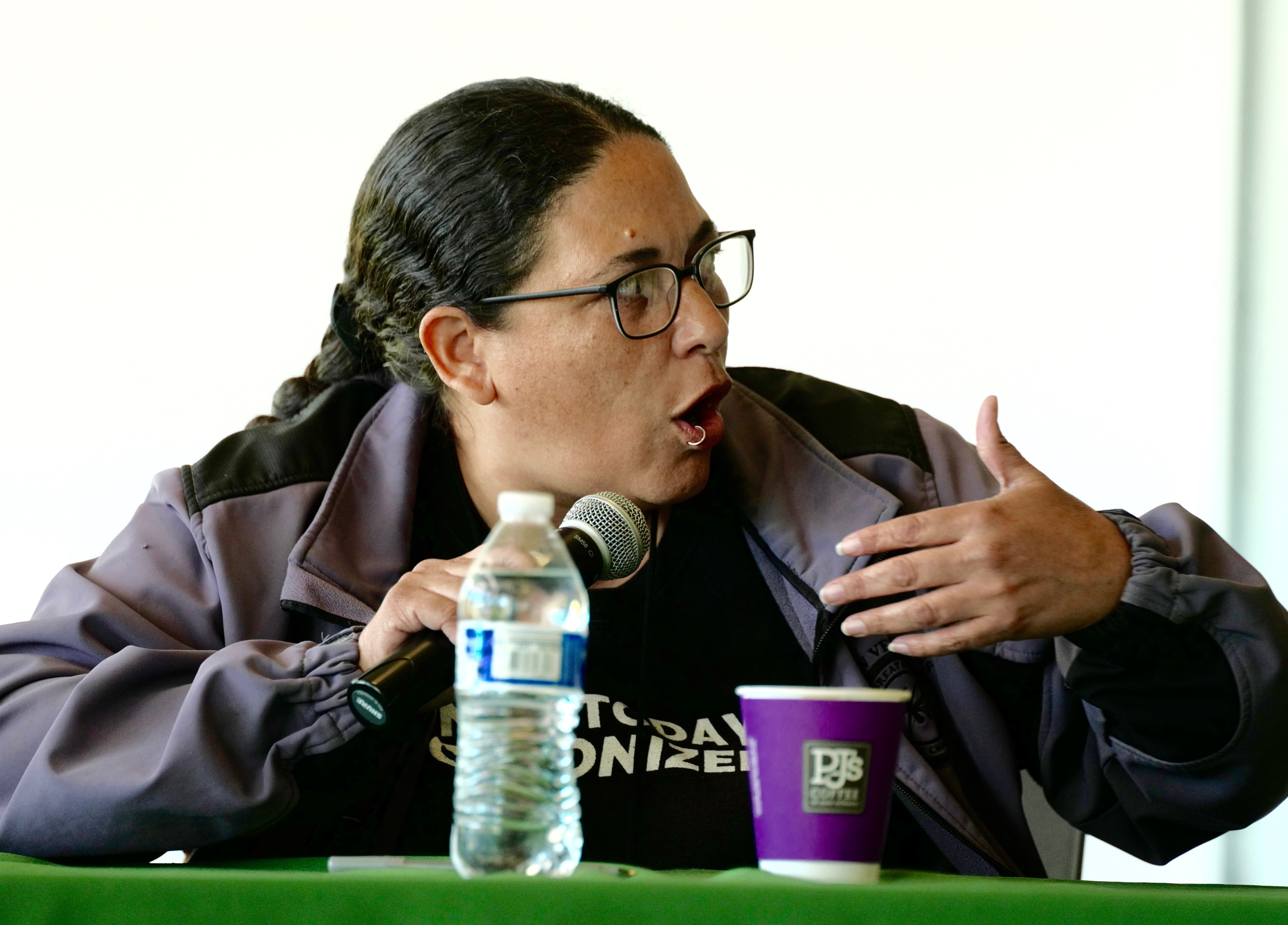
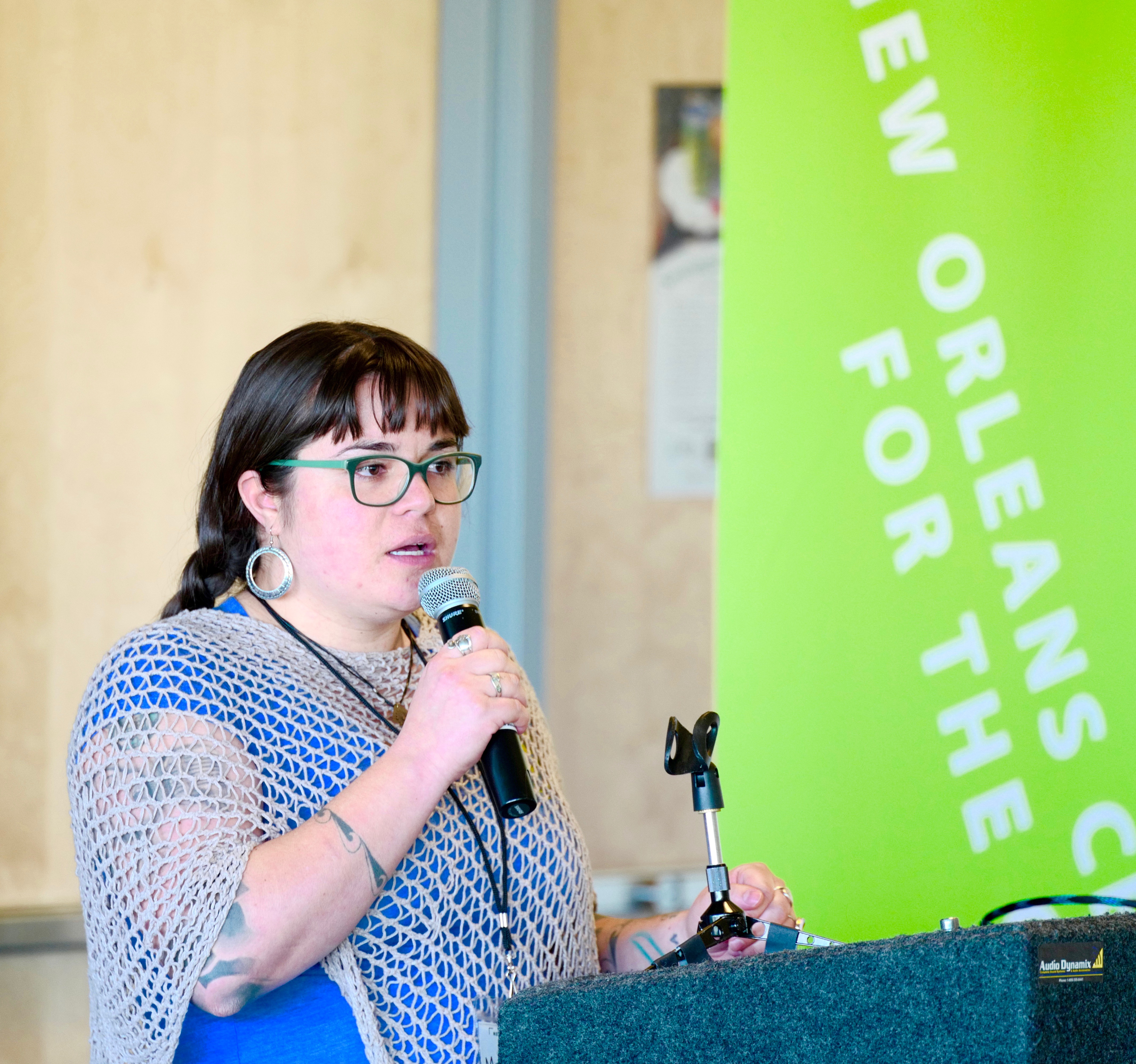
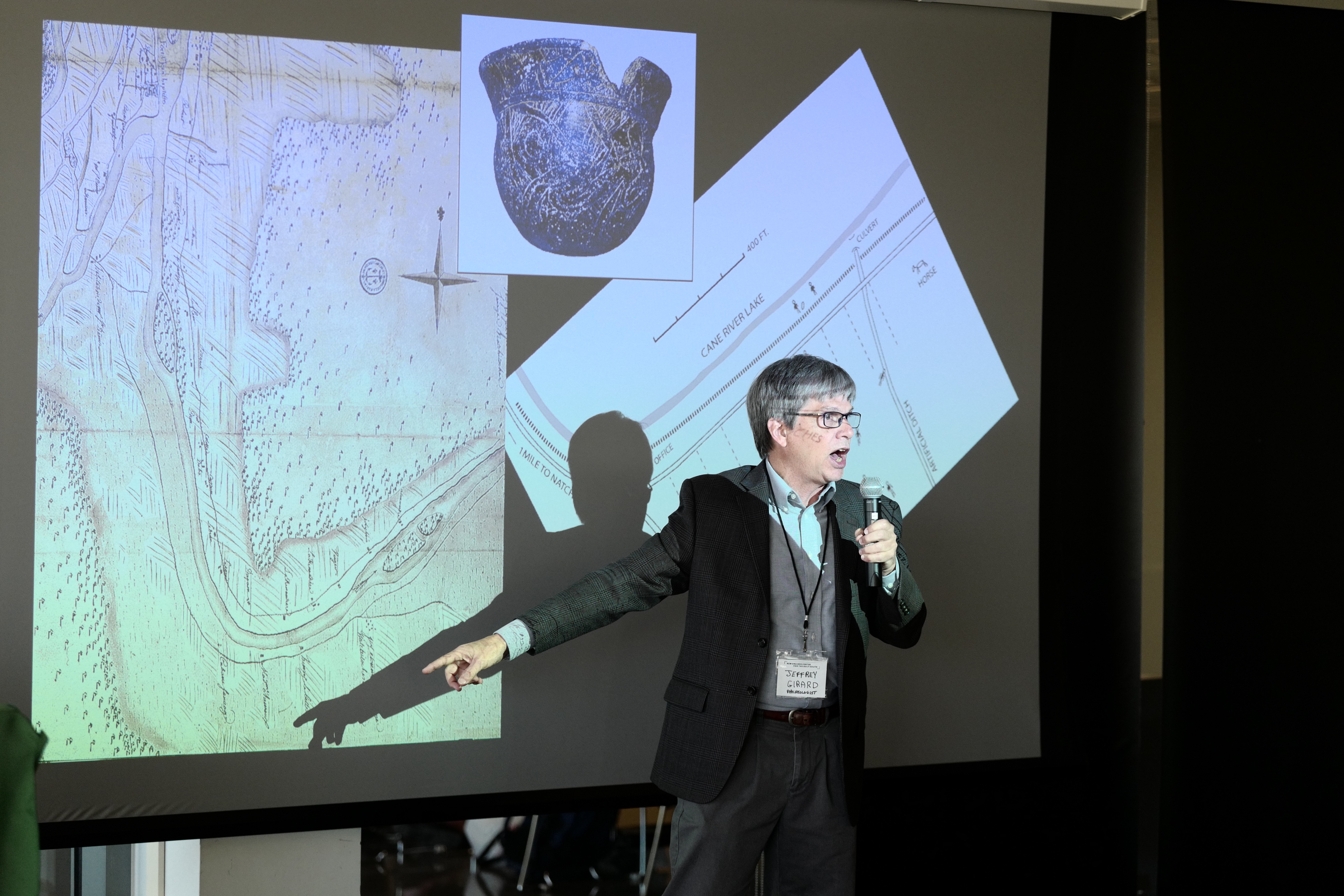
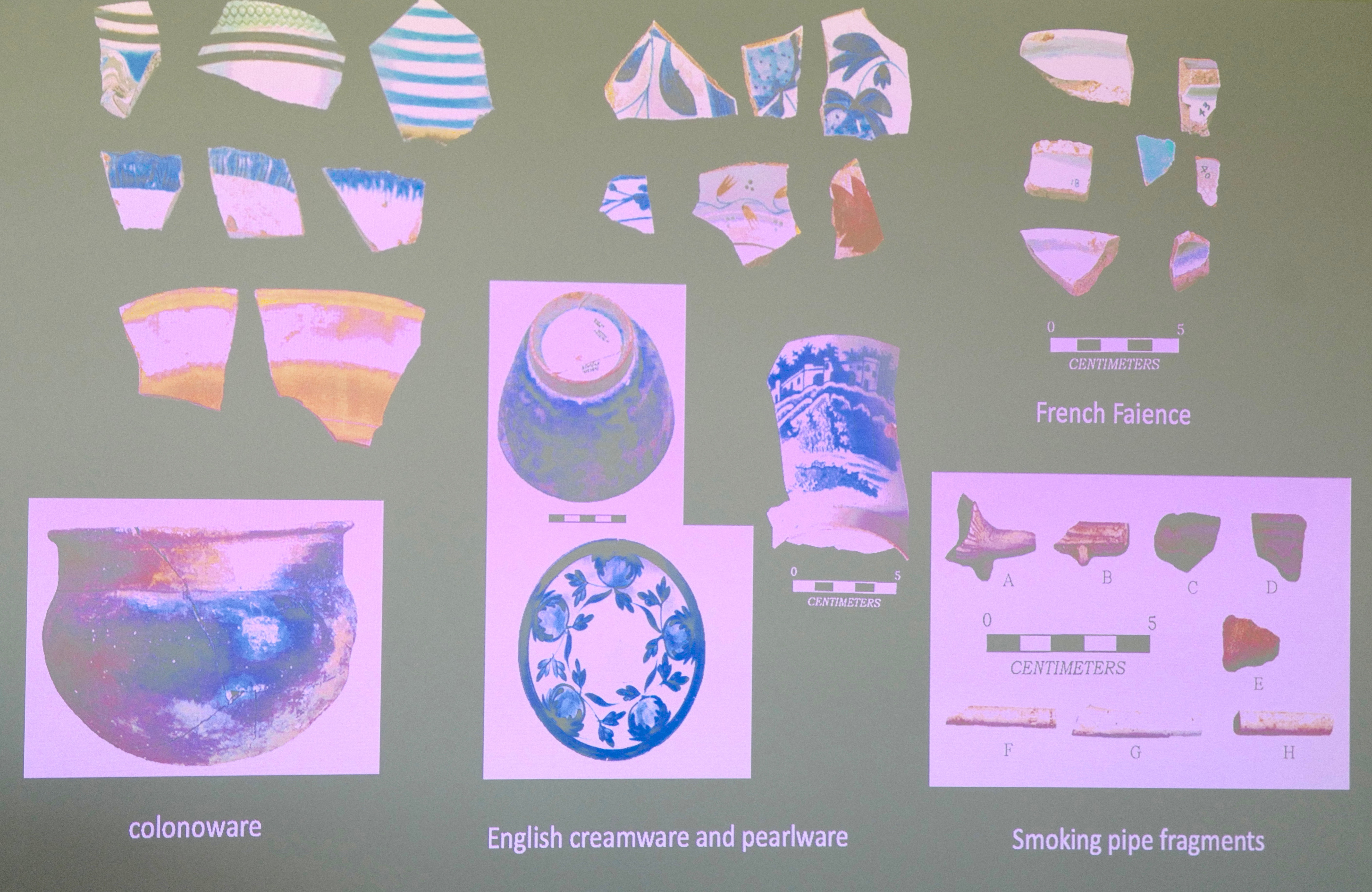
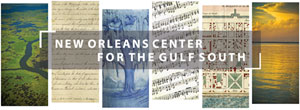

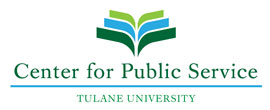


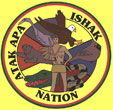
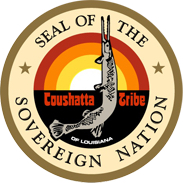
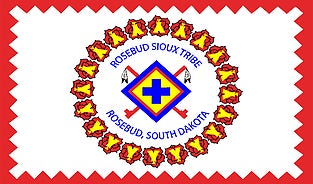
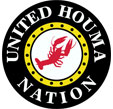

![Diné [aka Navajo]](/wp-content/uploads/sites/49/2019/02/Great_Seal_of_the_Navajo_Nation-300x240.jpg)
